

How to Write a Tourism Business Plan
by Bryan | Jul 10, 2023 | Destination Marketing

Starting a tourism business can be an exciting venture, but it’s vital to have a solid business plan in place. Your business plan will serve as a blueprint for your business, outlining your goals, strategies, and financial projections. Here’s a step-by-step guide on how to write a tourism business plan.
Step 1: Executive Summary
- Start with an executive summary, which provides a snapshot of your business.
- It should include your business name, location, and a brief description of the services you offer.
- This section should also highlight your unique selling proposition – what sets your tourism business apart from the competition.

Step 2: Business Description
- Provide detailed information about your tourism business.
- Describe your target market, the types of tours or services you’ll offer, and your business structure (e.g., sole proprietorship, partnership, corporation).
- Also, discuss any partnerships with local businesses or organizations that will enhance your offerings.
Next up is the market analysis.
Step 3: Market Analysis
- This section requires research into the tourism industry in your area.
- Identify your competitors and analyze their strengths and weaknesses.
- Understand your target customers – their preferences, behaviors, and what they value in a tourism experience.
After understanding your market, it’s time to outline your organization and management structure.
Step 4: Organization and Management
Outline your team structure..
- Include the roles and responsibilities of each team member, and provide brief bios if possible.
- If you’re a sole proprietor, describe any outsourced roles (like accounting or marketing).

Step 5: Services or Products
- Detail the services or products your tourism business will offer.
- Whether you’re offering guided tours, travel planning, or other tourism-related services, make sure to describe each offering clearly.
- Explain the benefits of your services and how they meet the needs of your target market.
Finally, let’s talk numbers in your financial projections.
Step 6: Financial Projections
- This section should provide a clear picture of your business’s financial outlook.
- Include sales and revenue projections, a budget, a break-even analysis, and a projection of your cash flow.
- These figures will be crucial when seeking funding or investment for your tourism business.

Why do I need a business plan for my tourism business? A business plan helps you understand your business better, assists in securing funding, and serves as a roadmap for your business’s growth. A company overview is important in the travel and tourism industry. How long should my business plan be? The length of a business plan can vary significantly depending on the size and complexity of the business. However, typically, a business plan ranges from 20 to 50 pages. Who should write the business plan? As the successful business owner, you are the best person to write the business plan. However, you can also hire a professional business plan writer or use business plan software. How often should I update my business plan? It’s a good idea to update your business plan at least once a year or whenever significant changes occur in your business or industry. What if I’m starting a small tourism business and don’t have a team yet? That’s perfectly fine. In your organization and management section, simply focus on your role and any outsourced functions. Do I need to include all these sections in my business plan? Yes, each section plays a critical role in providing a comprehensive view of your business. However, the depth of detail in each section can vary based on your specific business. Can I use my business plan to secure funding? Absolutely. Investors and lenders will often request to see a business plan to understand the viability and potential of your business. A well-crafted business plan is crucial for the success of your tourism business. By following this guide, you’ll be well on your way to creating a comprehensive and effective business plan.
Best Practices when Writing a Tourism Business Plan Template
Writing a business plan for a tourism business involves several best practices that can increase the likelihood of your venture’s success. Here are some key points to consider:
1. Be Clear About Your Business Idea:
- Define your tourism business concept clearly.
- Specify the type of services you will provide, such as guided tours, travel planning, or accommodation booking.
2. Conduct Thorough Market Analysis:
- Identify your target audience and understand their needs and preferences.
- Analyze your competitors, their offerings, strengths, and weaknesses.
3. Create a Unique Selling Proposition (USP):
- Determine what sets your tourism business apart from competitors.
- Your USP could be unique tour packages, superior customer service, or partnerships with local businesses.
4. Detail Your Marketing Strategy:
- Develop a marketing and sales strategy to attract and retain customers.
- This could involve online advertising, social media promotion, collaborations with local businesses, or special offers for repeat customers.
5. Plan Your Operations:
- Outline how your business will operate on a day-to-day basis.
- Include details about logistics, staff requirements, equipment needed, and any regulatory compliance issues.
6. Develop a Financial Plan:
- Prepare a detailed financial plan, including revenue projections, budget, and break-even analysis.
- This section is crucial if you’re seeking investment or loans.
7. Review and Revise Regularly:
- A business plan should not be a static document. Review and update it regularly to keep it aligned with your current business situation and future goals.
Remember, your business plan is not just a document for potential investors or lenders; it’s also a roadmap for your business, guiding your decisions and strategies. By adhering to these best practices, you can create a robust business plan that sets your tourism business up for success.
- Company Updates
- Customer Spotlight
- Destination Marketing
- Digital Signage
- Employee Engagement
- Internal Communications
- New Features
- Newsletters
- Product Updates
- Touch Kiosks
- Visitor Information
Recent Posts
How hootboard can improve your community communication strategy, how information kiosks are revolutionizing customer experience in retail, product release update: simplified onboarding for hootboard kiosk users.
- Boosting Partner Profitability with HootBoard’s Innovative Features
- Product Update: Revolutionizing Memories with Our Selfie Print Feature
- Knowledge Base
- Setup a Demo
- Privacy Policy
- Terms of Use
Related Posts

by Mannat | Destination Marketing
Effective communication is the foundation of any thriving community, yet it often presents challenges in today’s...

The retail landscape has evolved drastically, and information kiosks are at the forefront of this transformation. By...

At HootBoard, we constantly strive to make your experience smoother and more intuitive. That’s why we’re excited to introduce our Enhanced Onboarding Experience—a streamlined way for administrators to get up and running with their kiosks quickly and efficiently.
Thank you! Your Download Should Begin Automatically.
Email Address
Organisation
Phone Number
Industry Industry Travel & Tourism Smart City Education Workplaces Industry Agnostic Others
- Sample Business Plans
- Transportation, Logistics & Travel
Tour Operator Business Plan

Are you a travel enthusiast making itineraries for your friends & families? Well, if yes, then you are going to be an excellent tour operator. But for a successful business out of a hobby, a proper plan is needed.
Need help writing a business plan for your tour operator business? You’re at the right place. Our tour operator business plan template will help you get started.

Free Business Plan Template
Download our free tour operator business plan template now and pave the way to success. Let’s turn your vision into an actionable strategy!
- Fill in the blanks – Outline
- Financial Tables
How to Write A Tour Operator Business Plan?
Writing a tour operator business plan is a crucial step toward the success of your business. Here are the key steps to consider when writing a business plan:
1. Executive Summary
An executive summary is the first section planned to offer an overview of the entire business plan. However, it is written after the entire business plan is ready and summarizes each section of your plan.
Here are a few key components to include in your executive summary:
- Market Opportunity: Summarize your market research, including market size, growth potential, and marketing trends. Highlight the opportunities in the market and how your business will fit in to fill the gap.
- Marketing & Sales Strategies: Outline your sales and marketing strategies—what marketing platforms you use, how you plan on acquiring customers, etc.
- Financial Highlights: Briefly summarize your financial projections for the initial years of business operations. Include any capital or investment requirements, associated startup costs, projected revenues, and profit forecasts.
- Call to Action: Summarize your executive summary section with a clear CTA, for example, inviting angel investors to discuss the potential business investment.
Ensure your executive summary is clear, concise, easy to understand, and jargon-free.
Say goodbye to boring templates
Build your business plan faster and easier with AI
Plans starting from $7/month

2. Business Overview
The business overview section of your business plan offers detailed information about your company. The details you add will depend on how important they are to your business. Yet, business name, location, business history, and future goals are some of the foundational elements you must consider adding to this section:
Describe what kind of tour operator company you run and the name of it. You may specialize in one of the following tour operator businesses:
- Inbound operators
- Outbound operators
- Domestic operators
- Adventure tour operators
- Group tour operators
- Luxury tour operators
- Online travel agencies
- Describe the legal structure of your tour operator company, whether it is a sole proprietorship, LLC, partnership, or others.
- Explain where your business is located and why you selected the place.
- Owners: List the names of your tour operator business’s founders or owners. Describe what shares they own and their responsibilities for efficiently managing the business.
- Mission Statement: Summarize your business’ objective, core principles, and values in your mission statement. This statement needs to be memorable, clear, and brief.
- Future Goals: It’s crucial to convey your aspirations and vision. Mention your short-term and long-term goals; they can be specific targets for revenue, market share, or expanding your services.
This section should provide a thorough understanding of your business, its history, and its future plans. Keep this section engaging, precise, and to the point.
3. Market Analysis
The market analysis section of your business plan should offer a thorough understanding of the industry with the target market, competitors, and growth opportunities. You should include the following components in this section.
- Competitive Analysis: Identify and analyze your direct and indirect competitors. Identify their strengths and weaknesses, and describe what differentiates your tour operator services from them. Point out how you have a competitive edge in the market.
- Regulatory Environment: List regulations and licensing requirements that may affect your tour operator company, such as business registration & licensing, transportation regulation, consumer protection laws, employment laws, consumer protection laws, etc.
Here are a few tips for writing the market analysis section of your tour guide business plan:
- Conduct market research, industry reports, and surveys to gather data.
- Provide specific and detailed information whenever possible.
- Illustrate your points with charts and graphs.
- Write your business plan keeping your target audience in mind.
4. Products And Services
The product and services section should describe the specific services and products that will be offered to customers. To write this section should include the following:
- Itinerary planning
- Accommodation booking
- Guided tours
- Activities & excursions
- Travel documentation & visa assistance
- Travel Insurance
- Destination management services
- Additional Services: Mention if your tour operator company offers any additional services. You may include services like visa assistance, travel insurance, local transportation, etc.
In short, this section of your tour operator plan must be informative, precise, and client-focused. By providing a clear and compelling description of your offerings, you can help potential investors and readers understand the value of your business.
5. Sales And Marketing Strategies
Writing the sales and marketing strategies section means a list of strategies you will use to attract and retain your clients. Here are some key elements to include in your sales & marketing plan:
- Pricing Strategy: Describe your pricing strategy—how you plan to price your services and stay competitive in the local market. You can mention any discounts you plan on offering to attract new customers.
- Marketing Strategies: Discuss your marketing strategies to market your services. You may include some of these marketing strategies in your business plan—social media marketing, Google ads, email marketing, content marketing, and print marketing.
- Sales Strategies: Outline the strategies you’ll implement to maximize your sales. Your sales strategies may include direct sales calls, partnering with other businesses, offering referral programs, etc.
- Customer Retention: Describe your customer retention strategies and how you plan to execute them. For instance, introducing loyalty programs, discounts & offers, personalized service, etc.
Overall, this section of your tour company business plan should focus on customer acquisition and retention.
Have a specific, realistic, and data-driven approach while planning sales and marketing strategies for your tour operator business, and be prepared to adapt or make strategic changes in your strategies based on feedback and results.
6. Operations Plan
The operations plan section of your business plan should outline the processes and procedures involved in your business operations, such as staffing requirements and operational processes. Here are a few components to add to your operations plan:
- Staffing & Training: Mention your business’s staffing requirements, including the number of employees or other staff needed. Include their qualifications, the training required, and the duties they will perform.
- Operational Process: Outline the processes and procedures you will use to run your tour operator business. Your operational processes may include tour planning & development, marketing & sales, reservation & booking management, operations & logistics, etc.
Adding these components to your operations plan will help you lay out your business operations, which will eventually help you manage your business effectively.
7. Management Team
The management team section provides an overview of your tour operator business’s management team. This section should provide a detailed description of each manager’s experience and qualifications, as well as their responsibilities and roles.
- Founders/CEO: Mention the founders and CEO of your tour operator company, and describe their roles and responsibilities in successfully running the business.
This section should describe the key personnel for your tour operator services, highlighting how you have the perfect team to succeed.
8. Financial Plan
Your financial plan section should provide a summary of your business’s financial projections for the first few years. Here are some key elements to include in your financial plan:
- Profit & loss statement: Describe details such as projected revenue, operational costs, and service costs in your projected profit and loss statement . Make sure to include your business’s expected net profit or loss.
- Cash flow statement: The cash flow for the first few years of your operation should be estimated and described in this section. This may include billing invoices, payment receipts, loan payments, and any other cash flow statements.
- Balance Sheet: Create a projected balance sheet documenting your tour operator business’s assets, liabilities, and equity.
- Financing Needs: Calculate costs associated with starting a tour operator business, and estimate your financing needs and how much capital you need to raise to operate your business. Be specific about your short-term and long-term financing requirements, such as investment capital or loans.
Be realistic with your financial projections, and make sure you offer relevant information and evidence to support your estimates.
9. Appendix
The appendix section of your plan should include any additional information supporting your business plan’s main content, such as market research, legal documentation, financial statements, and other relevant information.
- Add a table of contents for the appendix section to help readers easily find specific information or sections.
- In addition to your financial statements, provide additional financial documents like tax returns, a list of assets within the business, credit history, and more. These statements must be the latest and offer financial projections for at least the first three or five years of business operations.
- Provide data derived from market research, including stats about the industry, user demographics, and industry trends.
- Include any legal documents such as permits, licenses, and contracts.
- Include any additional documentation related to your business plan, such as product brochures, marketing materials, operational procedures, etc.
Use clear headings and labels for each section of the appendix so that readers can easily find the necessary information.
Remember, the appendix section of your tour operator business plan should only include relevant and important information supporting your plan’s main content.
The Quickest Way to turn a Business Idea into a Business Plan
Fill-in-the-blanks and automatic financials make it easy.
This sample tour operator business plan will provide an idea for writing a successful tour operator plan, including all the essential components of your business.
After this, if you still need clarification about writing an investment-ready business plan to impress your audience, download our tour operator business plan pdf .
Related Posts
Travel Agency Business Plan
RV Park Business Plan
Steps to Writing Business Plan
Best AI tools for Startup
10 Essential Components of a Business Plan
Business Plan Cover Page Guide
Frequently Asked Questions
Why do you need a tour operator business plan.
A business plan is an essential tool for anyone looking to start or run a successful tour operator business. It helps to get clarity in your business, secures funding, and identifies potential challenges while starting and growing your business.
Overall, a well-written plan can help you make informed decisions, which can contribute to the long-term success of your tour operator company.
How to get funding for your tour operator business?
There are several ways to get funding for your tour operator business, but self-funding is one of the most efficient and speedy funding options. Other options for funding are:
- Bank loan – You may apply for a loan in government or private banks.
- Small Business Administration (SBA) loan – SBA loans and schemes are available at affordable interest rates, so check the eligibility criteria before applying for it.
- Crowdfunding – The process of supporting a project or business by getting a lot of people to invest in your business, usually online.
- Angel investors – Getting funds from angel investors is one of the most sought startup options.
Apart from all these options, there are small business grants available, check for the same in your location and you can apply for it.
Where to find business plan writers for your tour operator business?
There are many business plan writers available, but no one knows your business and ideas better than you, so we recommend you write your tour operator business plan and outline your vision as you have in your mind.
What is the easiest way to write your tour operator business plan?
A lot of research is necessary for writing a business plan, but you can write your plan most efficiently with the help of any tour operator business plan example and edit it as per your need. You can also quickly finish your plan in just a few hours or less with the help of our business plan software .
How do I write a good market analysis in a tour operator business plan?
Market analysis is one of the key components of your business plan that requires deep research and a thorough understanding of your industry. We can categorize the process of writing a good market analysis section into the following steps:
- Stating the objective of your market analysis—e.g., investor funding.
- Industry study—market size, growth potential, market trends, etc.
- Identifying target market—based on user behavior and demographics.
- Analyzing direct and indirect competitors.
- Calculating market share—understanding TAM, SAM, and SOM.
- Knowing regulations and restrictions
- Organizing data and writing the first draft.
Writing a marketing analysis section can be overwhelming, but using ChatGPT for market research can make things easier.
About the Author
Upmetrics Team
Upmetrics is the #1 business planning software that helps entrepreneurs and business owners create investment-ready business plans using AI. We regularly share business planning insights on our blog. Check out the Upmetrics blog for such interesting reads. Read more

Turn your business idea into a solid business plan
Explore Plan Builder
Plan your business in the shortest time possible
No Risk – Cancel at Any Time – 15 Day Money Back Guarantee

Create a great Business Plan with great price.
- 400+ Business plan templates & examples
- AI Assistance & step by step guidance
- 4.8 Star rating on Trustpilot
Streamline your business planning process with Upmetrics .

Your Passport to Success: A Comprehensive Guide to Launching a Tourism Business
- Published: July 13, 2023
- By: Yellowbrick
Spotting the Opportunity
Carving your unique niche, constructing a comprehensive business plan, arranging the financial framework, jumping through legal hoops, crafting a magnetic brand, building a strong online presence, launching and marketing your venture, splash your unique colors onto the vast canvas of the tourism industry.
Enter your email to learn more and get a full course catalog!
- Hidden hide names
- Hidden First Name
- Hidden Last Name
More from Yellowbrick

Top 5 Video Streaming Challenges: How to Overcome Them
Explore video streaming challenges and strategies to overcome them, from bandwidth limitations to DRM issues. Dive into the dynamism of the video streaming industry.

10 Steps to Launch Your News Producer Career Successfully
Discover the key steps to launch a successful news producer career. Explore skills acquisition, degree relevance, internships, networking, and staying updated.

Mastering the Art of Tour Coordination: Skills, Duties & Path to Success
Discover the steps to kick-start your career as a Tour Coordinator. Learn about the key responsibilities, required skills, and necessary steps to excel in this role.
ABOUT YELLOWBRICK
- Work at Yellowbrick
- Privacy Policy
- Terms of Use
STUDENT RESOURCES
- Scholarships
- Student Login
- Beauty Business Essentials
- Beauty Industry Essentials
- Ecommerce Essentials
- Fashion Business Essentials
- Fashion Industry Essentials
- Footwear Business Essentials
- Gaming & Esports Industry Essentials
- Global Sports Management
- Hospitality Industry Essentials
- Music Industry Essentials
- Performing Arts Industry Essentials
- Product Design Essentials
- Sneaker Essentials
- Streetwear Essentials
- TV/Film Industry Essentials
- UX Design Essentials

Parsons faculty, together with design experts from leading organizations, help you build knowledge and skills, explore key trends shaping the future of product design, and gain an understanding of how design, manufacturing, and marketing components work together within the product creation process.
Enter your email to get a free sneak peek, course catalog, and career guide.
Brittany Markle Choreographer/Mentor/Dancer I think my most rewarding experiences have included the success of former students. I take pride in making sure they have the necessary tools to move forward with a career in the entertainment industry and I hope to help them bridge that gap from amateur to professional.

Briah Fowler Marketing and Sales Specialist, New York Giants What's success if you can't share your winnings? As a marketing specialist for the New York Giants, I learned the key to success is giving back. If you can utilize your skill set and talent to help give back to your community, it's one of the most rewarding accomplishments.

Bill Carroll Production Director, Centennial Broadcasting I'm most proud of taking the courage to start a music foundation and help musicians with any kind of disability and who are on the spectrum. It's something close to me and very important to nourish.
Bethany caldwell custom stylist & merchandiser - sales, threadwell clothiers, under armour inc. i am a custom clothier who helps people create custom clothing to look & feel their best -- i like to create quality clothes with meaning -- and i pride myself in making the "experience" part of the process..

Becca Brown NFTs & Collectibles Project Manager, Warner Bros Discovery I'm honored to work with an innovative team where I'm involved in bringing world-renowned brands like DC and Harry Potter to life through cutting-edge collectibles. Seeing our fans engage with our products is incredibly fulfilling and fuels my excitement to continue driving innovation and growth in the licensing space.

B. Danielle Watkins Chief Programmer, iElevate Media Group Writing is my passion, creating is my heart, and telling stories gives me an escape I've never found anywhere else, so to be doing that for the masses is what success looks like for me.

Anissa Lee Product Marketing Manager, Google I’m most proud of launching the 10th annual Google Economic Impact Report and leading its entire end-to-end production... The most meaningful part of this experience was getting the chance to highlight the stories of these incredible and diverse businesses, the majority of which were veteran, female, and BIPOC-run.

Adrian Cantu CEO, CANTUSTUDIO Every day a new proposition arises, as a friend, as a designer, as a co-worker, and as a leader. I like to interpret any challenge as an opportunity that demands better exploration. I personally think you shouldn't live life by treating discouragements and setbacks as a negative force in your way. I think a positive and disciplined mentality helps you find interesting aspects of a "stuck-up" and tackle them as a new adventure.

Fashion Institute of Technology (FIT) faculty, alongside experts from Beauty Inc and leading entrepreneurs and beauty companies, help you learn industry practices on how to successfully take a beauty product to market. Lessons include understanding the beauty business landscape, developing a beauty product, formulation, packaging, and branding principles.
Explore all areas of the hospitality and tourism industry with this new 100% online program from New York University (NYU), featuring leaders from across the hospitality, tourism, and travel world.
Parsons faculty, together with entrepreneurs, industry experts and specialists from Printful and Shopify, uncover how to design a seamless, ecommerce enterprise. Lessons range from creating a marketing strategy, building a digital brand, designing a customer journey, optimizing SEO tools and paid media, utilizing data and KPI reporting, understanding distribution and logistics, and more.
Learn how beauty products are developed, packaged and marketed. Understand what it’s really like to be a boss beauty entrepreneur and how to be a successful beauty influencer through this cutting edge online certificate program from FIT, featuring Allure editors and top beauty professionals from across the globe.
Parsons faculty, together with design experts from Creative Bloq and across the industry, explore the critical stages of the UX journey with lessons covering a range of topics from usability research methods, design concepting, and wireframing, to the latest technologies shaping the future of modern user interface design.
Chanel Benjamin Founder, They Love My Splash LLC and Communications & PR Director, G.R.A.C.E. Inc. I am most proud of being named the Community Hero at Yankee Stadium because it was to highlight the iSmileForAngele Scholarship I created in honor of my late grandmother. It also highlighted my iniative #KickBackAgainstBullying Sneaker Drive and the proceeds go to local shelters.

Leaders from across the gaming and esports world, together with faculty from Fashion Institute of Technology (FIT), will teach you about the key areas, and related career opportunities in the rapidly changing gaming industry.
Explore all areas of the performing arts industry with this new 100% online program from faculty at New York University (NYU), and featuring experts from Backstage and leaders from across the industry.
Fashion Institute of Technology (FIT) faculty, alongside experts from WWD and across the industry, help aspiring fashion stylists learn the skills needed to break into the fashion world.
Fashion Institute of Technology (FIT) faculty, together with insiders and experts from Footwear News and other leading brands, help you learn how to build a successful footwear company.
Fashion Institute of Design & Merchandising (FIDM) faculty, alongside experts from WWD and the fashion industry, help aspiring fashion designers learn the skills needed to begin designing a fashion collection.
Parsons School of Design faculty, together with leaders from across the fashion world, will teach you about the key areas, and related career opportunities in the ever-evolving fashion industry.
New York University (NYU) faculty, alongside leading journalists from Rolling Stone and other news organizations, help you learn the industry practices and fundamental skills needed to produce news stories across audio, visual, and digital mediums.
Explore all areas of the film and television industry with this new 100% online program from faculty at New York University (NYU), and featuring experts from IndieWire and Rolling Stone, and leaders from across the industry.
New York University faculty, together with business leaders from across the sports world, will teach about emerging trends, and related career opportunities in the ever-evolving business of global sports and marketing.
Fashion Institute of Technology faculty, together with leaders from Complex and across the sneaker world, will teach you about the key areas, and related career opportunities in the ever-evolving sneaker industry.
Parsons School of Fashion faculty, together with insiders and experts from leading brands, help you learn the business side of fashion, explore key trends shaping the future of the industry, and gain an understanding of how fashion brands are built and launched.
Explore all aspects of the streetwear industry, discover related careers, and build your skills with this online program from Parsons School of Design and Complex, featuring many recognized leaders from across the streetwear world.
Explore all areas of the music industry with this 100% online program from faculty at New York University’s Clive Davis Institute of Recorded Music, featuring experts from Billboard, and leaders from across the industry.
Casey Butler Creative Activation Manager, Roku The industry is constantly changing and evolving. This is part of the excitement of the job, but it can also be very difficult to navigate. Persistence and dedication are some of the most important traits for success in this industry - you need to want to be there and willing to put in the work.

Daniel Bouwhuis Marketing/Brand Manager, Warner Music I believe that my success is not just about achieving a high-status job title, but rather it's about the impact I can make in the lives of others through music. I want to... continue to contribute to creative projects that raise awareness for important issues such as mental health and women's and LGBTQ+ rights.

Wendy Xie Producer - CN Ad Studio, Conde Nast As a Producer, I aspire to produce slice of life ads to increase visibility for ubiquitous or unsung brands founded by people of color and further overcome the bamboo ceiling that so many Asians continue to face in the creative industry. When there is a day where my original ad ideas are broadcasted in the real world, this is when I believe my voice is heard, my impact is valued and appreciated by peers, and that our society is progressively evolving the advertising, media and tech industry to be a more inclusive space for rising creatives of color.

Mehruba Haque Junior Research Fellow, Estonian Business School Women's insecurities have been used for decades to sell beauty products, which have been linked to eating disorders, anxiety, and depression... I would like to come up with a new way to market beauty products that emphasizes that feeling beautiful doesn't come from comparing yourself to other women. I want to be a key player in making these positive changes happen and making the world a better place for women.

Timothy Clarke Mixshow DJ/Personality, Radio One/Urban One, Sirius XM I want to be able to help upcoming artists be heard and seen on a global level, and be known as one of the biggest DJs turned A&R in hip-hop culture.
Tiana brown director of broadcasting & production, university of pennsylvania game day broadcast staff, philadelphia eagles my biggest advice is that if no one wants to open the door for you, kick it off the hinges. most of the opportunities that i have been afforded thus far have come from creating my own and giving opportunities to other people. creating your own opportunities can take a lot of sacrifice, a lot of lost sleep, a lot of fun missed, but in the end it will all be worth it when you wake up every morning living out your dreams..

Stefani Marie Clare Janelli Founder, The MIC & Artist Development Specialist (13 Seconds Music) Have tough skin, but be open to learning and adapting! This industry is constantly changing overnight, and adapting to however the wind blows is vital. It's also essential to have the willingness to learn. Being open to learning a new way to do something, or to listen to a new idea, even when it's not your own, is advice anyone at any age could benefit from!

Shelby Gussman Senior Director, Social Fisch I define success as achieving my goals, assisting my team with achieving theirs, and then setting the bar higher and accomplishing more than before all while being able to enjoy life! I hope to have the opportunity to work in different global markets, travel, collaborate with new people, and continue to be challenged and learn.

Sharrod Williams Actor, Writer, Producer - Neighbors, Hamilton, Moulin Rouge! The Musical There are no small parts. None. I have been fortunate enough to wear many different hats, big and small, on different projects. But like any machine, organization, or even the human body - each role I take on is in service of the one greater purpose, to tell a story. The hat i've worn the most is "actor". In this role, I am the vessel that conveys the humanity and experience of what each character I play is going through in the story being told. My goal is make the audience feel, relate, and or think about the aspect of life that is being reflected or challenged in the story.

Shady Elsayed Guest Services, ASM Barclays Center Whether it’s through celebrity appearances, brand and apparel collaborations, sponsorships, in-arena entertainment, or business partnerships, being a part of this industry is a rewarding experience. With it’s fast paced nature, and event based daily routine tasks, the sports and entertainment industry is built on networking and creating long lasting relationships.

Sabrina Assistant Project Manager, Dirt Rock Empire For me, success means continuing to learn and grow everyday. Next, I hope to become an even bigger voice in the industry and help encourage positive change.

Rebecca O’Keeffe Content Partnerships Manager, TikTok My role is Content Partnerships Manager for TikTok Ireland. I work with creators, media partners and public figures to enhance the content ecosystem to ensure the best user experience for the people of Ireland. This includes content projects with Ireland's biggest creators and public figures, exciting hyperlocal tentpole projects and events, in-app campaigns for things like Black History Month and Pride.

Rebecca Lu Business Development, Joes Footwear The biggest challenge is you never know when you will be challenged - they just pop out somehow, even you think you are doing the best. So don’t take challenge as monster, always be positive and do whatever you can.

Pavlina Koleva UX/UI Designer, Pixum To be a designer means you give people better experience, you help people and you try to see things through their eyes. Creating flexible products even for people with disabilities is great achievement. Design was and always will be part of people's life.

Natalie Turturro Mettouchi Costume Designer, IATSE Local 829 I am most proud of designing the costumes for a short film that premiered at the Tribeca Film Festival in 2021, called "Esther in Wonderland." I had a shoestring budget and was working on two other pretty huge projects simultaneously, but still managed to design creative outfits that allowed the dancers to move freely and help develop their characters.

Meosha Enslow Seamstress, Cintas uniform company As a designer I pride myself on originality and creativity... The problem comes when I sit down to plan I begin to doubt myself and my capabilities...To avoid the setbacks filled with self doubt I think of the end result and how it always makes me feel so empowered and shuts the weak voice in my head saying I can’t do it.

Matt Popper Music Touring/Business Affairs, United Talent Agency Be relentless - the most difficult part of the job is getting your foot in the door. Once you're in, your good work will speak for itself. Of course, there will be some days where you will feel defeated and want to give up, but if this is what you're meant to do, you'll find a way to make it happen.

Deyonte Fashion Designer, DWC Project Runway Season 16 Contestant Everyone has challenges and obstacles they face in the industry. It's what you do with those minor situations that help you become better if you allow it. You have to fight for your vision and be relentless.

Mathilde Garnier Product Manager Footwear, adidas AG To me, success is passion. I strongly believe you can only be sucessful if you truly love what you are doing. Passion is a magic fuel that can inspire and drive people towards their goals... [but] passion is not enough. Our world needs more than for us to just do what we love. In order to be successful, we need to make a difference. I need to make a difference.

Lindsay Milner Sigmund Vice President of Design, Vida Shoes The highlight of my career was becoming a Vice President of Design at a respected industry company at a young age. It showed how all of the hard work I put into my career- including evolving and continuing my education in the field- really put me ahead of the curve.

Leslie Peterson Coordinator - Center of Excellence, NBCUniversal One of the hardest parts of my journey was moving to New York City from a small town and learning how to navigate the corporate world. Everyday I am learning something new and need to be okay with not knowing everything.

Kyle Rebucci Customs Team Trainer, Puma Fashion is a part of everyday life. You don’t have to like trends, brands, or designers to contribute to the giant that is the fashion industry. You can’t escape from it. My contribution will of course directly relate to fashion, but I hope to be part of some reform in the industry when it comes to sustainability and ethics.

KeNisha Ruff Founder, Marie Hunter Beauty Less than 1% of luxury beauty founders are black. I am laying the groundwork for black founders to enter the prestige sector and using my company to inspire, break the stigma surrounding mental health, and fight climate change.

Joseph Richert Manager - Corporate Development & Strategy, Universal Music Group Success to me is happiness, both professionally and personally. On the professional side, that means having an impact on helping artists and entrepreneurs bring their dreams to life in an industry I'm passionate about; which I'm lucky to say I'm doing now!

John Paul Endab Physical Education Teacher, Joppa High School As an educator, I truly believe that learning is a continuous process. It give us an opportunity to satisfy our curiosity, pursue our interests, or try new things.

Ilana Duboff Associate Media Director, OMG23 While I am proud of all the amazing films I've been fortunate to work on over the years, I am most proud of the growth I've had while working in this industry. I have been promoted three times in the past four years and now manage a team of people, which I never even thought could be possible when I first started working. I feel honored that I have the opportunity to lead a team as well as teach them and work with them.

Haramritjot Singh Founder, Cash Cow NYC I’m a kid from the Bronx, I’m a first generation American, I’m a Sikh, I’m a father in his thirties, and now I’m the owner of a clothing brand. I serve as a prime example to many different people from so many different circumstances that starting a small business and following your dreams is possible.

Giulia Baldini Fashion Journalist/Editor and Academic Researcher, Lehman College I represent the underrepresented with words. I report stories and narratives that center on the fashion industry, specifically when the protagonists are from the African Diaspora, when they are sustainable businesses, and when they are engaged in minorities' activism.

Forbs West Associate Music Curator, SiriusXM/Pandora I think one of the biggest challenges that I've faced in my journey is patience. I think especially being in Generation Z, it is important to slow down and appreciate what we have accomplished so far. I think when you least expect things, it is a surprise yet it is also very rewarding.
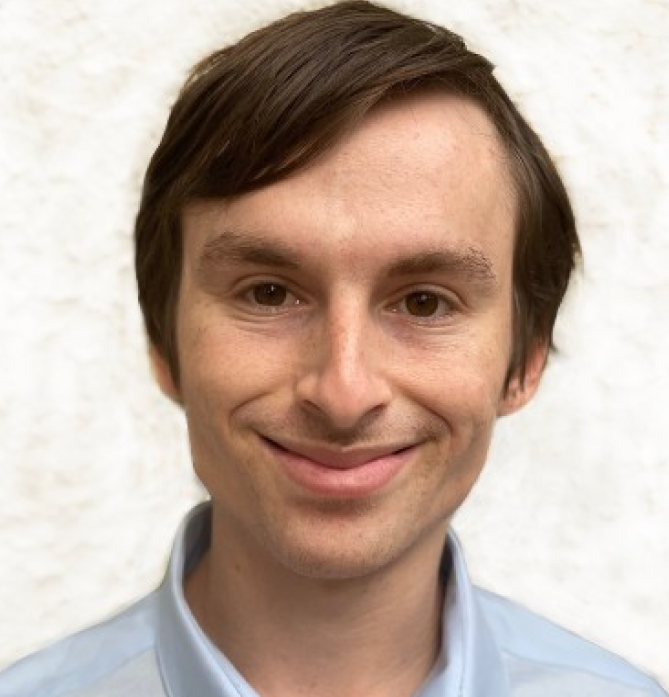
Elena Takmakova Manager - International Production, Universal Music Group The thing that keeps me on track is remembering how far I've come. Just that simple feeling of being proud of myself can make miracles.

Dounesha Scott Product Manager, Anna Griffin Inc. Of my career achievements, I am the most proud of being a uniform fit specialist for the Delta Style Project... Delta only redesigns their uniforms every 5-10 years. The uniforms were designed by Zac Posen and manufactured by Lands End... We are in the Delta museum and will be a part of Delta airlines history.

How to create a tour operator business plan in 8 steps
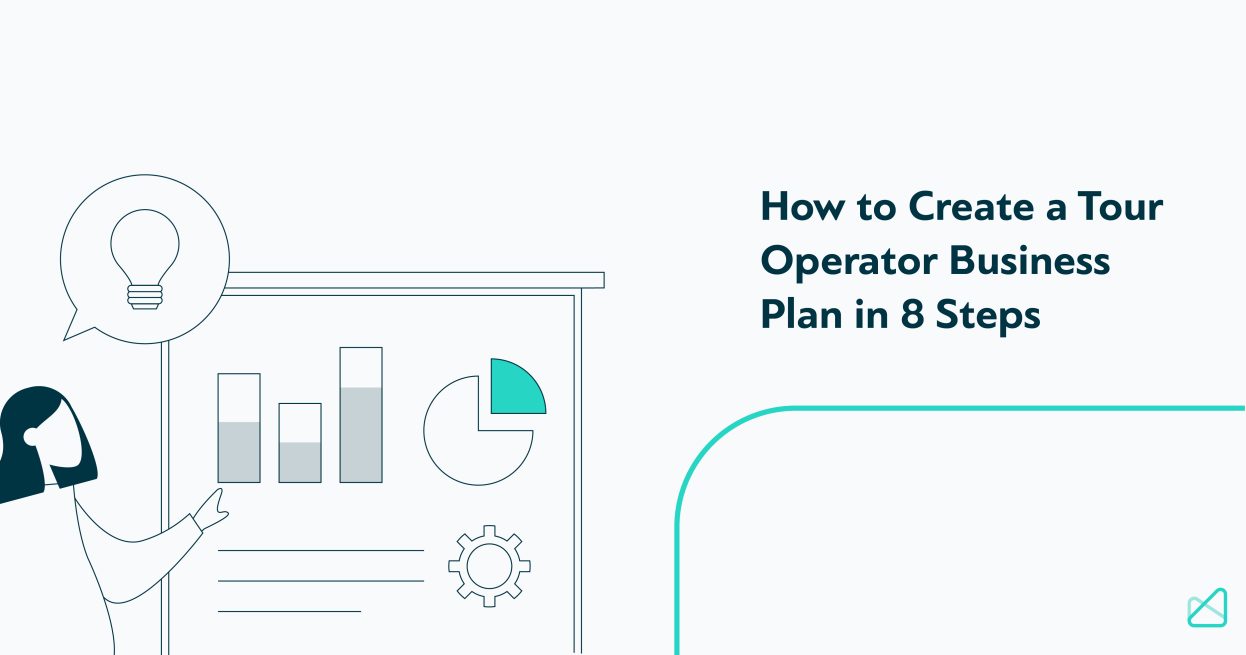
Preparing to Write a Business Plan
Tour operator business plan template, tips and tricks for a strong tour operator business plan.
Wondering how to turn your tour operator idea into a real business? The first step to launching a startup and getting investors onboard is to develop a formal proposal called a business plan . Whether you want to start a travel agency, a walking tour company, or an adventure travel business, you will use a business plan to communicate exactly how you plan to make your idea come to life.
Creating a tourism business plan might sound daunting; in this article, we’ll show you how to do one and offer lots of advice for first-time founders. You’ll be able to use this article as a tour operator business plan template to write your own sample business plan (as an exercise) or to create the real thing.
To more clearly illustrate how to create a tour operator business plan, we’ll use a sample business as we go through each section. Our sample business is a small tour operator startup that specializes in ecotourism in Thailand.
Before you start to create your official business plan, it can be helpful to think through several aspects of your business so that you are fully prepared to address each topic in the business plan template. One excellent preparation exercise is to complete a Business Model Canvas for your company.
The Business Model Canvas encourages you to think critically about your customers, cost structure, revenue streams, marketing strategy, and more. It’s the perfect warm-up for your business plan because you’ll incorporate your Business Model Canvas notes into the actual business plan document. We recommend that you do this exercise with your co-founders, if you have any, and with a whiteboard – you’ll probably make lots of changes as you go!
You can find a printable Business Model Canvas template here .
Your tour operator business plan should contain at least seven sections: an executive summary, a company overview, a description of your services, an analysis of your market, an implementation plan, a team summary, and a financial plan. You might have one or more appendices at the end, if you have additional relevant information to include. The finished product should be formatted nicely and incorporate your company’s logo and branding.
Executive Summary
As the first component of your business plan, the executive summary is arguably the most important section. If you’re pitching your idea to investors, they’re likely very busy people, so you want to grab their attention from the beginning. The executive summary should contain a concise outline of your tour operator company’s objectives and goals, your mission and/or vision statements , your key success factors, and a clear description of your value proposition.
Company Overview
Think of this section as what you would post on the “About” section of your tour operator company’s website. The company overview should explain who your company’s key leaders are, how and when the business started, what the ownership structure looks like (if you have investors, for example), where your office is located, and an outline of your current assets and debts. If you’re in the early stages of your business, this section might be quite short.
Operations Plan
The operations plan is where you describe exactly what your company will offer. What kinds of tours will you sell? Where exactly will you operate? This is the type of information you would list on your website for potential customers or guests to read – but without too much of a sales pitch.
In this section, it can also be helpful to include a description of the full “ life cycle ” of your business. What happens before, during, and after a tour? What steps does the guest complete, and what happens behind the scenes at your company’s office?
Thinking about our Thai ecotourism company, we might illustrate how someone could book a tour perhaps six months in advance on our website. Between booking and arrival, we coordinate accommodation, meals, and transportation with partner providers. When the tour concludes, we offer transportation back to the airport and follow up with a special offer to book another tour with us at a discount.
Market Analysis
This section explores your specific niche within the tourism industry and the geographic location(s) where you plan to operate. Who are your target clients or guests? Who are your main competitors? What trends exist in this facet of the industry? Is the amount of visitors to your location increasing or decreasing?
Try to include statistics from reputable sources whenever you can. Destination marketing organizations, tourism bureaus, and air traffic data, just to name a few, can provide valuable insight and add credibility. This section should leave no stone unturned so that your reader can truly understand your market conditions.
In our ecotourism business in Thailand, for example, we would include information about travel trends in Thailand (like the most popular feeder markets), new air routes, economic trends, the number of new hotels being built, etc. We would also explore the ecotourism market; are more people choosing eco-friendly travel options today compared to five years ago? What companies are the current ecotourism market leaders globally and in Thailand?
Implementation
Now that you’ve explained your business idea and described the market in which you plan to operate, it’s time to outline exactly how you will bring your tour operator business to life. This section should include a SWOT analysis , details about your marketing and pricing strategies, and a sales projection.
In the SWOT analysis , you will explore your company’s strengths, weaknesses, opportunities, and threats. What does your company offer that nobody else in the market does? What are some potential challenges that you will need to face? Using our ecotourism company example, a threat could be natural disasters – if there are floods or mudslides, our business cannot operate. On the other hand, an opportunity is that more people are interested in eco-friendly travel options.
Your marketing and pricing strategies should be very specific. How will customers find your company? Which online channels will you use? Will you work through travel agents or directly with your customers?
Your pricing strategy should include the exact rates you plan to charge for at least a year in advance. For example, our ecotourism company in Thailand might charge $699 for a package during low season, $899 during high season, and $999 over holiday periods, with rates increasing 5% each year.
We might also offer a 10% discount for advance purchase bookings made at least 6 months in advance and charge a 50% cancellation fee for any reservations cancelled within 3 months of the tour departure date. Based on your pricing strategy, you can create a sales projection that will estimate your company’s sales performance, preferably over the next three years.
Team Summary
After your reader understands what your tour operator business will do, they’ll wonder who is going to make it happen. And if you’re planning to launch a full-fledged tour operator business, you’re probably not going at it alone. The Team Summary section should include a thorough plan for your company’s organizational structure, key leaders, employees, and training processes.
Do you already have a management team in place, or will you need to hire additional leaders? How many employees will you need, and how much will you pay them? And how will you train and develop your employees? The Team Summary should answer all of these questions and provide enough information for potential investors to understand exactly how you plan to staff your business, pay your employees, and ensure all team members are trained properly.
Financial Plan
The financial plan is extremely important to potential investors because they will want to maximize the return on their investment. Your financial plan is essentially a projection of your revenue streams and cost structure for your company’s first five or so years of operation. It will include not only revenue from ticket sales and costs from employee salaries, but also details like tour-operator software costs, insurance, taxes, marketing spend, depreciation of assets, interest on loans, and more.
If you don’t have a finance background yourself, it may be helpful to seek assistance from an accountant or someone who knows the ins and outs of financial modeling.
Additional Information
In an appendix, you can include supporting information or statistics that may be helpful for potential investors, but not essential to your business plan. For instance, you could include a full report on air traffic trends that you used in your Market Analysis section.
Download Your Tour Operator Business Plan Template
Now that you know what a Tour Operator Business Plan should include, below we provide the one we have specially created for you.
Writing a business plan is certainly not an easy task. It’s time consuming and requires a lot of thought, but a well written business plan can lead to significant growth for your company. As you complete your business plan, keep these pieces of advice in mind:
- Conduct thorough research on your market . When you pitch your company to investors, you want to be seen as an expert, so learn as much as you can about your competitors and market trends.
- Simplify your words and descriptions whenever possible . A business plan is not the place to wow your reader with flowery language – instead, you want your reader to easily grasp your value proposition. Think about writing so that a fifth-grader can understand it. The last thing you want is for your reader to be confused about what your company actually does.
- Don’t be afraid to make changes . As you work on your business plan, you might discover that some aspects of your business need to be adjusted for the greater good of the company. After all, the companies that are the most adaptable are the ones that survive!
- Get a second opinion (or a third or a fourth). A good test of your business plan’s readability and clarity is to let someone outside your industry read it, like a family member or friend. If they have a lot of questions, you might need to adjust your descriptions or more clearly explain your plans.
- Proofread ! Your business plan is a reflection of your company’s values. If your formatting is sloppy and your text is full of typos, your reader might question whether you have the attention to detail necessary to run a successful business.
Now that you have all the tools to create a great tour operator business plan, it’s time to get to work!
Subscribe to our newsletter
Yay you are now subscribed to our newsletter.
Adrienne Fors is the founder of Strategic Stays, a consultancy specializing in tech solutions and copywriting for short-term rental businesses and boutique hotels. She was previously a Market Manager at Expedia, and she graduated from the School of Hotel Administration at Cornell University. Adrienne is originally from Minneapolis, Minnesota and enjoys traveling and playing tennis.
Mize is the leading hotel booking optimization solution in the world. With over 170 partners using our fintech products, Mize creates new extra profit for the hotel booking industry using its fully automated proprietary technology and has generated hundreds of millions of dollars in revenue across its suite of products for its partners. Mize was founded in 2016 with its headquarters in Tel Aviv and offices worldwide.
Related Posts

3 Reasons Why Tour Operators are Essential in the Industry
7 min. Today, tour operators are key to the success of the travel industry. Tourists rely on them to turn their dream vacations into a reality. And, as we know, one of the most common interactions between tour operators and travelers is the booking of a tour that allows them to explore different parts of […]

The 16 Types of Tour Operators That Keep Curated Travel Alive
29 min. Tour operators act as creators of unique and unforgettable travel experiences. They use their expertise and connections to arrange the best and most affordable transportation, accommodation, and activities. Today’s travelers are lucky to have them, and so is the industry as a whole. If you are in the travel business and you’re trying […]

Top 5 Social Media Platforms for Travel Agencies and How to Make the Most of Them
10 min. Gone are the days when travelers sought to disconnect from technology. Today, 74% of people say they use social media while traveling. Sharing travel experiences through photos, videos and status updates is a clear sign that potential customers are out there, using social media not only for travel inspiration, but also for planning […]
Step-by-step guide to creating a tour operator business plan [template included]

By Kevin Tjoe — 13 Jan 2022
Business plan Business set-up
Updated July 2023 – Ready to take the plunge and launch that tour company or adventure travel business you’ve been envisioning? Before you start welcoming guests, the best first step is always to build a detailed business plan.
A tour operator business plan is more than just a formality; it is the compass that will navigate your business’s journey. A well-structured business plan for a tour operator provides the framework for transforming your vision into a thriving and sustainable business. It will help you clarify your goals, streamline your operations, and make informed decisions.
Let’s explore the immense value of a clear tour operator business plan as well as the most important elements to consider in this comprehensive document.
Why create a business plan?
Crafting a business plan allows you to lay the groundwork for your tour operator business effectively. Whether you plan to help travelers make travel plans or to provide amazing tourism experiences, your business plan will serve a couple of key purposes:
- You can hit the ground running with a plan in place, and goals to work towards in the long term.
- You’ll have a quality business case to use if you’re applying for loans or grants.
- You can point your start-up resources, such as cash flow and staff, where they’ll provide the most benefit. This is particularly important if you’re starting with a tight budget.
- You’ll also have a ‘roadmap’ to help you navigate through the inevitable challenges, obstacles, and surprises in business!
Key elements of a tour operator business plan
In order to understand how to set up a tour operator business, you’ll first need to learn the key elements of a tour operator business plan.

1. Business overview
This section of your tour operator/ tour agency business plan provides a holistic snapshot of your company, offering readers a clear understanding of your business’s identity. Ideally, it should include the following:
- Business Name: Your business name should resonate with your target audience, conveying the essence of your offerings and the unique experiences you promise to deliver. Ensure it is memorable, evocative, and future-proof.
- Location: Detail the physical location of your tour operator business. Your location can influence your target market and the types of tours you can offer. Be specific about your base of operations and, if applicable, mention any satellite offices or future expansion plans.
- History: Describe the story behind your tour company’s inception. Share the passion and inspiration that sparked your journey into the travel and tourism industry, and ensure that it aligns with your brand values.
- Ownership Structure: Clarify the legal structure of your tour operator business. Are you a sole proprietorship, a partnership, a limited liability company, or a corporation? Describe the ownership arrangement and highlight the key stakeholders involved in the venture.
- Assets and Debts: Provide an overview of your company’s assets and debts. This includes tangible assets such as vehicles, equipment, and office space, as well as intangible assets like intellectual property and brand equity. If applicable, disclose any outstanding debts or financial obligations that may impact your business’s financial health and ability to grow.
2. Market analysis
Start by defining your target market. Are you catering to adventure-seeking travelers, history enthusiasts, or nature lovers? Consider their demographics, interests, and spending behavior. Research industry trends and analyze competitors to gain insights into their strengths and weaknesses. This will help you identify opportunities and potential gaps in the market that your business can fill.
In addition, study the external factors that could impact your business, such as seasonal fluctuations, economic conditions, and any regulatory requirements specific to the tourism industry.
3. Tour offerings
Crafting compelling and diverse tour offerings is at the heart of your tour operator business. Consider the unique experiences and attractions your target market seeks. Develop a range of tour packages that cater to different preferences and budget levels.

Your tours should not only showcase the best of the destination but also provide memorable and immersive experiences. Whether it’s organizing guided city tours, thrilling adventure expeditions, or cultural explorations, your offerings should reflect your passion for travel and your commitment to creating unforgettable memories for your customers.
Use your tour operator/ tour agency business plan to emphasize what sets your tours apart from the competition. Whether it’s exclusive access to hidden gems, knowledgeable guides, or sustainable practices, highlight the value that customers will gain from choosing your services.
4. Marketing strategy
Successful businesses have strong brands, so your business plan should set out branding guidelines . Consider the following key elements when coming up with a strategy that will guide how you should start marketing your tour business:
- Branding Guidelines: Outline your branding guidelines, including your brand’s visual identity, mission statement, core values, and brand voice. Emphasize consistency across all touchpoints, from your website and social media platforms to your tour brochures and customer interactions.
- Advertising Channels: Identify the advertising channels that best align with your target audience and budget. Consider a mix of online and offline channels to reach potential customers effectively. Online channels may include pay-per-click (PPC) advertising, display ads, and sponsored content on travel websites. Offline channels could involve partnering with local travel agencies, and tourism boards, or participating in travel trade shows and events.
- Social Media Channels: Social media is a powerful tool for connecting with travelers and building a loyal community around your brand. Engage users with captivating visual content, compelling storytelling, and interactive posts that evoke a sense of wanderlust. Utilize platforms like Instagram, Facebook, Twitter, and YouTube to share breathtaking photos, behind-the-scenes glimpses, and testimonials from satisfied customers.
- Customer Reviews and Testimonials: Encourage satisfied customers to share their stories and feedback on platforms like Google Reviews, TripAdvisor, and your website. Positive reviews build credibility and serve as powerful social proof, enticing potential travelers to choose your tours with confidence. Respond promptly and graciously to all reviews, demonstrating your commitment to customer satisfaction.
- Content Marketing: Create valuable and informative content that educates travelers about your destination, highlights unique aspects of your tours, and offers travel tips and insights. Utilize blog posts, videos, podcasts, and downloadable guides to establish your tour operator business as a trusted authority in the travel industry.
- Partnerships and Collaborations: Consider strategic partnerships with complementary businesses in the travel and hospitality industry. Collaborate with local hotels, restaurants, and activity providers to create enticing package deals that appeal to travelers seeking a holistic experience. This is especially important if you are considering creating an international travel agency business plan, as collaborations can help broaden your reach.
5. Operations and management
The operations and management section of your tour operator business plan delves into the practical aspects that keep your business running smoothly and efficiently. This nitty-gritty exploration ensures that every aspect of your tour company is well-organized, legally compliant, and focused on delivering exceptional experiences to your customers.
Here are the key components to include in this section:
- Business and Legal Structure: Clearly outline your chosen business and legal structure. Whether you are operating as a sole proprietorship, a partnership, a limited liability company (LLC), or a corporation, this information provides a framework for your business’s governance and responsibilities.
- Risk Management and Workplace Health & Safety Plans: As a tour operator, the safety and well-being of your guests are paramount. Detail your risk management procedures and workplace health & safety plans to mitigate potential hazards and ensure a secure experience for travelers. Assess the risks associated with different tours and activities, develop contingency plans, and implement safety protocols that align with industry best practices.
- Terms and Conditions: Craft comprehensive and transparent terms and conditions for your tour offerings. Clearly communicate cancellation policies, refund procedures, and any limitations or requirements for participants.
- Staff Scheduling and Training: Outline your staff scheduling procedures to ensure smooth operations and optimal customer service. Consider investing in staff training programs that equip your team with the knowledge and skills to offer insightful commentary, excellent customer care, and handle unforeseen situations professionally. Furthermore, you can optimize the utilization of Full-Time Equivalent (FTE) tool to help you gauge the potential productivity of your staff and business.
- Reservation System: In the digital age, a robust and secure reservation system like Rezdy is vital for streamlining your booking process for both you and your customers. Invest in a reliable booking software that allows real-time availability updates, secure payment processing, and automated customer confirmations.

- Distribution Channels and Partnerships: Consider the distribution channels that will help grow your bookings and expand your market reach. Will you collaborate with online travel agencies (OTAs) or travel agents to promote your tours? Explore partnerships with local businesses, such as hotels and restaurants, to create enticing package deals.
- Customer Relationship Management (CRM): A well-organized CRM system enables you to build lasting relationships with your customers. Implement CRM software to keep track of customer interactions, preferences, and feedback. Personalize your marketing efforts and start building customer loyalty through targeted promotions and personalized offers.
6. Financial plan
The financial plan is a key component of your tour operator business plan. It outlines your revenue streams, costs, and projected financial performance over time. A well-structured financial plan demonstrates the viability of your business and helps you secure funding if needed.
Start by estimating your startup costs, including equipment, licenses, marketing, and initial staff training. Calculate the expected cash flow, factoring in the seasonality of the tourism industry. Identify the pricing strategy for your tours, ensuring that it covers your expenses while remaining competitive in the market.
Create financial projections for at least the first three to five years, considering both conservative and optimistic scenarios. This will enable you to anticipate potential challenges and make informed decisions that will help you with growing your tour business.
Remember to regularly review and update your financial plan as your business progresses. Monitoring actual financial performance against projections will help you make timely adjustments and stay on track towards achieving your business goals.
Ready to start building your business plan as a tour operator?
Download the free all-in-one checklist for easy reference.
Getting your tour business off the ground
Now that you have an effective business plan in place, it’s important to ensure your business has the right software.
Online booking software for tour operators like Rezdy is designed to equip your business for success. It includes multiple features integrated into the system, which allows you to reduce your overall admin duties. Some of these tools include real-time availability to avoid double bookings, automatic customer updates and reminders, and secure payment processes.
Furthermore, Rezdy also offers a channel manager platform that connects your business to thousands of resellers instantly. Joining Rezdy Marketplace is as simple as listing your products and setting your commission rates. From there, you can let resellers on the platform promote and sell your services to their customers.
Set your business up for success with Rezdy
Set your business up for success with a FREE 21-day trial or alternatively, book a demo to learn more about Rezdy and our products!
If you enjoyed this article then make sure to follow the Rezdy blog . There are a lot of marketing tools and tour operator tips designed with businesses like yours in mind.
Enjoy a 21-day free trial to take a look around and see if we are a good fit for your business.
No obligations, no catches, no limits, nada
Business Operations

How to build the perfect tour itinerary: a step-by-step guide

Supplier Management Strategies for Streamlining Tourism Business Operations

The benefits of cultivating a remarkable online reputation in the tourism industry
Winter is here! Check out the winter wonderlands at these 5 amazing winter destinations in Montana
- Travel Tips
How To Start A Tourism Business
Published: December 12, 2023
Modified: December 28, 2023
by Harlene Byerly
- Plan Your Trip
- Sustainability
Introduction
Welcome to the exciting world of starting a tourism business! Whether you have a passion for adventure, culture, or relaxation, venturing into the tourism industry allows you to share your love for travel with others while creating a profitable business. However, like any entrepreneurial endeavor, starting a tourism business requires careful planning and execution to ensure its success.
In this comprehensive guide, we will walk you through the essential steps involved in starting a tourism business. From conducting thorough research to providing exceptional customer service, we will cover every aspect to help you build a thriving enterprise in the tourism industry.
The tourism industry is flourishing, with millions of people around the world seeking unique travel experiences. By tapping into this demand, you have the opportunity to not only fulfill the desires of adventurous travelers but also contribute to the local economy.
Before diving into the exciting journey of launching your tourism business, it’s important to understand that careful preparation is key to success. With the right strategies and a deep understanding of the industry, you can position yourself as a trusted and sought-after provider of unforgettable travel experiences.
Throughout this guide, we will explore each step in detail, offering valuable insights and tips to help you navigate the challenges and make informed decisions. From researching the tourism industry and defining your niche to securing financing and building a strong team, we will guide you towards establishing a thriving business in the travel industry.
Additionally, we will highlight the critical aspects of developing effective marketing strategies to attract and engage customers, as well as provide insights on providing exceptional customer service to create a loyal client base.
So, if you’re ready to embark on this exciting journey and transform your passion for travel into a successful business, let’s get started with the first step – researching the tourism industry.
Step 1: Researching the Tourism Industry
Before diving headfirst into the world of tourism, it is crucial to conduct thorough research on the industry. Understanding current trends, market demands, and potential challenges will provide you with a solid foundation for building your business.
Begin by analyzing the overall state of the tourism industry, both locally and globally. Look for statistics and reports that provide insights into the number of tourists, popular destinations, and emerging markets. This research will help you identify potential opportunities and gaps in the market that you can capitalize on.
Next, narrow your focus and identify your target audience within the tourism industry. Determine the types of travelers you want to cater to, whether it’s adventure seekers, luxury travelers, budget-conscious backpackers, or eco-conscious tourists. Understanding your target market will enable you to tailor your offerings and marketing strategies to meet their needs and preferences.
Moreover, researching your competition is essential to identify what sets you apart and ensures your unique value proposition. Study other tourism businesses in your area or niche and assess their strengths and weaknesses. This analysis will help you position your business in a way that differentiates you from the competition and attracts your target audience.
When conducting research, don’t forget to consider the current and emerging travel trends. Stay updated on the latest travel patterns, such as eco-tourism, wellness tourism, or experiential travel. Understanding these trends will enable you to align your business offerings with the evolving demands of travelers.
It’s also important to gather information on the legal and regulatory requirements for operating a tourism business. Familiarize yourself with the permits, licenses, and certifications needed to ensure compliance with local and international regulations. This knowledge will save you from potential legal issues and help you establish a trustworthy reputation within the industry.
Finally, consider reaching out to industry experts, local tourism boards, or professional networks for guidance and advice. These resources can provide valuable insights and connect you with key players in the industry.
By investing the time and effort into thorough industry research, you will be equipped with the knowledge needed to make informed decisions and set a strong foundation for your tourism business.
Step 2: Defining Your Niche
Defining your niche is a critical step in starting a successful tourism business. With a multitude of travel options available, identifying and specializing in a specific area will help you stand out from the competition and attract your target audience.
Begin by assessing your own interests and expertise. What aspect of the tourism industry excites you the most? Are you passionate about adventure tourism, cultural immersion, luxury travel, or sustainable eco-tourism? By focusing on an area that aligns with your interests, you are more likely to possess the knowledge and enthusiasm needed to deliver exceptional experiences to your customers.
Next, consider the market demand for your chosen niche. Conduct market research to determine if there is a sufficient number of potential customers interested in the type of travel experiences you plan to offer. Look for gaps or underserved segments within the market that you can target. This way, you can position yourself as a go-to provider for a specific type of travel experience.
It is also crucial to consider your target audience when defining your niche. Who are the individuals or groups most likely to be interested in your offerings? What are their preferences, needs, and budget constraints? By understanding the specific characteristics of your target audience, you can tailor your services and marketing strategies to effectively reach and engage them.
Additionally, consider the geographic scope of your niche. Will you focus on a specific region, country, or even a single destination? By narrowing your geographic focus, you can develop in-depth knowledge about the area, establish strong partnerships with local suppliers, and deliver a more authentic and immersive experience to your customers.
Remember, specializing in a niche doesn’t mean limiting yourself. It simply means becoming an expert in a specific area of the tourism industry. Once you have established a solid foundation and gained recognition in your niche, you can expand your offerings or target additional market segments.
By defining your niche, you will be able to position your tourism business as a unique and specialized provider, standing out from the competition and attracting customers who are specifically seeking the travel experiences you offer.
Step 3: Creating a Business Plan
Creating a comprehensive business plan is essential for the success of your tourism business. A well-crafted business plan serves as a roadmap that outlines your goals, strategies, financial projections, and market analysis.
Start by clarifying the vision and mission of your tourism business. What is the purpose of your business? What unique value will you bring to the market? Clearly defining your mission will guide your decision-making and set the direction for your business.
Next, conduct a thorough market analysis. Identify your target market, assess the competition, and understand the industry trends. Analyze the demand and potential growth opportunities in your niche. This analysis will help you better understand your market position and develop effective strategies to gain a competitive edge.
The financial aspect of your business plan is crucial. Create a detailed budget that includes both startup costs and ongoing expenses. Consider all the necessary investments such as equipment, marketing, staff salaries, and operational costs. Forecast your revenue and profit projections based on market research and realistic assumptions. This financial analysis will help you demonstrate the viability of your business to potential investors or lenders.
Another critical component of your business plan is outlining your marketing and sales strategies. How do you plan to attract and retain customers? Describe your target audience and the specific marketing channels you will use to reach them. Detail your pricing strategies, promotions, and advertising plans. This section should demonstrate your understanding of your target market and showcase how you will position your tourism business in the industry.
Moreover, it’s important to outline your organizational structure and management team. Define the roles and responsibilities of key personnel and highlight their relevant experience and qualifications.
Lastly, create a timeline with specific milestones and goals. Break down your business plan into manageable phases to track your progress and make adjustments if necessary. This timeline will help you stay focused and measure your business’s growth and success.
A well-structured and thought-out business plan is not only essential for your own guidance but also serves as a valuable tool when seeking financing or investors. It demonstrates your professionalism, commitment, and understanding of the tourism industry.
Remember, a business plan is a dynamic document that should evolve as your business grows. Regularly review and update your plan to adapt to market changes and keep your business on track.
Step 4: Securing Financing
Securing the necessary financing is a critical step in turning your tourism business dream into a reality. Starting a tourism business often requires substantial initial investments, and securing funding will enable you to cover startup costs and ensure smooth operations as you establish your presence in the market.
Start by assessing your financial needs. Calculate the estimated costs for equipment, marketing, staff salaries, rent, and other essential expenses. This will give you a clear idea of the amount of financing you require.
Once you have determined how much capital you need, explore the different financing options available to you. Traditional sources of financing include banks, credit unions, and private investors. Prepare a professional and detailed business plan to present to potential lenders or investors, demonstrating the viability and profitability of your tourism business.
If securing a traditional loan is challenging, consider alternative financing methods such as crowdfunding or peer-to-peer lending. These platforms can connect you with individuals or groups interested in supporting your business venture.
Additionally, explore government grants or subsidies that may be available to entrepreneurs in the tourism industry. Many countries and regions offer financial assistance programs specifically designed to support the growth of the tourism sector.
Another option to consider is seeking partnerships or collaborations with existing businesses in the tourism industry. By joining forces with established companies, you can benefit from their expertise, resources, and financial support.
Remember, it’s crucial to present a strong and compelling case to potential financiers. Prepare a detailed financial plan that outlines your projected revenue, expenses, and expected return on investment. Present your business’s unique value proposition, competitive advantage, and growth potential. This will help build confidence and trust with potential investors or lenders.
Lastly, don’t overlook the importance of your personal financial stability. Lenders and investors will often consider your personal credit history and financial situation when evaluating your loan application. Ensure your personal finances are in order and be prepared to provide any necessary documentation.
Securing financing for your tourism business may require persistence and flexibility. Be prepared to explore multiple avenues and adapt your approach as needed. Remember, with the right financing in place, you can focus on growing your business and providing unforgettable travel experiences to your customers.
Step 5: Registering Your Business
Registering your tourism business is a crucial step in establishing its legality and credibility. Proper registration ensures that you comply with local laws and regulations, protects your business name, and allows you to operate with confidence.
The specific registration requirements and process may vary depending on your location and the type of business structure you choose. It is recommended to consult with a legal professional or business advisor familiar with the tourism industry to ensure you complete all necessary steps correctly.
Start by choosing a legal structure for your business. Options may include a sole proprietorship, partnership, limited liability company (LLC), or corporation. Each structure has its advantages and disadvantages, so consider factors such as liability protection, taxation, and ease of operation when making your decision.
Next, choose a name for your business and verify its availability. Conduct a thorough search to ensure that the name you desire is not already in use by another business. Register your chosen business name with the appropriate local or national authorities to secure its exclusive use. This will prevent others from using the same or similar name, protecting your brand identity.
Once you have registered your business name, you may need to obtain certain licenses and permits to legally operate in the tourism industry. The specific requirements vary based on your location and the services you plan to offer. Common permits and licenses in the tourism industry include tourism operator licenses, tour guide certifications, food and beverage permits (if applicable), and transportation permits (if offering transportation services).
In many cases, registering your business also involves obtaining a tax identification number or employer identification number (EIN) from the local tax authorities. This number is necessary for tax purposes and hiring employees, if applicable.
Additionally, it may be beneficial to join local tourism associations or industry organizations. These memberships can provide networking opportunities, access to resources, and credibility to your tourism business.
Remember to keep all registration documents, permits, and licenses in a safe and easily accessible place. Renew any necessary licenses or permits as required to ensure ongoing compliance with regulations.
Registering your tourism business contributes to its professional image, legal compliance, and market credibility. By taking care of these essential steps, you will establish a solid foundation for your business to thrive and gain the trust of your customers.
Step 6: Finding the Right Location
Choosing the right location for your tourism business is crucial, as it directly impacts your success and customer satisfaction. The location should align with your target market, provide easy access to desirable attractions, and offer a suitable environment for your operations.
Start by considering the preferences and interests of your target audience. Are they seeking a bustling city experience, a serene natural setting, or a specific cultural destination? Understanding the desires of your target market will help guide your location decision.
Research popular tourist destinations in your area or niche. Look for places that attract a significant number of travelers, as it indicates a higher demand for tourism services. Additionally, consider the proximity to popular attractions and landmarks that align with your business offerings.
Accessibility is another crucial factor to consider. Choose a location that is easily accessible by both local and international travelers. Proximity to transportation hubs such as airports, train stations, or major highways can greatly enhance the convenience for your customers.
Consider the infrastructure and amenities available in the potential locations. Ensure that there are sufficient accommodations, restaurants, and other services that support tourism activities. Availability of facilities such as parking, public transportation, and medical facilities is also important for ensuring a positive experience for your customers.
Assess the competition in the area you are considering for your tourism business. Look for gaps in the market where you can provide unique offerings or differentiate yourself from the existing businesses. However, also consider the benefits of being located in an area with a concentration of tourism-related businesses, as it can attract a larger pool of potential customers.
Explore the local business environment and regulations in the potential locations. Familiarize yourself with zoning restrictions, taxes, and any other legal considerations that may impact your operations. Additionally, seek feedback from local tourism boards or authorities to gain insights into the support and resources available for tourism businesses in the area.
Budget is a crucial factor when choosing a location. Determine the financial feasibility of different locations based on factors such as rental or purchase costs, utilities, and other associated expenses. Balance your budget with the potential revenue and growth opportunities available in each location.
Finally, think long-term when selecting a location. Consider future growth and expansion plans for your tourism business. Make sure that the location you choose aligns with your long-term vision and allows for scalability as your business flourishes.
Finding the right location for your tourism business requires careful consideration of various factors. By choosing a location that meets the needs and desires of your target market, you will set a strong foundation for your business to thrive and attract satisfied customers.
Step 7: Obtaining Necessary Permits and Licenses
Obtaining the necessary permits and licenses is a critical step in starting a tourism business. This ensures that you comply with legal requirements, operate within the established regulations, and maintain the safety and satisfaction of your customers.
The specific permits and licenses you need may vary depending on the nature of your tourism business and the regulations in your location. It is essential to research and consult with local authorities or a legal professional to understand the specific requirements that apply to your business.
Start by identifying the permits and licenses that are commonly required in the tourism industry. These may include tourism operator licenses, tour guide certifications, food and beverage permits (if applicable), liquor licenses (if offering alcoholic beverages), transportation permits (if providing transportation services), health and safety certifications, and any other permits required by your local government.
Research the application process for each permit or license. This may involve completing specific forms, submitting relevant documentation, and passing any required examinations or inspections. Be prepared to provide details about your business operations, such as the types of services you offer, safety measures in place, and qualifications of your staff.
Ensure that you understand the renewal and compliance requirements for each permit or license. Some permits may need to be renewed annually or have specific training requirements for ongoing compliance. Stay informed about any changes in regulations that may impact your business and update your permits and licenses accordingly.
In addition to local permits and licenses, consider any national or international certifications that may enhance the credibility and trustworthiness of your tourism business. Examples include eco-certifications for sustainable tourism practices, industry accreditation, or memberships in recognized tourism associations. These additional certifications can demonstrate your commitment to high standards and attract environmentally-conscious or quality-focused travelers.
Remember that obtaining necessary permits and licenses is not just a legal obligation but also a way to ensure the safety and satisfaction of your customers. By meeting all regulatory requirements, you establish a reputation for professionalism and trustworthiness within the tourism industry.
Ensure that you keep documentation of all permits and licenses in a safe and easily accessible place. Regularly review and update your permits to remain compliant with any changes in regulations.
By obtaining the necessary permits and licenses, you can run your tourism business with confidence, knowing that you are operating within the legal framework and meeting the industry’s standards.
Step 8: Building a Team
Building a skilled and dedicated team is essential for the success of your tourism business. The right team members will contribute to creating exceptional customer experiences, managing operations efficiently, and representing your business’s values and brand. Follow these steps to build a strong team:
Identify Your Needs: Assess the specific roles and skills required for your tourism business. Consider positions such as tour guides, customer service representatives, marketing specialists, operations managers, and administrative staff.
Recruitment and Hiring: Develop a clear job description for each role and advertise the positions through online job boards, industry-specific platforms, and professional networks. Conduct thorough interviews and assessments to evaluate candidates and select individuals who are passionate, knowledgeable, and aligned with your business’s values.
Training and Development: Once you have assembled your team, provide comprehensive training to ensure they have the necessary knowledge and skills. This includes both industry-specific training (such as local attractions, safety protocols, and customer service techniques) and any specific training required for their roles.
Effective Communication: Foster open and effective communication within your team. Encourage regular feedback and maintain an open-door policy to address any concerns or suggestions. Clear communication channels will improve teamwork, collaboration, and overall efficiency.
Empowerment and Accountability: Delegate responsibilities and empower team members to take ownership of their roles. Establish clear performance expectations and provide regular feedback to ensure accountability and encourage continuous improvement.
Build a Positive Work Culture: Create a positive work environment that promotes teamwork, respect, and a shared vision. Recognize and reward outstanding performance and foster a culture of continuous learning and professional growth.
Team-Building Activities: Organize team-building activities to foster camaraderie and strengthen relationships among team members. Activities such as retreats, team outings, and team-building exercises can promote collaboration and improve employee morale.
Retaining Talent: Implement strategies to retain top talent, such as offering competitive salaries and benefits, providing opportunities for professional growth and advancement, recognizing and rewarding achievements, and creating a positive work-life balance.
Support and Leadership: As the leader of your tourism business, provide guidance, support, and mentorship to your team. Lead by example and inspire your team to deliver exceptional customer service and exceed expectations.
Regular Evaluation: Conduct regular performance evaluations to assess individual and team performance. Use this feedback to identify areas for improvement, provide further training if necessary, and reward outstanding achievements.
Remember, building a team is an ongoing process. Continuously invest in your team’s development, foster a positive work culture, and adapt as your business grows and evolves. With a strong and motivated team by your side, your tourism business will thrive and deliver unforgettable experiences to your customers.
Step 9: Developing Marketing Strategies
Developing effective marketing strategies is essential for promoting your tourism business and attracting customers. A well-crafted marketing plan will help you reach your target audience, build brand awareness, and create opportunities for increased bookings and revenue. Follow these steps to develop your marketing strategies:
Identify Your Target Market: Clearly define your target audience, including their demographics, interests, and travel preferences. Understanding your target market will enable you to tailor your marketing efforts to their specific needs and preferences.
Create a Compelling Brand Identity: Develop a unique brand identity that resonates with your target audience. This includes creating a memorable logo, crafting a compelling brand story, and ensuring consistency in your messaging, visuals, and overall brand experience.
Build a Professional Website: Invest in a well-designed and user-friendly website that showcases your offerings, highlights your unique value proposition, and provides a seamless booking experience. Optimize your website for search engines to improve its visibility and attract organic traffic.
Utilize Social Media: Leverage social media platforms to connect with your target audience, share engaging content, and build an online community. Identify the platforms where your audience is most active and develop a content strategy that aligns with their interests. Utilize enticing visuals, customer testimonials, and user-generated content to showcase the experiences your tourism business offers.
Implement Search Engine Optimization (SEO): Optimize your website and online content for relevant keywords and phrases to improve your search engine rankings. Conduct keyword research to identify the terms that your target audience uses when searching for travel-related information, and incorporate those keywords naturally throughout your website and content.
Content Marketing: Produce valuable and informative content that educates, inspires, and engages your target audience. This can include blog posts, travel guides, videos, and infographics that showcase the unique experiences your tourism business offers. Share your content through your website, social media channels, and email newsletters to attract and retain customers.
Collaborate with Influencers: Partner with social media influencers, travel bloggers, and local influencers who align with your target audience and brand values. Collaborating with influencers can help expand your reach, build credibility, and generate buzz around your tourism business.
Engage with Online Reviews: Encourage satisfied customers to leave positive reviews on websites such as TripAdvisor, Google, or Yelp. Respond promptly and professionally to both positive and negative reviews, addressing any concerns and showcasing your commitment to excellent customer service.
Participate in Trade Shows and Industry Events: Attend travel trade shows and industry events to connect with travel agents, tour operators, and potential customers. Engage in networking opportunities, distribute brochures or promotional materials, and showcase your unique offerings to captivate the attention of potential partners and customers.
Track and Analyze Data: Utilize web analytics tools to measure the performance of your marketing efforts. Track website traffic, conversion rates, and customer behavior to identify areas for improvement and to make data-driven decisions for optimizing your marketing strategies.
Remember, effective marketing is an ongoing effort. Regularly assess the performance of your marketing strategies, adapt to changing trends, and refine your approaches based on the insights gained from analyzing data and customer feedback.
By developing and implementing strong marketing strategies, you’ll be able to raise awareness of your tourism business, attract your target audience, and establish a solid presence in the industry.
Step 10: Setting Up Operations
Setting up efficient and smooth operations is crucial in ensuring the seamless delivery of services and creating memorable experiences for your customers. This step involves establishing operational processes, acquiring necessary resources, and implementing systems to streamline your tourism business. Follow these guidelines to set up operations:
Define Standard Operating Procedures (SOPs): Develop detailed SOPs for each area of your tourism business, including reservations, customer service, tour operations, logistics, and administrative tasks. SOPs provide consistency, ensure quality, and serve as a guide for your staff to follow.
Procure Necessary Resources: Identify and acquire the necessary resources to support your operations. This may include vehicles, equipment, technology systems, safety gear, office supplies, and any other items specific to your tourism offerings. Maintain and regularly update your resources to ensure they are in optimal condition.
Establish Booking and Reservation Systems: Implement a reliable and user-friendly booking and reservation system to streamline the process for your customers. This system should allow for easy online bookings, efficient communication with customers, and accurate tracking of reservations.
Manage Inventory and Suppliers: Establish relationships with reliable suppliers to ensure a consistent supply of necessary items, such as food and beverages, equipment, and other operational supplies. Implement an inventory management system to track inventory levels, monitor stock, and reorder items in a timely manner.
Ensure Safety and Security: Prioritize the safety and security of your customers and staff. Implement strict safety protocols, provide necessary training, and regularly inspect and maintain safety equipment. Stay updated on health and hygiene regulations to provide a safe environment for your customers during their travel experiences.
Train and Develop Staff: Invest in training programs to enhance the knowledge and skills of your staff. Provide comprehensive training on customer service, tour guiding techniques, safety procedures, and any other areas specific to your tourism business. Foster a culture of continuous learning and professional development among your team members.
Implement Quality Control Systems: Establish processes for monitoring and maintaining the quality of services provided by your tourism business. Conduct regular inspections, gather customer feedback, and assess performance metrics to identify areas for improvement and address any issues promptly.
Build Partnerships and Networks: Establish partnerships and collaborations with local suppliers, attractions, and other tourism businesses. These partnerships can offer additional services, create cross-promotional opportunities, and expand your customer base. Engage in networking activities and attend industry events to build relationships and stay connected with the larger tourism community.
Implement Environmental Sustainability Practices: Embrace sustainable tourism practices to minimize your environmental impact. Implement waste management systems, conserve energy and water, encourage responsible travel behavior among customers, and support local conservation initiatives. Communicate your commitment to sustainability to attract environmentally-conscious travelers.
Regularly Review and Improve Operations: Continuously evaluate and refine your operational processes. Seek feedback from customers, monitor performance indicators, and stay abreast of industry trends to innovate and improve the overall efficiency and effectiveness of your operations.
By setting up operations effectively, you lay the foundation for delivering exceptional experiences to your customers. Efficient operations will help you provide seamless services, cultivate customer satisfaction, and position your tourism business for long-term success.
Step 11: Providing Exceptional Customer Service
Providing exceptional customer service is vital for the success of your tourism business. It not only ensures customer satisfaction but also fosters loyalty, positive reviews, and word-of-mouth recommendations. Follow these steps to deliver outstanding customer service:
Train Your Staff: Provide comprehensive training to your staff on delivering exceptional customer service. Teach them effective communication skills, active listening, problem-solving, and conflict resolution techniques. Ensure they understand the importance of personalized and attentive service.
Create a Customer-Centric Culture: Foster a customer-centric culture within your tourism business where everyone understands the significance of exceeding customer expectations. Emphasize the importance of empathy, responsiveness, and going the extra mile to create unforgettable travel experiences.
Personalize Customer Interactions: Treat each customer as an individual and personalize their experience whenever possible. Address them by name, remember their preferences, and anticipate their needs. This level of personalization makes customers feel valued and understood.
Respond Promptly: Aim to respond to customer inquiries, requests, and feedback as quickly as possible. Whether it’s through phone, email, or social media, ensure you have dedicated channels and staff to address customer inquiries promptly.
Handle Complaints with Empathy: Approach customer complaints and concerns with empathy and a desire to resolve the issue. Listen attentively, apologize if necessary, and take swift action to rectify any problems. Turn a negative experience into a positive one by going above and beyond to address any issues.
Create Memorable Experiences: Look for opportunities to surprise and delight your customers. Whether it’s a welcome gift, a personalized itinerary, or a special tour experience, find ways to make their journey memorable and unique.
Solicit and Act on Feedback: Encourage customers to provide feedback and reviews and proactively seek ways to improve your services based on their input. Use feedback to identify areas for improvement and make necessary adjustments to enhance the customer experience.
Train for Cultural Sensitivity: In the diverse landscape of tourism, it’s crucial to train your staff to be culturally sensitive and respectful towards different cultures, customs, and traditions. Understanding and appreciating cultural differences will allow you to provide a welcoming and inclusive environment for all customers.
Anticipate and Address Potential Issues: Identify potential pain points or challenges that customers may face during their travel experience. Take proactive measures to anticipate and address these issues before they become problems. This can include providing detailed pre-travel information, clear instructions, and proactive communication during the trip.
Empower Your Staff: Empower your staff to make decisions and resolve issues on their own. Provide them with the authority and tools they need to address customer needs quickly and efficiently without having to seek constant approval.
Monitor Customer Satisfaction: Regularly assess customer satisfaction levels to gauge the success of your customer service efforts. Utilize surveys, feedback forms, and online reviews to gather insights and make data-driven improvements to your services.
Remember, exceptional customer service is an ongoing commitment. Continuously monitor and improve your service quality, adapt to changing customer needs, and strive to exceed expectations. By providing exceptional customer service, you will build a loyal customer base and establish a strong reputation for your tourism business.
Step 12: Evaluating and Adjusting Your Business Model
Evaluating and adjusting your business model is a crucial step in the ongoing success and growth of your tourism business. Regular assessment of your business model allows you to identify strengths, weaknesses, and opportunities for improvement. Follow these steps to effectively evaluate and adjust your business model:
Set Key Performance Indicators (KPIs): Define measurable KPIs that align with your business goals and objectives. These may include revenue targets, customer satisfaction ratings, website traffic, repeat bookings, or any other metrics specific to your tourism business. Establish benchmarks for each KPI to monitor performance and progress.
Collect and Analyze Data: Gather relevant data on your business performance, customer feedback, market trends, and industry benchmarks. Utilize analytics tools, customer surveys, financial reports, and website metrics to gain insights into the effectiveness of your business model.
Identify Strengths and Weaknesses: Evaluate the strengths and weaknesses of your current business model. Identify areas where you excel and where improvements are needed. Assess your competitive advantage and identify opportunities to differentiate your tourism business from competitors.
Stay Updated on Industry Trends: Continuously monitor the tourism industry for emerging trends, technological advancements, and changing customer preferences. Keep abreast of the latest developments to ensure your business model remains relevant and competitive in the evolving market.
Seek Customer Feedback: Actively seek customer feedback through surveys, reviews, and direct communication. Understand their needs, preferences, and expectations. Use feedback to identify areas for improvement and make necessary adjustments to better cater to your customers.
Review Financial Performance: Regularly review your financial performance to assess the profitability and sustainability of your business model. Analyze revenue streams, expenses, and profit margins. Identify opportunities to optimize costs, increase revenue, and improve financial performance.
Experiment and Innovate: Embrace a culture of experimentation and continuous improvement. Encourage your team to generate innovative ideas and test new strategies. Pilot new initiatives, products, or services to evaluate their viability and impact on your business model.
Adapt to Market Changes: Adaptability is key in the tourism industry. Monitor market changes, such as shifts in customer behavior, regulatory updates, or economic factors, and be prepared to adjust your business model accordingly. Stay proactive and agile to capitalize on emerging opportunities and mitigate potential risks.
Implement Adjustments: Based on the insights gathered from evaluation and analysis, make the necessary adjustments to your business model. This may involve refining target markets, modifying products or services, adjusting pricing strategies, optimizing distribution channels, or revamping your marketing approach.
Monitor and Measure Results: Continuously monitor the impact of the adjustments made to your business model. Assess the effectiveness of the changes against the established KPIs. Track customer response, revenue growth, and overall business performance to determine the success of the adjustments.
Iterate and Repeat: The evaluation and adjustment of your business model should be an ongoing process. Regularly revisit and reassess your strategies, seeking ways to innovate and improve. Embrace a mindset of continuous growth and evolution to stay ahead in the dynamic tourism industry.
By regularly evaluating and adjusting your business model, you can ensure that your tourism business remains relevant, competitive, and responsive to the needs of your target market. This continuous improvement will set the stage for sustained success and growth in the ever-evolving tourism landscape.
Congratulations on reaching the end of this comprehensive guide to starting a tourism business. By following the steps outlined in this guide, you are well on your way to building a successful venture in the exciting world of travel and tourism.
We have covered a wide range of topics, from researching the tourism industry and defining your niche to securing financing, registering your business, and developing effective marketing strategies. We have also emphasized the importance of providing exceptional customer service and continuously evaluating and adjusting your business model to stay competitive.
Remember, starting a tourism business requires careful planning, dedication, and a deep understanding of your target market. Take the time to conduct thorough research, identify unique opportunities, and build a strong team to support your vision.
As you embark on this journey, embrace creativity, innovation, and a strong customer-centric approach. Stay informed about industry trends, monitor customer feedback, and adapt to market changes to ensure your business remains relevant and continues to exceed customer expectations.
Success in the tourism industry relies on providing unforgettable experiences that captivate travelers and create lasting memories. Embrace the diversity and beauty of the destinations you serve, and always strive to deliver excellence in every aspect of your tourism business.
We hope this guide has provided valuable insights and guidance to help you establish a thriving tourism business. Remember, the journey may have its challenges, but with passion, perseverance, and a well-executed plan, you have the opportunity to create an unforgettable and successful tourism venture.
Wishing you the best of luck in your journey to success!

- Privacy Overview
- Strictly Necessary Cookies
This website uses cookies so that we can provide you with the best user experience possible. Cookie information is stored in your browser and performs functions such as recognising you when you return to our website and helping our team to understand which sections of the website you find most interesting and useful.
Strictly Necessary Cookie should be enabled at all times so that we can save your preferences for cookie settings.
If you disable this cookie, we will not be able to save your preferences. This means that every time you visit this website you will need to enable or disable cookies again.
Your Passport to Success: A Comprehensive Guide to Launching a Tourism Business
- Published: July 13, 2023
- By: Yellowbrick
Setting foot into the vast landscape of the tourism industry might seem like attempting to scale Mount Everest. However , bear in mind , just like any mountain , t his behemoth can be conquered step by step . Wrapped in this guide is your trusty sherpa, ready to guide you through the precipitous path of launching a tourism business. Brace yourself for an exhilarating expedition, interspersed with pearls of wisdom, as we unfold the blueprint for your entrepreneurial success.
Resting on our laurels isn’t an option when there’s an entire landscape to be explored. The tourism industry, much like an uncharted terrain, necessitates a thorough exploration. Having a comprehensive game plan will prevent you from losing your bearings amid the wilderness . So, fasten your seatbelts and put on your thinking caps; it’s time to traverse the exciting topography of creating a successful tourism business.
Spotting the Opportunity
In the buzzing beehive of business , identifying a distinctive honeycomb – or rather , a unique opportunity – is the cornerstone of entrepreneurial success . Now, don’t get caught with your pants down thinking it’s a cakewalk; it demands a discerning eye for detail and a pulse on what consumers are hankering for. Initiate your quest by examining your surroundings. What seems absent? What exclusive offering can you bring to the table that others haven’t?
Once the spark of an idea ignites, it’s crucial to fan its flames to ensure its sustainability . The flash-in-the-pan ideas might create an initial buzz but they’re like shooting stars, fading away as quickly as they appear. To avoid this pitfall, conduct an in-depth market validation. It’s akin to checking the depth of the river before taking the plunge – you wouldn’t want your business to flounder due to a lack of demand . So, roll up your sleeves and dive headfirst into market research to substantiate your idea’s feasibility.
Carving Your Unique Niche
Now that you’ve got a winning idea in your arsenal, it’s time to etch out your unique niche . While it’s easy to get lost in the crowd in an industry as broad as tourism, having a distinct identity can help your venture stand out. It’s about not just being another face in the crowd , but the one that turns heads and commands attention .
Tailoring a unique business proposition is like threading a needle – it requires precision and a clear understanding of what you’re capable of delivering. Consider your strengths and how they can be leveraged to provide a unique experience for your customers. Remember, t he aim is to create a service that’s as unique as a fingerprint , an offering that’s distinctly yours and resonates with your target audience . This is your golden ticket to carve out a successful space in the tourism industry.
Constructing a Comprehensive Business Plan
A solid business plan is akin to a well-crafted blueprint ; it lays down a firm foundation and guides your venture’s growth. Think of it as the ‘master plan,’ containing the DNA of your business – everything from your mission and objectives to financial forecasts and marketing strategies.
First off, you’ll need to define your business model . In other words, decide how you’ll earn your bread and butter. Will you focus on luxury travel, budget packages, adventure tourism, or cultural experiences? Furthermore, pin down your target audience . Who will be lining up to avail of your services? Young globetrotters, retired explorers, corporate clients, or thrill-seekers? Understanding your clientele is half the battle won.
Arranging the Financial Framework
Finance is the lifeblood of any business. Ensuring you have your ducks in a row when it comes to funding is absolutely vital . Whether you’re bootstrapping, seeking investors, or applying for loans, having a robust financial plan is crucial.
Start by determining your startup costs – the price tag for getting your venture off the ground. Then, l ay out a clear projection of your revenue and expenses for the first few years . By doing so, you’re not just shooting in the dark but are well-prepared for the financial challenges ahead. Remember, it’s always better to be safe than sorry.
Jumping Through Legal Hoops
The legal aspect of setting up a business might seem like a minefield, but don’t fret. It’s simply about understanding what’s required and ensuring all the t’s are crossed and the i’s are dotted. You’ll need to select a business structure , r egister your business name , and obtain necessary licenses and permits .
While it might seem like you’re climbing a legal mountain, taking it one step at a time can make it manageable. It’s worth considering seeking professional help to navigate this complex terrain. A misstep here could cost you heavily, so proceed with caution.
Crafting a Magnetic Brand
Creating a compelling brand is akin to crafting a magnet ; it should attract your target audience and resonate with them on a deeper level. Your brand is more than just a logo or a tagline; it’s the embodiment of your business’s personality, values, and promises.
To create a brand that turns heads, you must understand what makes your business tick . What’s your story? What are your core values? How do you want to be perceived by your audience? By answering these questions, you can shape a brand that is both authentic and appealing.
Building a Strong Online Presence
In the digital age, having an online presence is not a luxury but a necessity . It’s like your open-for-business sign that’s visible globally. A captivating website, active social media profiles, and a strategic SEO plan are vital components of your online presence.
A website is your digital storefront , and social media platforms are your public forums . They offer an opportunity to engage with your audience, showcase your services, and build trust. On the other hand, SEO can help your business get discovered by potential customers. It’s like having a well-lit billboard on the internet highway.
Launching and Marketing Your Venture
Finally, it’s time for the curtain-raiser – the launch of your venture . However, simply opening your doors won’t get the cash registers ringing; you’ll need a robust marketing strategy to put your business on the map .
A successful marketing plan isn’t just about big-budget advertising campaigns. It’s about identifying the most effective channels to reach your audience, creating engaging content, and fostering relationships with your customers. Remember, word of mouth is a powerful tool in the tourism industry . A satisfied customer can be your most effective marketing agent.
Splash Your Unique Colors Onto the Vast Canvas of the Tourism Industry
Embarking on the trail of the tourism business, as you’ve journeyed through this guide, is undoubtedly more marathon than sprint. Yet, w ith the perfect blend of preparation , vision , and undying tenacity , this intricate maze can be traversed to emerge as a beacon of entrepreneurial success . This guide has endeavored to be your trusty torchbearer, illuminating the vital steps to morph your fledgling business idea from an abstract thought to a concrete, profitable venture.
From identifying golden opportunities to that euphoric moment of launching your venture, it’s paramount to remember: the journey carves the entrepreneur just as much as the destination . It’s the blend of grit, the relentless grind, those fleeting moments of despair punctuated by exhilarating peaks of triumph, that crafts the entrepreneurial spirit.
But here’s the best part: your journey doesn’t have to end with this guide . Oh, no. Picture this; an opportunity to splash your unique colors onto the vast canvas of the tourism industry, guided by expert hands. Exciting, right? Well, that’s not just a dream anymore.
Cue the drumroll, please… Enter the world of tourism from the comfort of your living room. Yes, you read that right! In this era of high-speed digital connectivity, your journey of learning and discovery is just beginning.
A treasure trove of knowledge and expertise lies within your reach, awaiting exploration. We’re talking about navigating unique paths in the tourism sector, all without leaving your home. It’s a game-changer!
To top it off, Yellowbrick , in collaboration with the renowned New York University ( NYU ), presents an online Hospitality and Tourism Industry Essentials Course . Guided by seasoned faculty from NYU and industry insiders, this program is designed to steer you through the winding corridors of establishing a successful tourism business.
This all-encompassing program, delivered entirely online, dives deep into the ocean of the hospitality and tourism industry. The program features six online course modules , with each course taking approximately 3-5 hours. It’s thoughtfully broken down into digestible lessons that students can complete at their own pace. The cherry on top? A non-credit certificate of completion from the globally-recognized NYU to amplify your professional portfolio upon successful completion .
With this guide as your compass and the opportunity to enroll in an insightful online course, you’re primed to carve your path to success in the tourism industry. It’s an exciting vista waiting to be adorned with your unique imprint.
So, what are you waiting for? The clock is ticking , and the stage is set for you to dive in and bring your dream tourism business to life . Remember, the essence of success lies not just in reaching the summit but in relishing the climb and embracing growth. So, here’s to your future success as a thriving tourism tycoon. Godspeed!
Enter your email to learn more and get a full course catalog!
- Hidden hide names
- Hidden First Name
- Hidden Last Name
- Email This field is for validation purposes and should be left unchanged.
More from Yellowbrick

Unveiling Japanese Anime’s Influence on Western Culture
Explore how Japanese anime profoundly impacts Western culture, from animation and fashion to art and technology. Discover the powerful cultural exchange in our post.

Unveiling the Rich History of Animation Studios Worldwide
Delve into the fascinating history and enduring legacy of animation studios globally. Uncover how these studios revolutionized storytelling and the visual arts.

Animators Who Revolutionized the Industry: A Legacy of Innovation
Explore the legacy and influence of animators who revolutionized the industry. Discover their groundbreaking work, innovative techniques, and enduring impact on animation.
ABOUT YELLOWBRICK
- Work at Yellowbrick
- Privacy Policy
- Terms of Use
STUDENT RESOURCES
- Scholarships
- Student Login
- Beauty Business Essentials
- Beauty Industry Essentials
- Ecommerce Essentials
- Fashion Business Essentials
- Fashion Industry Essentials
- Footwear Business Essentials
- Gaming & Esports Industry Essentials
- Global Sports Management
- Hospitality Industry Essentials
- Music Industry Essentials
- Performing Arts Industry Essentials
- Product Design Essentials
- Sneaker Essentials
- Streetwear Essentials
- TV/Film Industry Essentials
- UX Design Essentials
©2024 Yellowbrick · All Rights Reserved · All Logos & Trademarks Belong to Their Respective Owners

- Comments This field is for validation purposes and should be left unchanged.

How To Start A Tourism Business: Actionable Insights For 2021 & Beyond
- Business Management
Are you researching how to start a tourism business?
Since COVID, there are new considerations for travel businesses looking to enter the market, whether they focus on adventure travel , wellness retreats, or organizing local trips. For example, you will have to put careful thought into how you approach safety, insurance, branding, and marketing for your company.
To take some of the unknown out of the process, we have gathered some helpful insights for you. As with any start-up, there are many moving parts to bring together before you reach the point of lift-off.
Overall, you need to have a clear strategy, a good business idea, and be willing to put in the work.

How To Start A Tourism Business: Step-By-Step Instructions
1. formulate a plan for your business.
First, you need to develop a clear business plan .
Before setting the entity up, you’ll need a concise vision and understanding of what the business will look like and the direction it is going in. Here are some important aspects to cover:
Consider Your Unique Selling Proposition (USP)
Why will people sign-up with your company? What makes you great and stands you out from the competition? Is there something that you are going to do differently that travelers should know about?
Consider the answers to these questions and proudly claim them in your marketing materials to attract your ideal customers.
Mull Over Your Target Audience
You have a passion that is driving you to start a travel business.
It's this passion that is going to shine through and attract your ideal clients. Walk in knowing precisely who these clients are and what drives them to you, in particular.
From there, you can work on creating marketing messaging to reach them and draw them to your company.
Design Your Tours For Post COVID-19 Travel

As we emerge from the pandemic, safety while traveling will be top of mind for your clients.
Reconnection is going to be another aspect that travelers will be chasing. After months apart, there is lost time with family and friends to make up for.
When designing your tours, keep these two factors top of mind. Travelers will want reassurance that they can travel with peace of mind while having a great experience with their loved ones. As a travel company or tour operator, they will be looking to your expertise to guide them through the unknown terrain of traveling post-COVID.
Work Out Details For The Day-To-Day Operations
It’s essential to figure out the small print around how you will operate day-to-day.
Establish things like your operating hours, who you need to appoint to your team, and where you will work from. Also, consider your asset and equipment requirements and when and how you plan to go to market.
Estimate Your Costs
Naturally, you want your operation to be viable so that you can make a living off doing what you love. To get an idea of where you will be money-wise, you need to draw up a financial plan.

Work out exactly what your business costs will be. Keep in mind that you might have start-up and day-to-day running expenses, as well as costs related to suppliers and vendors once you're operating.
With this information, you can establish how much you need to charge clients for your service or offering.
Take a minute to check whether this is relative to what your competitors charge and suited to the market you are targeting?
As you will likely have start-up costs initially, you may not make a profit right away. See if you can put a number on how many tours or how much revenue it will take to get you to this point. Make a note of this and allow a little wiggle room for the unexpected.
2. Sort Out The Legal Stuff
The next big step in how to start a tourism business is to set up your operation to trade legally.
Register Your Business
First, you need to pin down a name and register your company.
Some of the different legal business structures include sole proprietors, partnerships, limited liability companies (LLC), and corporations. Select a suitable one based on your expected annual turnover, whether you are operating alone or with a partner, and whether you wish to carry liability personally.
Open A Bank Account

Open up a dedicated company bank account so that you can keep your personal and business finances separate.
Complete Your Tax Registration
The next step is to register your business for state and federal tax.
The type of taxes and date you’re liable to pay will depend on what legal entity you operate as. Business tax returns can get pretty complicated. So, it’s a good idea to appoint a professional tax practitioner who can ensure that you are registered correctly and prepare your returns.
Get Liability Insurance
All companies face unknown risks. To operate legally, lawfully, and safely, you need to get liability insurance at a minimum. This will protect you in the case a guest or employee has an accident.
Other insurance types to look into include Workman’s Compensation, Accounts Receivable, Property, and Errors and Omissions insurance.
Apply For Your Local Permits and Licenses
Depending on what kind of company you are starting, you may need local permits or licenses to operate, for example, a tour operator license.
Check in with your local tourism body or nearest government office to see what the requirements are.
Note that these can differ from state to state, so if you work in a state other than the one you are registered in, you may need to factor this into the equation too.

3. Develop Your Branding and Marketing
When researching how to start a tourism business, you’ll hear how critical it is to establish a brand image. It should represent who you are and speak to your audience.
On top of that, you need a clear marketing strategy to grow your customer base and get your brand online. Some of the first things to focus on are to:
- Put up a website
- Sign up to a bookings and payment platform provider, like WeTravel
- Design a company logo
- Start an online blog
- Set up social media accounts
- Claim your Google My Business profile
- Create profiles on review platforms
- Sign up with OTAs, travel agents, or vendor partners
- List on local directories
From there, it helps to know how to really sell your tours . Also, take a look at how your competitors market and sell their products. You can use the information to do even better.
4. Get The Right Tools, Technology, Team, and Equipment
Before you launch your business, be fully prepared with everything you need on the ground and to make things happen behind the scenes.

We’ve just mentioned some of the most important digital and technological considerations, including having a website, payment platform, social media accounts, and more.
Of course, you need computers, phones, and to furnish an office. You’ll need software and apps, like social media management or remote working tools.
You might also require equipment to host your tours or carry out your service, such as vehicles, radios, bicycles, and so on.
The last thing here is to hire a top-notch team. The people who work for you make or break your client experience, so choose them wisely.
5. Square Up Your Accounting
Finally, put your accounting systems in place. Keeping track of finances is vital to your business’s success, so having a formal process from the get-go is a must.
You’re Now Ready To Launch
From your research on how to start a tourism business, you'll know that it's no easy feat. But, after running through the points above, you’re now ready to launch and set up for success. Congratulations and good luck; let the real work begin.
Are you interested in finding out more about WeTravel’s booking and payment platform for your business? Watch the short clip below, or get in touch with us for a demo .
New resources, straight to your inbox
We’re committed to your privacy. WeTravel uses the information you provide to us to contact you about our relevant content, products, and services. You may unsubscribe at any time.
About the author

Related Posts
8 last-minute black friday marketing strategies for travel businesses, a comprehensive look at ai in the travel industry, what are the best free travel and tourism webinars and courses.

Free Download
Travel Tour Agency Business Plan Template
Download this free travel tour agency business plan template, with pre-filled examples, to create your own plan..
Or plan with professional support in LivePlan. Save 50% today
Available formats:
What you get with this template
A complete business plan.
Text and financials are already filled out and ready for you to update.
- SBA-lender approved format
Your plan is formatted the way lenders and investors expect.
Edit to your needs
Download as a Word document and edit your business plan right away.
- Detailed instructions
Features clear and simple instructions from expert business plan writers.
All 100% free. We're here to help you succeed in business, no strings attached.
Get the most out of your business plan example
Follow these tips to quickly develop a working business plan from this sample.
1. Don't worry about finding an exact match
We have over 550 sample business plan templates . So, make sure the plan is a close match, but don't get hung up on the details.
Your business is unique and will differ from any example or template you come across. So, use this example as a starting point and customize it to your needs.
2. Remember it's just an example
Our sample business plans are examples of what one business owner did. That doesn't make them perfect or require you to cram your business idea to fit the plan structure.
Use the information, financials, and formatting for inspiration. It will speed up and guide the plan writing process.
3. Know why you're writing a business plan
To create a plan that fits your needs , you need to know what you intend to do with it.
Are you planning to use your plan to apply for a loan or pitch to investors? Then it's worth following the format from your chosen sample plan to ensure you cover all necessary information.
But, if you don't plan to share your plan with anyone outside of your business—you likely don't need everything.
More business planning resources

How to Write a Business Plan for Investors

Business Plan Template

How to Start a Business With No Money

How to Write a Business Plan

Simple Business Plan Outline

Industry Business Planning Guides

10 Qualities of a Good Business Plan

How to Create a Business Plan Presentation
Download your template now
Need to validate your idea, secure funding, or grow your business this template is for you..
- Fill-in-the-blank simplicity
- Expert tips & tricks
We care about your privacy. See our privacy policy .
Not ready to download right now? We'll email you the link so you can download it whenever you're ready.
Download as Docx
Download as PDF

Finish your business plan with confidence
Step-by-step guidance and world-class support from the #1 business planning software

The quickest way to turn a business idea into a business plan
Fill-in-the-blanks and automatic financials make it easy.
No thanks, I prefer writing 40-page documents.

Discover the world’s #1 plan building software

Beginners Guide to Starting a Tourism Business
Your Beginners Guide to Starting a Tourism Business
Writing for WikiHow, Claire Fess provides eight steps on how to start a tourism business .
Table of Contents
Definition: Tourists are people who travel outside of their home-base environments in order to spend time visiting a different environment in either a business or leisure capacity. Both vacationers and those on business trips are considered tourists, and they may be touring either domestically (within their home country) or internationally. A tourism business is any business that centers on catering to tourists’ needs.

Step 1: Decide on which sector of tourism you would like to focus.
You have several options to choose from when it comes to establishing a business in tourism :
- Transportation service. This sector involves transporting tourists to, from and around the tourist destination.
- Travel agencies. Travel agencies are the 1-stop-shop for everything involved with visiting a place, including transportation, accommodations and attractions.
- Tour Operator. A tour operator typically combines tour and travel components to create a holiday. They prepare an itinerary.
- Destination Management Company . A DMC possesses extensive local knowledge, expertise and resources, specialising in the design and implementation of events, activities, tours, transportation and program logistics.
- Accommodation. These include hotels, guesthouses, bed and breakfasts, hostels, rental houses, lodges and any other place tourists may stay while travelling.
- Guided tours and tourist guide. A guided tour service or professional tourist guide is a tourism business that specializes in providing informative and entertaining tours through an area’s local attractions.
- Hospitality. A hospitality business pertains to any food or beverage establishment that tourists may frequent.
Step 2: Take your geographical location into account.
Your local tourist attractions are good indicators of what would and would not make a successful tourism business venture. For example, if your area is secluded from the populace and dense with wineries, then guided winery tours, local bed and breakfasts, and airport transportation services are all viable business options.
Step 3: Size up the competition.
Thoroughly research the tourism businesses in your area before you decide which business in tourism is right for you. You will want to choose a tourism sector that is not overly congested, and one that you can contribute something unique to.
Step 4: Write a business plan.
Your business plan is the blueprint for your tourism business, and should include the following sections:
- Executive summary. Describe your business’s purpose, name, location, personnel needs, tourism business management staff, market sector, competition, marketing plan and financial projections.
- Tourism business summary. This should detail how the business’s ownership will be distributed and the start up requirements (funding, assets and location).
- Products and/or services. You need to outline the products and/or services your business will be providing for tourists.
- Analysis of the market. Provide information about your target market and your competition. Tourism business strategy. Describe how you plan on running your business, marketing your business and pricing your product or service.
- Financial summary. State your projections for your business’s expenses and income.
Step 5: Procure the necessary funds.
Present your business plan to potential lenders and/or business partners in order to obtain the start up and operating capital you will need to run your business in tourism.
Step 6: Select a business location.
If you plan to operate a walk-in travel agency or an accommodation establishment, there are 3-things to consider. They are location, location, and location!
Step 7: Obtain all applicable business licenses.
Get the necessary business licensing through your local government’s business regulatory agency.
Step 8: Market your tourism business :
- Use social networking sites . Set up accounts/pages on free social networking sites such as Linked In .
- Create a website for your tourism business. Be sure to hire a specialist for search engine optimization (SEO) in order to maximize your site’s online presence. List your business on all applicable online directories and review websites.
- Advertise in print mediums. Take out ad space in newspapers, magazines and trade/lifestyle publications.
Source: www.wikihow.com/Develop-a-Tourism-Business
Read more on this topic:
- 10 Steps To Starting Your Own Tourist Transport Business
- How To Streamline Your Tour Operator Business
- 10 Tips on Selecting Tour Operator Software
- 10 Tips on Tour Quoting
- How to Keep Tour Itineraries Current
- So you want to be a tour operator?
- The Role of Tour Operators in Safari Bookings
- 13 Tips to surviving as a Small Tourism Business
- Effective Sales Secrets For Small Businesses
Tourism Tattler
Related articles.

SA’s Visa Immigration Debacle Rages on

13 Things Entrepreneurs Don’t Do

WiFi at Safari Lodges: A Key Influencer?

SA Tourism Review Report

Privacy Overview

Setting Up a Tourism & Travel Company - Making a Business Plan
Read Time: 5 Minutes
Posted: 06 Mar 2019
06 Mar 2019
Updated: 15th May 2023
If you’re planning on setting up a tourism business, you’ll definitely want to start with an airtight business plan . Here's everything you need to know about creating a business plan to start a travel company.

What is a Business Plan?
Your business plan is a document that sets out your business objectives and how you are going to achieve them.
When starting a travel or tour company, goals could include reaching new markets in different countries, making the booking experience easier or other gaps in the market. Crucially, you'll need to think about why you're starting this business.
Why is a Business Plan Important for Setting Up a Tourism Business?
Business plans are important for every kind of business. A successful business needs goals and to know the ways of reaching these goals. Without this important tool, it would be difficult to grow your business.
To succeed in the travel and tourism industry, you'll be providing customer service that could make or break someone's trip. From travel agencies to sightseeing tours, having a plan in place is necessary to succeed in this field.

How to Write a Business Plan for a Tourism Company
Here's what we recommend including in your tourism business plan.
Executive Summary
Company summary.
- Investments.
Market Analysis Summary
- Market segmentation - the groups of people you want to target.
- Key market trends in the tourism sector.
- Market needs based on current statistics in the tourism industry.
- How your competitors are positioned in the market.
- Where you have found a business opportunity in the market.
Management Summary
Financial forecast, funding and costs.
- When will I start to see a profit?
- If I get any investment, when can investors expect a return?
- How much profit will you see over time?
- What kind of income can I expect from my business?
- How can I reduce the risk of failure?
Setting up a tourism business is no mean feat; we hope these tips give you a strong foundation for your new travel and tourism business. There are also plenty of free templates to suit all kinds of travel, tourism and hospitality companies that are easy to fill in with the help of this blog. Ready to start creating your business plan? Start here with how to determine your business model .
If you need any additional advice, our friendly team are on hand to help with every step of the way. Simply contact us here and we’ll do the rest.
Shop the Products in the Blog...

Stapled Booklets

Flyers & Leaflets

Folded Leaflets
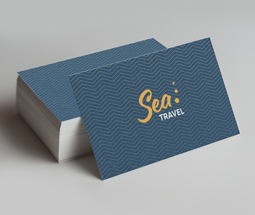
Business Cards

About the Author
Related posts.

How to Start a Stationery Business

7 Questions To Ask Yourself When Starting a Post-Pandemic Business

How to Start a Photography Business in the UK
Iso certified.
Bluetree Print Limited T/A has been certified to ISO 9001:2015 & ISO 14001:2015 for the following scope:
ISO 9001:2015: The production and supply of digitally, lithographically and nanographically printed products on paper, board and plastic substrates at the Manvers sites.
ISO 14001:2015: The production and supply of digitally, lithographically and nanographically printed products on paper, board and plastic substrates at the Manvers sites.
Certification is subject to periodic surveillance and re-assessment. For further information regarding the validity of the certification please Contact us for Certification Help. Call our helpful team today!
BUSINESS STRATEGIES
How to start a travel business in 7 steps
- Rachel Bistricer
- 12 min read
Get started by: Creating a website → | Getting a domain →

Starting a business in the travel industry can be a thrilling and profitable venture. Criteo’s survey reveals that more people worldwide plan to visit friends or family or travel for leisure in the next one to three months in 2024. This surge in global travel presents a golden opportunity for aspiring entrepreneurs to dive into the vibrant travel industry.
This guide will walk you through the steps of starting and managing a successful travel agency, some examples of travel business websites and how to become profitable.
What is a travel business?
A travel business is a service-oriented business that offers clients various travel-related accommodations, amenities and services. Travel agencies typically provide services such as:
Trip planning and reservations
Transportation services, including flights, car rentals and transfers
Accommodations, such as hotels, resorts and vacation rentals
Tour guide packages and experiences
Travel insurance and assistance services
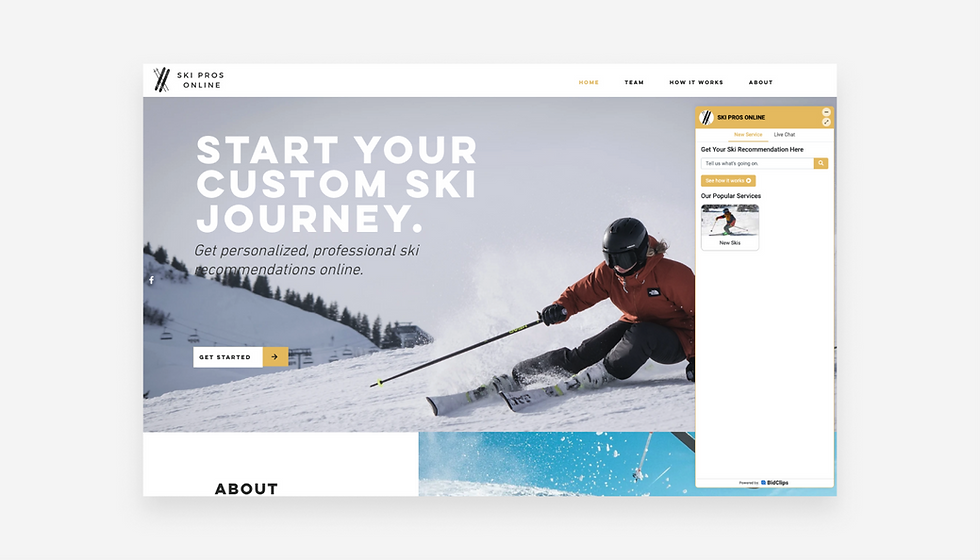
Why start a travel business?
The travel industry is on an exciting upward trajectory, with a projected annual growth rate of 3.47% globally through 2028 . With travelers spending billions every year on accommodations, transportation and other services, the travel sector is a goldmine of potential revenue.
In addition, people want personalized, unique travel experiences tailored to their preferences. Euromonitor International shares that travelers would be willing to pay more for these customized experiences. This means there's a huge opportunity to create your own travel agency that delivers these one-of-a-kind trips and reap big from the growing demand for personalized travel.
Decide on a travel business niche
Create a business plan
Select a business structure
Obtain business financing or capital
Set up accounting and bookkeeping services
Source specific travel equipment
Register your travel business
01. Decide on a travel business niche
The first step to creating a travel business is deciding on the specific niche you want to target. Focusing on a specific market segment—like adventure travel, family vacations, luxury trips, wellness retreats or sustainable tourism—allows you to create experiences that resonate with each traveler.
It also helps to differentiate your services, position yourself as an expert in the chosen area and effectively target people seeking those particular travel experiences.
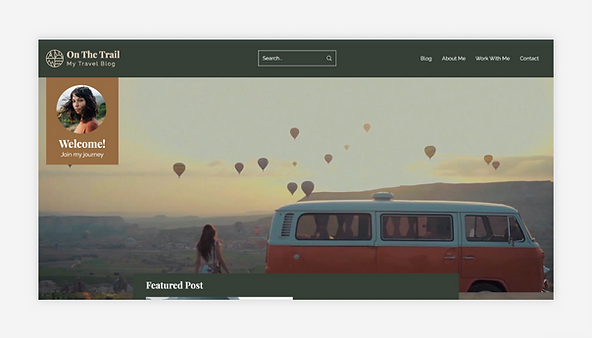
02. Create a business plan
A business plan serves as a roadmap for your business and helps you communicate your vision to potential investors when looking for funding. Create a detailed business plan that outlines the key aspects of your company. This includes identifying your target market, summarizing your executive strategy, implementing a marketing strategy and projecting your financials.
Also, make sure to include important details like the type of business you want to start and your chosen business name .
Here’s a travel business plan template you can use to get started. Adjust and expand the sections based on your specific business model and goals.
Here’s a travel business plan template to get you started:
Travel business plan template
Executive Summary
Business Name: [Your Travel Business Name]
Business Structure: [Sole Proprietorship/Partnership/LLC/Corporation]
Location: [City, State]
Founding Date: [Month, Year]
Founders/Owners: [Names]
Mission Statement: [Concise statement of the business’s purpose]
Business Description
Overview: Briefly describe your travel business, including key features, services and amenities.
Unique Selling Proposition (USP): Clearly define what sets your travel business apart from competitors.
Target Market: Identify your primary customer demographic and market segment.
Services and Amenities
List and describe the travel services and amenities your business will offer.
Include trip planning, transportation, accommodations, tour packages, etc.
Market Analysis
Industry Overview: Provide an overview of the travel industry, including trends and growth projections.
Competitor Analysis: Identify key competitors and analyze their strengths and weaknesses.
Target Audience: Define your target customer profile and their preferences.
Marketing and Sales Strategy
Marketing Plan: Outline your strategies for promoting the travel business, including online and offline channels.
Pricing Strategy: Detail your pricing structure and any promotional pricing.
Sales Tactics: Describe how you will attract clients and increase bookings.
Operational Plan
Location and Facilities: Describe the physical location and facilities of your travel business.
Suppliers: List and describe key suppliers for travel-related services.
Staffing: Outline your staffing plan, including roles and responsibilities.
Financial Plan
Startup Costs: Detail initial investment requirements and startup expenses.
Revenue Projections: Provide realistic revenue projections for the first 3-5 years.
Operating Costs: Outline ongoing operating expenses, including marketing, staff salaries and technology.
Funding Proposal
Purpose of Funding: Clearly state how the funds will be utilized.
Amount Needed: Specify the amount of funding required.
Repayment Plan: Outline the proposed repayment plan for loans or investments.
Risk Analysis
Identify potential risks and challenges that may impact the success of your travel business.
Develop strategies to mitigate and manage these risks.
Include any additional documents or information relevant to your business plan.
Examples: Market research data, resumes of key team members, mock-ups of marketing materials.
Summarize the key points of your business plan and highlight the potential success of your travel business.
Conclude with a call to action or next steps.
Note: This template serves as a general guide. Adjust and expand sections based on your specific business model and goals.
03. Select a business structure
Here, you get to choose the business structure that best suits your goals. Common options like a sole proprietorship , partnership , limited liability company (LLC) or corporation each have their own pros and cons.
For example, a sole proprietorship is easy to set up and you have complete control over the business. But there isn't a legal distinction between you and the business, which means you take personal responsibility for all debt, losses and taxes.
On the other hand, a corporation offers limited personal liability, which allows shareholders to purchase stock without worrying about their private assets being used to clear loans if the company goes into debt. However, setting up a corporation can be complex and costly. You may also get double taxation (on profits and dividends).
Learn more: How to start an LLC

04. Obtain business financing or capital
While starting a travel business can be quite an adventure, it also comes with significant upfront costs. You'll need money to get things rolling and keep your business afloat. This might mean taking out bank loans, hunting for grants or attracting investments from stakeholders.
You must first calculate how much capital you need to start and run your business until it becomes self-sustaining. Some expenses to consider include:
Building a website and maintaining it
Marketing and advertising campaigns
Trip planning software and tools
Reservation systems and travel management software
Staff recruitment and travel agent training
Initial salaries and benefits for employees
Transportation services (e.g., vehicle fleet or partnerships with transportation providers)
Technology infrastructure (computers, servers, etc.)
Licensing and permits for operating a travel business
Insurance coverage for travel-related risks
Office space and utilities
Professional services (legal, accounting, etc.)
Next, consider the various sources of funding for your travel business. Each funding option has its own requirements, benefits and levels of risk. Explore multiple avenues to find the best fit for your business model.
Some common options include:
Personal savings: Using your savings can help you fund your business without taking on debt. But you need to have enough reserves to cover business expenses and emergencies.
Bank loans: To qualify, you’ll need a strong credit history and a solid business plan. Be prepared to provide collateral and demonstrate your ability to repay the loan.
Small Business Administration (SBA) loans: SBA loans are designed to support small businesses and often come with favorable terms. The application process can be lengthy, but the benefits are worth the effort.

05. Set up accounting and bookkeeping systems
Invest in reliable accounting software that suits your business needs to establish strong accounting and bookkeeping systems. Popular options like QuickBooks and Xero offer features tailored for small businesses, such as invoicing, expense tracking and financial reporting.
It's also best to open a dedicated business bank account to separate your business and personal finances. This will simplify bookkeeping and make sure you record all business transactions accurately.
06. Source specific travel equipment
The right equipment can enhance the quality of your services, boost customer satisfaction and help you stand out in a competitive market. Consider the type of travel experiences you want to offer and the specific requirements of your target audience.
Then, make a list of necessary items such as:
Reservation management software
Vehicles (if you provide transportation services)
Communication systems (like phones and email)
Office furniture and supplies
Technology infrastructure (like computers and servers)
Some equipment, like cars, might be too expensive to purchase outright. So, consider renting or leasing options. That way, you can access high-quality equipment without a significant initial investment.
07. Register your travel business
After writing your business plan and choosing your business structure and name, it’s time to register with federal and state governments to legally operate your travel business.
This includes filing the necessary paperwork to create your business entity, such as articles of incorporation for a corporation or articles of organization for an LLC. You must also get an Employer Identification Number (EIN) from the IRS for tax purposes.
In addition, depending on your location and specific services, you may have to get various licenses and permits. These could include a general business license, a seller of travel (SOT) license or specific industry-related permits. Research the requirements in your state and local area so that you comply with all regulations to avoid fines and legal issues.

Learn more: How to register a business , How to get a business license
Tips for managing your travel business for profitability:
Now that your travel business is up and running, you need to manage it properly to become profitable. Here are some general tips on how to achieve that:
Research your industry
The travel industry is dynamic, with new trends emerging regularly. Therefore, get to know the sector inside out. Understand your competitors, target customers and what kind of financial investment you need. This way, you can tailor your services to meet customer expectations, which can result in them recommending your business to others.
If you're new to the travel industry, consider gaining experience by working as a travel agent or volunteering at a tourism office. This hands-on experience will give you valuable insights and skills, which you can use to build a network of industry contacts who can be crucial for your company’s success.
Develop a marketing strategy
A marketing strategy helps you reach your target audience, build brand awareness and drive bookings. Focus on the channels where your audience is most active. This includes social media, email and doing partnerships with influencers or travel bloggers.
Consider launching a travel blog , too, as over a third of people worldwide visit personal travel blogs for ideas. A user-friendly and search engine optimized (SEO) travel website can help showcase your services and attract potential customers.
Learn more: Check out these travel blog names for some inspiration.
Once you build your website, create engaging content, such as blog posts, videos, newsletters and promotional offers that resonate with your audience. High-quality content builds trust, showcases your expertise and encourages potential clients to book with you.
Invest in customer service for your travel business
A travel business isn't just about booking flights and hotels for clients—it’s about creating unforgettable experiences from the moment a customer starts planning their trip until they return home. That is what leads to referrals. In fact, 61% of travelers say that recommendations from friends and family are crucial deciding factors when choosing a travel company.
With that in mind, respond to customer inquiries quickly and professionally. Help clients navigate every aspect of their journey, whether it’s dealing with lost luggage or offering travel insurance advice. Be the dependable support they need while traveling, like having a 24/7 concierge service at their disposal. This way, you’ll have a highly satisfied customer base that feels supported and valued throughout their travel experience.
Build partnerships for business operations
To boost the growth of your travel business, think about teaming up with airlines, hotels, tour operators and key players in the industry. These partnerships can unlock exclusive deals that let you offer clients exciting perks like preferential rates, premium accommodations and tailored travel packages, which enhance the value of your services.
You can also attend networking events and industry gatherings to meet experienced professionals and gain valuable insights. Building these connections and staying on top of the latest trends can position your travel business as the go-to expert for people looking to travel.
Travel businesses to inspire (all built on Wix)
Let’s now look at some examples of successful travel businesses to give you an idea of how to start one.
The Lucky Traveler
Travel expert specializing in planning All-inclusive Vacations, Comprehensive Trip Planning, Points and Miles Consultation and Destination Weddings.
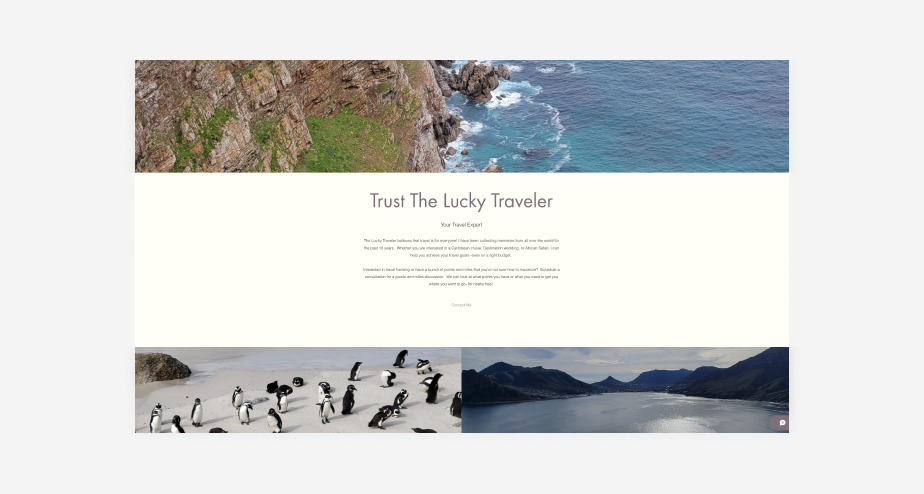
A full service travel agency with experience in planning "bucket list" vacations and navigating the travel industry.
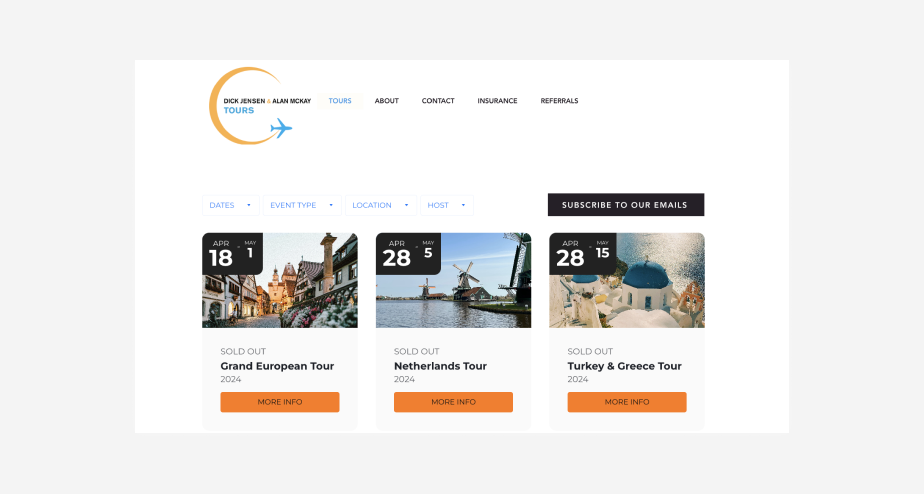
Worldwide Fun4All travel
Travel agent focusing on planning tailoring trips to clients needs and interests.

Benefits of starting a travel business:
Running a travel business gives you the freedom to be your own boss. You can set your own hours, make decisions that align with your vision and have the flexibility to balance work and personal life.
In addition, the demand for travel services is consistently high, particularly in areas with a substantial tourist presence. This creates room for multiple revenue streams, from booking commissions and service fees to custom travel packages and partnerships with hotels and tour operators.
Starting a travel business also helps you build a vast network of contacts in the industry. From clients and suppliers to fellow travel professionals, these relationships can lead to collaborations, partnerships and new business opportunities.
Challenges of running a travel business:
Despite its numerous benefits, the travel sector still has its challenges. One issue is that the industry is susceptible to economic conditions. Economic downturns, recessions and fluctuations in currency exchange rates can significantly impact travelers' spending habits and overall demand for travel services.
Moreover, coordinating travel logistics, managing bookings and making sure customers have a seamless experience can be challenging if you lack the necessary skills and tools. Any mismanagement can lead to customer dissatisfaction and reputational damage. However, online booking systems and scheduling software can help you manage these aspects effectively.
How profitable is a travel business?
The profit margins for travel businesses in the U.S. vary widely based on the type of business, target market and business model. Here’s a general breakdown:
Online travel agencies (OTAs) : These businesses typically have 10% to 20% profit margins.
Tour operators: With profit margins around 15% to 30% , tour operators benefit from package deals and markups on activities.
Hotels and resorts: Profit margins for these can vary greatly, averaging around 3% to 8% . However, luxury travel properties can achieve much higher margins thanks to their premium services and amenities.
Airlines: Profit margins are often slim, around 2% to 5% , due to high operational costs and fuel dependency.
Cruise lines: Profit margins can be higher, reaching 10% to 15% , due to their all-inclusive nature and the enticing onboard spending options available to passengers.
Note: These are just a general guide to profit margins, so make sure to research them before starting any type of business.
Looking to start a travel business in a specific state?
Licensing laws around travel can get complicated pretty fast. The good news is that a travel agent license is not required at the federal level. However, things change at the state level. While many states don't demand special licensing, a few have specific requirements like the SOT regulations.
States that require an SOT license include California , Florida , Hawaii and Washington . If your agency operates in or sells to clients in these states, you’ll need to register as a seller of travel.
Other states with regulations worth noting include:
Delaware: Requires an occupational license for agencies based in the state.
Illinois: The Illinois Travel Promotion Consumer Protection states that agencies must establish a trust account if they accept client payments unless they meet specific insurance and surety bond requirements.
Louisiana: Imposes a licensing fee based on gross sales for retail travel agencies (storefronts). Home-based travel agencies are exempt.
Massachusetts: Has specific rules for travel agencies, detailed in a state document.
New York: Enforces the Truth in Travel Act , which includes specific disclosure requirements for travel agencies.
No matter where you're starting your travel business, be sure to keep these tips in mind:
Stay updated with local and federal regulations, as laws can change.
Get professional liability insurance to protect your business and meet any state-required consumer protections.
Consult a legal professional or a travel advisor who knows the law inside out. They can offer specific advice that can help you avoid pitfalls.
If you're an independent travel agent, partner with a host agency and use their seller of travel number to reduce expenses and administrative burden.
How to start a travel business FAQ
How much money. doi need to start a travel business.
The amount of money you need to start a travel business can vary widely depending on several factors. These include the scale and scope of your operations, business model and location. For example, a mid-scale travel agency in the U.S. can cost you $44,000 to $155,000 to start. But it may be as little as $10,000 if you want to operate from home.
Is starting a travel business worth it?
Other business ideas you might be interested in.
How to start an industrial design business
How to start a freelance business
How to start an art business
How to start an eCommerce business
How to start a construction business
How to start a car detailing business
How to start a DJ business
How to start a dog walking business
How to start a catering business
How to start a real estate business
How to start a lawn care business
How to start a food truck business
How to start a landscaping business
How to start a pressure washing business
How to start a cleaning business
How to start a tutoring business
How to start a coaching business
How to start a pool cleaning business
How to start a food business
How to start a painting business
How to start a restaurant business
How to start a baking business
How to start a handyman business
How to start a marketing business
How to start a nail business
How to start a trucking business
How to start a rental property business
How to start a farming business
How to start a homecare business
How to start a flower business
How to start a car wash business
How to start a gaming business
How to start a sports card business
How to start a frozen food business
How to start a courier business
How to start a laundromat business
How to start a wedding business
Related Posts
How to start a travel blog in 10 steps (2024 guide)
101 travel agency business names (+ tips to help choose)
How to make money as a travel agent in 13 unique ways
Was this article helpful?
Never miss another article
Thanks for submitting!
For any queries to privacy concerns, please contact us at [email protected]
This blog was created with Wix Blog
- Purchase History

Tourism Business Plan Templates

Choose your Tourism business plan template from the list below:
- Hotel Business Plan Template
- Bed and Breakfast Business Plan Template
- Travel Agency Business Plan Template
At Business and Plans, we offer a wide range of Tourism business plan templates to cater to your specific needs. Whether you are starting a Hotel, Bed and Breakfast, or Travel Agency, we’ve got you covered. Our professionally designed templates will save you time and ensure your business is set up for success. Browse through our selection below and choose the perfect template to kickstart your journey in the booming tourism industry.
Welcome to Your Gateway for Success in Tourism Business!
Unlock the Potential of Your Hospitality Venture with Our Expertly Crafted Tourism Business Plan Templates.
Are you ready to elevate your hotel, bed and breakfast, or travel agency to new heights of success? At Business & Plans, we understand the unique challenges and opportunities that the tourism industry presents. That’s why we’ve curated a collection of comprehensive and professionally designed tourism business plan templates to guide you on your journey to prosperity.
Why Invest in a Tourism Business Plan?
1. strategic roadmap:.
Our meticulously crafted templates serve as your strategic roadmap, helping you navigate the competitive landscape of the tourism industry. Whether you’re starting a new venture or looking to revitalize your existing business, a solid business plan is your foundation for success.
2. Investor Confidence:
Attracting investors is a key step in expanding your tourism business. A well-structured business plan not only demonstrates your commitment but also instills confidence in potential investors. Showcase your vision, market analysis, and financial projections with our templates to secure the support you need.
3. Operational Efficiency:
Efficient operations are crucial in the tourism sector. Our business plan templates guide you through operational strategies, from optimizing booking processes to enhancing customer service, ensuring that your business runs smoothly and exceeds customer expectations.
Why Choose Our Templates?
- Expertly Crafted: Our templates are created by industry experts with years of experience in the tourism sector.
- Customizable: Tailor each template to suit the unique aspects of your business, ensuring a personalized approach.
- Comprehensive Guidance: Step-by-step guidance to help you fill in every section of the business plan with confidence.
- Up-to-Date Insights: Benefit from the latest trends and insights in the tourism industry to stay ahead of the competition.
Invest in the success of your tourism business today! Browse our collection of business plan templates and take the first step toward achieving your business goals. At Business & Plans, we’re committed to your success in the dynamic world of tourism.
- PRO Courses Guides New Tech Help Pro Expert Videos About wikiHow Pro Upgrade Sign In
- EDIT Edit this Article
- EXPLORE Tech Help Pro About Us Random Article Quizzes Request a New Article Community Dashboard This Or That Game Happiness Hub Popular Categories Arts and Entertainment Artwork Books Movies Computers and Electronics Computers Phone Skills Technology Hacks Health Men's Health Mental Health Women's Health Relationships Dating Love Relationship Issues Hobbies and Crafts Crafts Drawing Games Education & Communication Communication Skills Personal Development Studying Personal Care and Style Fashion Hair Care Personal Hygiene Youth Personal Care School Stuff Dating All Categories Arts and Entertainment Finance and Business Home and Garden Relationship Quizzes Cars & Other Vehicles Food and Entertaining Personal Care and Style Sports and Fitness Computers and Electronics Health Pets and Animals Travel Education & Communication Hobbies and Crafts Philosophy and Religion Work World Family Life Holidays and Traditions Relationships Youth
- Browse Articles
- Learn Something New
- Quizzes Hot
- Happiness Hub
- This Or That Game
- Train Your Brain
- Explore More
- Support wikiHow
- About wikiHow
- Log in / Sign up
- Finance and Business
- Business by Industry
- Hospitality and Tourism Businesses
How to Develop a Tourism Business
Last Updated: February 16, 2024 Approved
This article was co-authored by Jessica Villegas . Jessica Villegas is a Certified Academic Life Coach and the Founder of Hi-Lite Coaching + Consulting in Winter Garden, Florida. Jessica has over 20 years of leadership experience, and she and her team serve teens and young adults through private coaching, group coaching, workshops, and speaking engagements. She uses workbook exercises, coaching planners, and regular check-ins to support young adults in achieving their academic and personal goals. Jessica received her Bachelor’s in Organizational Communications and Leadership Studies from the University of Central Florida and her Professional Coaching certification through Coach Training EDU, an ICF Accredited Institution, as an Academic Life Coach. wikiHow marks an article as reader-approved once it receives enough positive feedback. This article received 23 testimonials and 100% of readers who voted found it helpful, earning it our reader-approved status. This article has been viewed 357,415 times.
A tourism business is a great way to share your passion with others looking to experience a new location or culture, be it in a business or leisure capacity. To develop a tourism business, you need to first decide on your focus and create a business plan. Afterwards, you can move on to marketing and growing your business.
Selecting Your Businesses Focus

- Don't be afraid to send your customers to other businesses—it shows that you know the area well and are dedicated to ensuring they have the best time possible.
- Use your chosen geographic region to guide your focus. For example, if your location is secluded from the populace and dense with wineries, then guided winery tours, local bed and breakfasts, and airport transportation services are all viable business options.

- Imagine how your hotel would look and how it would stand out.
- Ask local business owners about their experience in the industry to get a feel for their day-to-day activities and how they succeed.

- Book a tour with a local agency and get a feel for what they offer. Take note of their pricing and routes.

- Compare the busiest restaurants to the slowest. Ask yourself what they are doing differently and how they could improve.

- For example, you might find that all hotels offer complimentary breakfast, so be sure to offer this. But if you find that none of them offer complimentary dinner, you can offer this to set yourself apart.
- Pinpoint a tourism sector that is not overly congested, and one that you can contribute something unique to.

- For example, if you want to focus on providing tours, decide on a location that you know well in terms of its history, food, and entertainment. If you think hospitality is your calling, decide on the type of foods and beverages that you want to provide to tourists.
- List the contacts that you have within each niche to get a better idea of which one you have the most connections in.
Setting the Foundation for Your Business

- If you provide tours in natural areas, you will likely need specific permits for each region or park.

- Determine if you must carry disability, unemployment, or other types of insurance for your employees.

- Include an outline of the products and/or services your business will be providing for tourists.
- Provide information about your target market and your competition.
- Describe how you plan on running your business and pricing your product or service

- Employee benefits

- Apply for a small business loan or grant if you find that you're low on funds. Visit Grants.gov ( https://www.grants.gov/ ) for a list of grants available around the world, or visit your bank and inquire about loans.
Marketing Your Tourism Business

- Run local promotions for your peers and their family and friends.

- Take out ad space in newspapers, magazines and lifestyle publications.
- Produce all applicable marketing materials, such as logos, regular newsletters, and business cards.

- Be sure to hire a specialist for search engine optimization (SEO) to maximize your site's online presence.

- Stay connected to local tourism industry councils and relevant media and trade organizations.
Growing Your Business

- Post ads on classified websites. Be sure to indicate the skills and experience you are looking for.
- Select employees that are familiar with your business. Remember that you always want to offer your customers a personalized, engaging experience.
- Plan your staff as far ahead as you possibly can. Be sure to plan extra carefully for busy times of the year.
- To make your business work, you really need to invest in your employees. It starts with the mission, vision, and values of the company and how those are permeated throughout your employees and how you deliver that and how you show up as that.

- Track competitor products, prices, and value regularly.

- Create gift cards, promo codes, and vouchers for your customers.

- Make it your primary goal to deliver on your promises and address every customer issue personally.
- Encourage your customers to leave their feedback on social media services.

- Always tell your customers about other sights in the area and tourism businesses close to yours that they can experience while in the area.
- Tell your customers about package deals, sales, and discounts.
- Send customers a follow-up email to thank them for choosing your business and make them feel welcome to return at any time!

- Plan different packages for different times of the year.
- Consider your audience when creating packages. Offer them things that make the experience more enjoyable and convenient.
- Look at packages from competing businesses and try to offer something that they don't.
Community Q&A
You Might Also Like

- ↑ https://smallbusinessbc.ca/article/strategies-start-grow-tourism-business/
- ↑ https://www.business.qld.gov.au/industries/hospitality-tourism-sport/tourism/starting-up/regulations/licences-permits-legislation
- ↑ https://www.business.qld.gov.au/running-business/employing/taking-on-staff/find/assess
- ↑ https://www.rezdy.com/blog/3-costs-you-need-to-consider-when-pricing-your-tourism-product/
- ↑ https://www.capterra.com/tour-operator-software/
- ↑ https://www.iti.gov.nt.ca/sites/iti/files/ProductPackaging.pdf
About This Article

Developing a tourism business is a great way to make a profit while sharing your love of different cultures with new people. A tourism business is any business that caters to tourists, like hospitality, food, and local tours. You’ll need to choose a lucrative niche with little competition to make sure there's space in the market for your business. Choose a location you know well and an industry you have experience in. Unless you already have funding for your business, you’ll need to secure a small business loan, grant, or private investment. You'll also need to write a business plan to present to investors and help you plan your next steps. For more tips, including how to market your tourism business, read on! Did this summary help you? Yes No
- Send fan mail to authors
Reader Success Stories
LINDA HOPKINS
Jul 16, 2017
Did this article help you?

Sahil Rithwan
Mar 8, 2017
Roslan Ismail
Mar 10, 2017
Zendmene Erdenetsogt
Jul 27, 2016
Shivo Chimbonda
Apr 26, 2017

Featured Articles

Trending Articles

Watch Articles

- Terms of Use
- Privacy Policy
- Do Not Sell or Share My Info
- Not Selling Info
Get all the best how-tos!
Sign up for wikiHow's weekly email newsletter
We earn commissions if you shop through the links below. Read more
21 Tourism and Travel Business Ideas
Back to Business Ideas Categories
Written by: Carolyn Young
Carolyn Young is a business writer who focuses on entrepreneurial concepts and the business formation. She has over 25 years of experience in business roles, and has authored several entrepreneurship textbooks.
Edited by: David Lepeska
David has been writing and learning about business, finance and globalization for a quarter-century, starting with a small New York consulting firm in the 1990s.
Published on July 21, 2022

The tourism industry is massive and diverse, offering many opportunities for sharp entrepreneurs. You could start a travel agency, a campground, a hotel, or a concierge service. Explore many more excellent tourism and travel related business ideas in our list below.
1. Travel Agency

If you love to travel and are always planning your next trip, starting a travel agency might be the perfect career choice. It’s a great way to share your love and knowledge of travel, and it can be very lucrative.
If you have the resources, starting a travel agency business can be a breeze. But first, you need to identify your target market. Will you focus on domestic or international travel? A lot of Americans go on short trips for vacation or business purposes, providing an opportunity for travel agencies to earn money. Once you find your niche and draw up a business plan, you should work on establishing your brand and promoting it to find clients.
2. Nightclub

Do you enjoy late nights on the town? If so, starting a club might be right up your alley. Before you open your club, it’s important to know that the industry is heavily regulated, especially when it comes to alcohol consumption. You’ll need to meet both state and local regulations and licensing requirements so it’s best to inquire about the details from your local authorities first.
Next, it’s a good idea to research the market and find out what other clubs in your area are offering. You’ll have to innovate and come up with a unique selling proposition and a creative marketing plan for your club to attract customers. With these in place, your club can be very profitable.
3. Travel Photography

Are you an amateur photographer who loves snapping great images? Photography in the US is an $11 billion industry expected to see steady growth in the coming years, so now would be a great time to stretch your entrepreneurial wings and give it a shot. You could focus on travel photography, if that’s your passion, and give the world beautiful photos while also seeing the world. You can capture landscapes, people, cultures, customs, and history.
Assuming you already have a professional-level camera, you’ll just need some great editing software and to build a website showing off your portfolio and listing your prices and services. Instagram and Pinterest are perfect social media networks for showing your travel photography.

If you’ve stayed in an Airbnb, you probably know how sweet it is to have a home away from home! This is why the homestay segment of the hotel and lodgings market has seen explosive growth in recent years, with Airbnb leading the way. Renting out your home as an Airbnb is an easy and flexible way to earn income, whether you’re looking for a little extra money or to build a serious business.
The first step is to make sure your home or apartment can be rented out for short-term stays. In many areas today, there are laws either banning Airbnb rentals or limiting them to a certain share of local units. If your home clears that hurdle and is in an area with some tourist appeal, you’re already halfway there. If your apartment fails to meet one of these requirements, you might want to look into purchasing a home or apartment in an appealing destination, which you could then develop into a successful Airbnb.
Whichever approach you choose, the most important step is delivering fantastic service to your guests. If you can achieve Superhost status, you’ll be well on your way to Airbnb success.
5. Translation Business

Demand for translation services is expected to grow as more companies seek to capture or increase their share of the global market. Translation businesses help translate documents, localize travel and city guide websites, and interpret speech, including sign language. If you’re thinking of starting a translation business, you’re not alone. But if you have the skills and the right talents and tools, you could edge out the competition.
In this internet age, finding translators who can work remotely across the globe has become easier. Promoting diversity among your staff could also be good for your business because you’ll be able to offer translation services for more languages. Do the paperwork to register your business, keep yourself updated with the latest technologies, promote your services, and you should be able to gain traction as soon as you start operating.
6. Bed and Breakfast

Many Americans still prefer to stay in a traditional B&B for the unique hospitality, homemade food, and fascinating local insights. When starting a B&B, it’s important to be aware of the latest industry trends. For example, many guests prefer a facility that offers live entertainment or is located close to tourist attractions. It’s also to your advantage to research the market and see what features and services are being offered by the competition. Be innovative in coming up with ways to differentiate your business. Running a bed and breakfast is not easy, but it can be very rewarding if you play your cards right.
7. Glamping

A decade ago nobody had heard the word glamping, which is short for “glamorous camping”. Today it’s a nearly $3.1 billion global industry and among the fastest-growing segments of the travel and hospitality market, expected to more than double by 2030. If you have a bit of land in an appealing location, or have the funds to purchase such a plot, you could start your own glamping business and make a good living offering luxury experiences to discerning travelers.
There will be some serious work involved. In addition to acquiring the property, you’ll need to outfit it with all the bells and whistles — from tents and teepees to high-end beds, furniture, lighting and air-conditioning and heating units. If your location is on the water, you could boost your revenue by also offering sailboats, canoes, kayaks, and more. But before you get started, this is a new and fast-evolving industry, so it’s best to take the time to research the market and learn the latest trends before diving in.
8. Jet Ski Rental

Do you like having fun out on the water? Well, so does everybody else! That’s why starting a jet ski business is almost always a great idea. The global personal watercraft market is worth $1.6 trillion and expected to expand an impressive 50% by 2027. Right now is a great time to start a jet ski business, bring good times to your community and ride the market expansion to great success.
Getting there will require a significant investment. You’ll need to spend about $25,000 to get your first few jet skis, plus a rental facility on the water and permits and licensing fees. Of course, you’ll also need to live near an appealing body of water, preferably one that’s enjoyable for more than a few months of the year. Finally, you will want to get good insurance, because jet skis are as dangerous as they are fun.
Once that’s all settled, just start advertising on local outlets and events, posting on relevant social media groups and online vacation platforms. You’ll have your first few customers in no time, and soon be cruising toward success.
9. Campground

Do you love the outdoors? If so, setting up a campground could be the perfect way to start your entrepreneurial journey. The recent study found that an estimated 84.8 million Americans went camping in 2023, and 5.5 million of those were first-time campers.
Your biggest challenge in starting a campground is likely to be finding a suitable location. The most visited campgrounds in the US are in state parks, near bodies of water, surrounded by wilderness, or in the mountains. Once you find an ideal campsite, you’ll need to comply with licensing, zoning, and other legal requirements. Before you launch your business, it’s wise to research the market and find out what other campgrounds are offering. With careful planning and a creative marketing strategy, your campground can give competing sites a run for their money.
10. Pet Sitting

You’d probably never guess that pet sitting is a $2.4 billion industry , but it is indeed. People love their pets, and will spend whatever it takes to ensure they’re taken care of when they are away. The pet sitting market is projected to see impressive growth through 2030, so if you’re an animal lover, now is the perfect time to start your own pet sitting business and ride that wave to serious profits.
The first step is to decide which type of pets you’ll care for. Do you have more experience with dogs or cats? Are you OK with snakes? Pigs? Once you’ve got that nailed down, you’ll just need to buy some pet toys and supplies and offer your services on a gigs site like TaskRabbit. It’s a good idea to reach out to friends, family and work-related contacts and acquaintances. If you’re able to generate an initial client or two from your own personal network, and provide them with great service, you’ll have a strong reference to promote your services and start building a successful business.
11. Spa Salon

If you’re a massage therapist or esthetician, you could open a beauty salon, nail spa, luxury spa, massage studio, or even a mobile spa, and make people feel better while making a good living.
You will likely need to get licensed, which can take some doing, and deliver excellent services to compete in an increasingly competitive and saturated market. Another crucial aspect will be location — your spa should be somewhere with steady traffic. Or you could go the mobile spa route and make house calls, bringing your massage and therapeutic services to your clients. This is more convenient for them, which means you can charge a higher rate, despite having lower overhead.
There are many elements to consider for your spa business, but what is not in doubt are your chances of success if you’re determined and can deliver healing services.
12. Scooter Rental

With gas prices going up, more and more Americans are turning to cheaper, more eco-friendly options for their commute and for seeing the city. Scooters cost less than cars and run on electricity. Over the past decade, Americans took a third of a billion trips on shared bikes and scooters. That’s a huge number, and it’s expected to increase sharply in the next few years. Considering this, a scooter rental business is a smart choice.
But first, it’s important to understand that scooters are used primarily as a transport option for short distances. Setting up this kind of business requires a huge upfront investment because you might have to purchase some scooters, unless you can lease them. You’ve need to make sure you have all the necessary permits and insurance in place before opening.
Once you have everything you need, it’s a good idea to work on a marketing plan. You can use social media, print ads, and word-of-mouth to get the word out about your new venture.
13. Party Bus

Ready to party? As the pandemic recedes, everybody’s getting back out there to have a good time. For a lot of people that means renting out a party bus and dancing and drinking the night away while cruising down the streets.
Starting your own party bus business will require considerable investment. The major cost will be, of course, the bus itself. Hopefully you’ll be able to find a reliable one at a reasonable price and then deck it out with all the trimmings, from a bar and disco ball to a DJ booth and more. Once you’ve done some marketing and gotten the word out you’ll be able to charge as much as $700 per night, so it shouldn’t take too long before you see a major return on your investment.
Just be sure to get all your licenses, permits and insurance — the last thing you want is for the party to get parked on the curb.
14. Car Rental

With some hard work and determination, you could start your own car rental business and provide travelers the transport they need while grabbing your share of a growing $30 billion US market .
Keep in mind that this is a competitive industry, which means you’ll need to find ways to stand out, such as with deep discounts or a unique selection of cars. Speaking of which, you’ll also need to lay out a sizable investment to get your initial fleet of four to five cars. Finally, it’s crucial that you meet all the licensing and insurance requirements or your business could face severe fines, or worse.
But if you’re able to clear these hurdles, there’s a good chance your car rental business will soon be cruising down easy street.
15. Boat Rental

Who doesn’t love a day out on the water? There are so many things to do. from skiing and tubing to cruising, socializing, swimming and just taking in the sun. That’s why boat rentals are a $5.3 billion US industry expected to see smooth sailing and steady growth in the years ahead. If you like spending time outdoors, you could start your own boat rental business and help people enjoy their time off while making a good living.
There are several possible constraints. For one, you should live near a sizable body of water, and find an available access point or marina to base your operations. Second, you’ll likely need to accept the seasonal nature of this line of work, which in most areas of the US will only bring in revenue for 6-7 months of the year. Finally, getting started will require a significant investment, as appealing, rentable boats do not come cheap.
But if you’re OK with all this, and able to acquire the necessary permits and insurance, once you start putting boaters on the water you’ll be cruising straight toward success.
16. Bike Rental

As travel regains steam and more workers return to the office, demand for bike rental for last-mile connections is sure to increase. If you’re thinking of starting your own business, a bike-share outfit or bike rental shop could be a great option. The US bike rental industry is projected to grow in the next five years amid a bike-share boom, driven in part by environmental concerns.
There are a few things you need to consider before starting a bike rental business. Is there a market for bike rental in your area? What kind of bikes should you offer? How many bikes should you start with? You will find the answers to these questions as you research the market. It is also important to comply with all the legal and regulatory requirements and to come up with a good marketing plan. One option is to place bike docks near subway stations and major bus stops.
17. RV Rental

RVing , or traveling in a recreational vehicle, is a popular way of exploring the US with family and friends. It’s showing no signs of slowing as more than 70 million Americans are expected to go on road trips in an RV they rent, own, or borrow, according to the RV Industry Association. You could start an RV rental business and tap into this exciting travel market.
You can either invest in a fleet of RVs, which would require a hefty investment, or you can just list your RV on an online marketplace like Outdoorsy. Before setting your rates, it’s a good idea to scope out the market and find out what your competitors are charging. You’ll have to factor in insurance and other costs in order to make a profit.
Finally, it’s important to keep your RVs well-maintained to attract customers, most of whom prefer to rent out new units. With all this in place, your RV rental business will making good money in no time.
18. Kayak Rental

As more people explore the outdoors in a post-pandemic world, a kayak business makes sense. It’s an eco-friendly way to help travelers enjoy their time off while getting some exercise and enjoying the great outdoors. The global kayak accessories market size was $164.2 million in 2020 and will touch $214 million by 2027. So, why not start a kayak rental business now?
Aside from offering kayaks for rent, you could also also offer apparel and helmets, storage bags, seats, life jackets, and safety gear. Selecting the location of your shop is important. It will have to be near the coast, a river or a lake, and with steady foot traffic. You’ll need a substantial investment to set up your shop. Finally, it’s a good idea to promote your business and let people know about your offerings.

Considering all the ride-sharing apps out there, you might be surprised to learn that old-school taxis are not only surviving, but doing quite well. The US taxi and limo market is worth more than $41.7 billion and expected to see steady growth in the coming years. If you enjoy driving and meeting new people, starting a taxi business might be the right move for you.
Getting started will require some real effort and investment. You’ll need to buy a reliable car, if you don’t already have one, plus reliable insurance and all the necessary permits. In some cities the car hire license can be a major expense, for instance a New York City taxi medallion costs $80,000. In other places, like $300 in Cleveland, not so much. Once you’ve all set up, it’s a good idea to build a website so people can find you, and you might want to offer an app as well, as most car services nowadays offer on-demand ordering.
Finally, get creative with your marketing to stand out in a competitive market, provide excellent service and steady driving to your first few clients, and the good reviews and revenues should start pouring in.
20. RV Park

The wanderlust spirit and a rise in road-tripping have amplified the allure of RV travel. Capitalizing on this trend, starting an RV park presents a golden opportunity in the travel business sector. Such parks cater to a growing demographic of explorers seeking the comfort of their RVs while embracing the freedom of the open road. With the right amenities and a strategic location, an RV park can be a haven for both short-term travelers and long-term nomads.
Location is paramount, ideally near popular tourist spots or natural attractions. Additionally, ensuring modern facilities, security, and possibly offering unique experiences or events can differentiate your park from competitors. As travel patterns evolve, an RV park can offer travelers a blend of adventure and convenience, making it a profitable and sustainable business venture.
21. Tour Operator

Tour operator business thrives on curating unique experiences, offering tailored packages, and ensuring travelers get the best out of their journeys. Unlike general travel agencies, tour operators control and manage the specifics of the trip, right from itinerary planning to the on-ground execution. This means creating partnerships with local businesses, ensuring safety standards, and offering a seamless travel experience to clients.
In today’s digital age, a tour operator’s success doesn’t just hinge on local networking, but also on a strong online presence. Reviews, testimonials, and digital marketing strategies play a pivotal role in attracting potential customers. Whether one chooses to cater to adventure seekers, history enthusiasts, or luxury travelers, the key is to differentiate, maintain high service standards, and keep evolving with the dynamic travel industry.
Leave a Reply Cancel reply
Your email address will not be published. Required fields are marked *
Save my name, email, and website in this browser for the next time I comment.
- Travel Agency
- Travel Photography
- Translation Business
- Bed and Breakfast
- Jet Ski Rental
- Pet Sitting
- Scooter Rental
- Boat Rental
- Bike Rental
- Kayak Rental
- Tour Operator
Subscribe to Our Newsletter
Featured resources.

12 Profitable Lake Business Ideas to Start Today
Esther Strauss
Published on December 1, 2022
Fresh air, peace of mind, scenic views, and lots of fun — that’s lake life in a nutshell, which is why so many people want to take part. ...

37 Profitable Summer Business Ideas for a Hot Season
Carolyn Young
Summer means taking a break, enjoying outdoor leisure, going to a summer camp, and BBQ’ing in the backyard. For smart entrepreneurs, it alsome ...
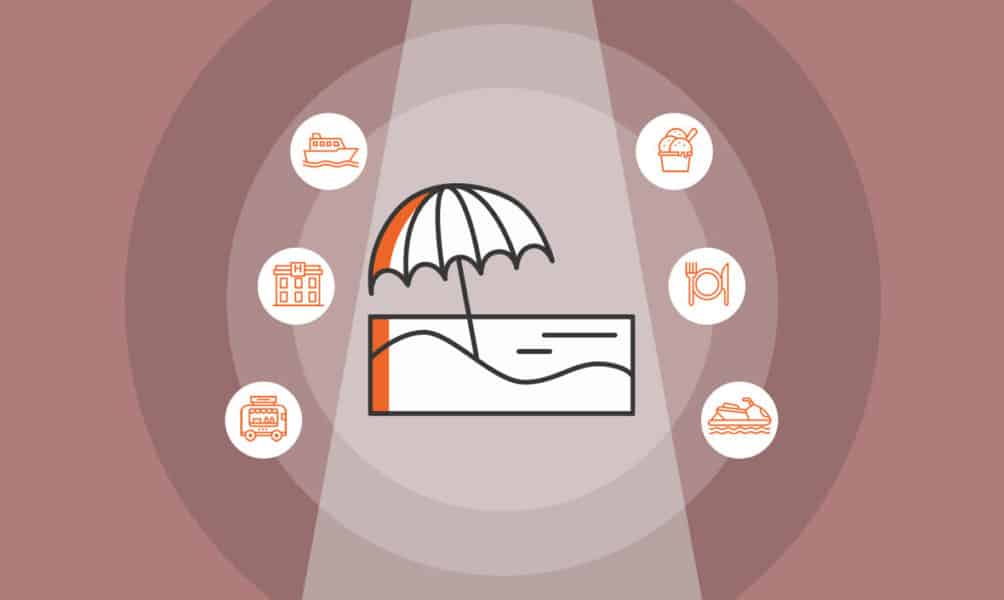
21 Profitable Beach Business Ideas for a Sunny Future
David Lepeska
So you live near a beach. Lucky you! You can go swimming or walk barefoot in the sand any time you like. Even better, you could also start abusiness ...
No thanks, I don't want to stay up to date on industry trends and news.

- Increase Online Bookings
17 Innovative Tourism Business Ideas and Trends for 2024

In This Article: Trends to Inspire Your Tours and Activities
Gig-Tripping, Bleisure, and Skip-Gen Travel: From eco-conscious adventures to immersive culinary experiences, what are some of the top travel business ideas likely to appeal to travelers in 2024? And how can tour businesses capitalize on them?
It’s that time of year again; when we take a deep dive into the research into travel and tourism trends for the year ahead so you don’t have to. As well as scouring the travel press, talking to our partners, customers and contacts, and racking our own brains here at Rezgo, we’ve picked highlights from several influential research reports into tourism business trends for 2024.
Even if you’re getting into the tour operator industry, there’s a lot of reasons to be optimistic. Read on to learn the tourism trends you can use to start your tour business in 2024.
Reasons to be cheerful about tourism in 2024

These findings were backed up by UNWTO’s latest Tourism Confidence Index survey of travel professionals. It found that “67% of tourism professionals indicating better or much better prospects for 2024 compared to 2023.”
According to the UNTWO, reasons to be optimistic in 2024 include:
- An uptick in the reopening of several source markets and destinations in Asia
- An increase in Chinese outbound and inbound tourism
- More travel to and around the Middle East and Africa through a unified tourist visa implemented by Gulf Cooperation Council (GCC) countries
- Strong outlook for travel to Europe, for example for the Paris Summer Olympics, and from the United States, backed by a strong US dollar
On the flip side, according to UNWTO findings, “Persisting inflation, high interest rates, volatile oil prices and disruptions to trade can continue to impact transport and accommodations costs in 2024.” In addition, if you have been having difficulties finding staff, you’re not alone. Many tourism businesses continue to face challenges filling vacancies to help them meet the steadily rising demand from travellers.
Overall though, 2024 promises an exciting array of tourism trends that cater to diverse interests and preferences. Let’s take a look at travel and tourism business ideas for 2024, with a focus on ideas for tours, events, activities and attractions that your travel business could use to attract new and existing customers alike.
Trending tourism business ideas for 2024
1. sustainable tourism and ecotours.
According to the UNWTO report, many travellers will consider “sustainable practices and adaptability” when making their travel plans in 2024. They are not only interested in booking with tour companies that do business in a sustainable way, but they also want to travel in an eco-friendly way, seek out eco-friendly places to stay and book activities and tours with a sustainability element. This is backed up by Arival’s “ The 2024 U.S. Tour Taker ,” which found that nature tours and other “ecotours” are in high demand from US travelers in particular.
Booking.com’s trends report for 2024 prompted the online travel marketplace to predict that ”the world of travel is poised for a sustainable makeover,” as travellers seek out eco-friendly places to stay and activities and locations with a sustainability element. TravelPulse reported that many travelers increasingly look to travel off season and seek out less well-known destinations to do their bit to try to decrease overtourism.
So-called “ecotours” let tourists enjoy a vacation while also learning about environmental and sustainability issues in a particular location. Some enable people to do something tangible to help, such as volunteering to plant trees or help to restore habitats. Many travelers these days also seek out “small footprint” or socially-responsible travel. This may not be an ecotour as such; it could just mean they favor tour companies that take steps to minimize the impact of their tours or incorporate a social responsibility element. Booking.com’s Sustainable Travel Report 2023 found that 76 percent of travelers want to travel more sustainably in 2024.
2. Train travel
From the “Flying Scotsman” to the “Orient Express,” there are few more romantic ways to travel than by train. However, train travel continues to overlap with other trends in our list, as it becomes more popular as a way to travel more sustainably by reducing car and air travel, traveling slower (unless we’re talking train travel in Japan) and for longer, as well as traveling to more countries on the same trip. Train travel as both a means to travel and see more of a destination continues to increase in popularity. Euromonitor International found that in 2024, “the fastest growing travel category worldwide is rail transport at 35.6 percent over 2023-2024.”

Train travel can also offer scenic views, comfortable travel with spacious seats, sleeping accommodations for longer or overnight trips, the opportunity to socialize with other travelers, and convenient access to city centers. Again overlapping with other trends, train travel also offers more immersive travel experiences and lets travelers see more of a country while mixing with locals. Many countries and rail companies, especially in Europe, offer passes that let travelers visit multiple places in one trip without leaving the ground.
3. Food and drink experiences

Many of the reports we looked at highlighted culinary experiences as a trend for 2024. After all, who doesn’t like a good meal or drinks with friends? Many travellers want to combine their love of food with their love of travel. Food tours allow travellers to savour the authentic flavours of a destination while discovering, and literally getting a taste for, its cultural heritage. Activities such as cooking classes let travelers enjoy an even more immersive culinary experience.
While winery tours have long been a favourite travel activity for wine lovers, an explosion of craft beer, vodka, gin and other drink producers provides a multitude of other opportunities for drink-related tours activities. They can cater as much to enthusiasts looking to indulge in the finer things in life, as true connoisseurs. Booking.com found that 78 percent of travellers want to experience new foods, and half go to the length of organizing trips around specific restaurants or dishes, including iconic dishes of particular destinations. And keep an eye on “wild-feasting”—a new trend where you not only eat locally-grown ingredients but forage for, and even cook, them in the wild.
4. Sports tourism
Sport is a passion for many people around the world, and travelers often like to combine their love of a particular sport or sports team with their passion for travel. In 2024, Europe hosts the Paris Summer Olympics and the soccer UEFA Euro 2024, while soccer lovers often travel to see their favourite team in England, Spain, Germany and the top European leagues. However, even smaller teams get a look in. The Netflix show Welcome to Wrexham has put the small Welsh town on the map after Hollywood stars Rob Mcelhenney and Ryan Reynolds bought the local soccer team.

As well as events like the Olympics, there are also annual events that attract global interest, such as the Super Bowl, the Tour de France and Formula One, which also has a hit TV show, Formula 1: Drive to Survive . A sporting, or other, event can provide a reason for people to visit a particular location, even if they don’t have tickets, to sample the atmosphere and explore the sights.
5. Tours and experiences with locals
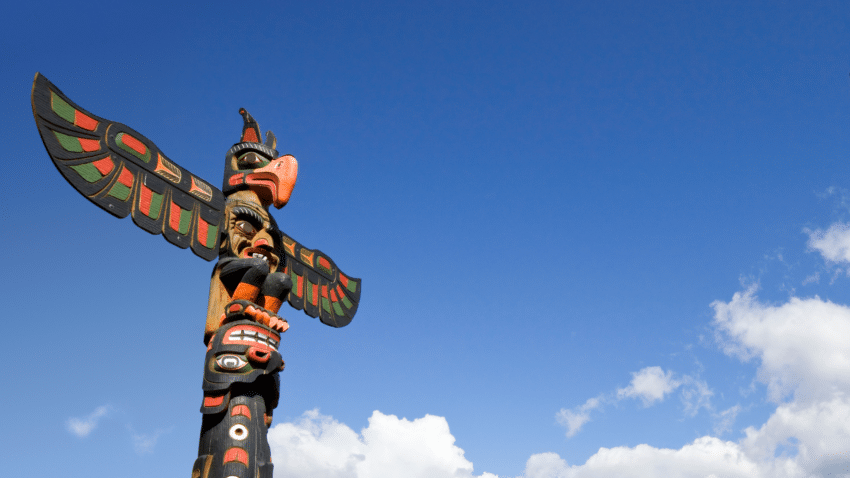
Immersing oneself in the local culture is made possible through tours or experiences led by knowledgeable locals. These insiders offer unique insights, hidden gems, and authentic encounters that enhance the overall travel experience. They help meet a growing demand for more immersive experiences that take travelers inside a location and culture and deepen their understanding of it. Hilton’s 2024 Trends Report found that many travellers will prioritize experiences (85%), exploring the unknown, trying local food, and learning about the local culture.
Indigenous experiences are still a growing trend. Countries around the world, such as Canada, Australia and New Zealand, are making an increased effort to reverse past wrongs when it comes to treatment of Indigenous peoples, while also empowering Indigenous communities to take a lead in areas like travel and tourism.
6. Transformational trips
A buzz phrase you heard a lot of in 2023 was “transformational retreat,” and 2024 looks likely to continue the trend. Booking.com’s 2024 travel trends report prompted them to label 2024 as a year that reinforced that “travel isn’t just an escape, but a catalyst for experiencing our best lives.”

A transformational trip is a travel experience designed around a specific activity, personal goal, or mental or physical health need. They can include retreats that cater to people who want to undergo a significant personal or spiritual transformation, or at least get away from it all in order to return refreshed. Retreats and activities include meditation, yoga, therapy, workshops, and other experiential practices. Most promote self-awareness, personal growth, and positive change, typically taking place in a secluded and peaceful setting and led by experienced facilitators or coaches.
Wellness vacations have been a growing tourism business trend for some time, with demand accelerated by the pandemic. Tours that offer people the chance to pamper themselves and generally recalibrate are likely to be extremely popular for the foreseeable future.
7. Quiet travel
Not everyone is looking for a transformational outcome from their vacation; many simply want to unwind and enjoy some quality “me time.” Continuing the 2023 trend, many people still want to unplug and undertake a “digital detox.” They could be seeking respite from “doom scrolling” through social media and news feeds on their digital devices, or they just want a break from the glowing screens so prevalent in their day-to-day.

Trips that encourage travelers to leave their devices at home will be popular, whether to a wellness retreats that bans or discourages digital devices, or an out-of-the-way destination that makes electronic communication extremely difficult. As well as digital detoxing, an example of a trend that is still going strong is forest bathing. This involves becoming immersed in nature to enhance physical, mental, and emotional well-being. It can be as simple as going for a long walk through a forest, or sitting by a lake and taking in the sights, sounds, and smells of the natural surroundings. Research has shown that forest bathing can reduce stress and anxiety, improve mood, and even boost the immune system and reduce blood pressure and heart rate.
8. Skip-gen travel
Deloitte’s “2024 travel industry outlook” report found that the baby boomer generation is getting back into the swing of things when it comes to traveling. This could be a factor in the emergence of a trend towards “skip generation trips” or skip-gen travel. This is when grandparents take their grandkids on vacation as a way for these two generations to bond and create some memories. Boomers can have more disposable income and more time, and parents with kids that can travel in this way appreciate the chance to travel on their own or just enjoy a break at home. All-inclusive resorts and other places with lots of activities for different generations are popular skip generation trips.
9. Solo travel
Of course, not everyone has a posse to travel with or wants to travel with others. Solo travel continues to be very popular and has moved from a niche to a mainstream market. A Skyscanner report found that 40 per cent wanted to travel solo for mental health wellness reasons, while singles and divorcees ranked highly for being ready to take a solo trip. The report concludes: “There is no longer any stigma attached to taking a trip on your own, and many tour companies cater specifically to this market.”
Arival ’s 2024 U.S. Tour Taker report found that the preference for independent travel increases with age, with 38 percent of people over 55 preferring to go it alone, compared with 26 percent of the 18-34 group. This indicates that older, more experienced travelers, who are often more affluent, prefer small group and independent travel. Women travelling on their own or with other women also continues to be a growing trend, with a number of tour operators dedicated to women-only trips.
10. Frontier travel

While it may sound like something out of the script for the TV show Westworld , frontier travel is a new travel trend for 2024 that takes travelers into wilder, more unusual destinations off the beaten track. This could mean grand adventures like following in the footsteps of great explorers across the Drake Passage to Antarctica or up Everest. Or it could mean taking a guided group trip to hike to and camp in a remote location or journey down a river by kayak or canoe.
These trips need a certain element of adventure and excitement, challenging travelers to get out of their comfort zone. This ties in with the transformational trip trend above, as people seek experiences that they will not only remember forever, but that could change them forever.
11. Hush trips, workcations, and micro-cations
In our 2023 report we highlighted the trend toward “hush trips” (when remote workers take a workcation without telling their boss) and workcations, when people travel abroad with the intention of combining a vacation with work. This kind of travel continues to be popular, and accommodation providers—from hotels to Airbnb apartments—often boast of dedicated work areas and other facilities for remote workers.
Many such trips are “micro-cations,” short trips often taken close to home, often at the last minute. The micro-cation trend has continued to grow for the last few years, as people look for quick, convenient, and often budget-friendly getaways that don’t require a lot of planning. When you combine the acceptance of remote working among many more employers with a large number of people who left the office behind and didn’t miss it for a second, you have an opportunity to create workcation and hush trip experiences for digital nomads and remote workers.
12. Traveling for “bleisure”
The tourism industry and travel press do love a good old portmanteau to describe the latest trend. Hot on the heels of workcations, the related trend of “bleisure” shows no sign of letting up. Bleisure is a name coined to describe the trend of business travellers tacking on some leisure time to the end of business trips or just taking their family along with them. Where a workcation is often a longer trip designed around work, the growth of bleisure trips reflects the fact that as business travel bounces back, people still want as much vacation time as they can get.
Deloitte’s “2024 travel industry outlook” report found that corporations are more concerned with costs than COVID now, but “trips to build client relationships and support team collaboration remain key to business success.” In fact, the report found that “US corporate travel spend is still likely to finally pass the pre-pandemic line within the next year.”
13. Set-jetting
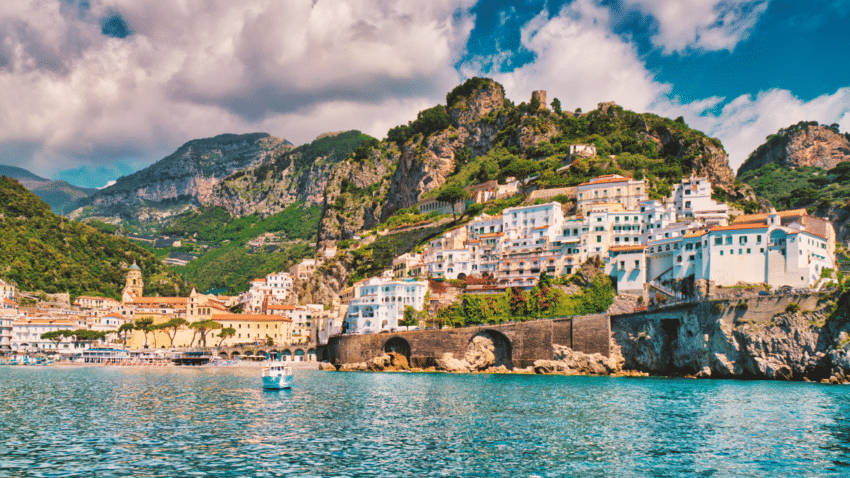
If you’ve ever wanted to visit the set of your favourite movie or TV show, you’re not alone. A top travel trend for 2023 that is continuing in 2024 is “set-jetting,” when travelers visit destinations primarily because they were featured in a popular movie, TV show, or book. According to research, 39 percent of travelers have booked trips to places featured on shows or movies ( Expedia ). While people have long been drawn to iconic movie locations, perhaps the earliest example of mass set-jetting was New Zealand’s tourism industry getting a huge boost after the country played a leading role in the “Lord of The Rings” movies. Fans of the “Outlander” books and TV series have also been making pilgrimages to Scotland to see the country that provides the backdrop for their favourite show.
People don’t just want to visit the actual physical set and filming location, but also just the cities or countries featured in a particular production. Popular shows where the location is as much the star of the show as the actors, such as “The Crown” (England,) “Emily in Paris” (Paris,) and “The White Lotus” (Sicily), have been credited with triggering a surge in demand for particular locations and experiences relating to the shows, such as a themed tour. And tour companies like Black Tomato have jumped on the trend to offer set-jetting itineraries .
14. Destination dupes
The economic upheaval we saw through 2022 and 2023 looks set to continue through 2024, . Inflation and cost of living rises mean while the desire to travel is still strong, many travelers will still have at least one eye on their budget. This has led to a new trend called destination dupes, when people seek out trips to locations that offer similar experiences to well-known or preferred locations, but that are more cost-effective.
Hotel giant Marriott commissioned a survey of over 14,000 travellers , and over 25 percent said they were choosing destination dupes in 2024. Examples of dupes include someone who lives in the US choosing a Canadian lake resort over an Italian Lakes destination. Here’s a good guide to popular holiday swaps for 2024 .
15. Coolcations
In the wake of rising temperatures and an increase in the number and intensity of wildfires in parts of North America, Europe and around the world, keeping cool is likely to be top of mind for many travelers in 2024—even among those who typically seek out the sun for their vacation.
Enter the “colocation.” Marriott’s survey found that over half of respondents would be considering climate change when planning their trips. Fifty-six percent said they were more interested in cooling down than baking in the sun. This makes areas like northern Europe a popular destination dupe as people look for similar attractions, such as culture, scenery, etc., to the hotter locations they might have chosen in the past but with a cooler climate.
16. Gig tripping
Just as the trend of people taking trips to sports and other events has grown, so too has this travel trend that is music to the ears of the travel industry. For example “swifties” from around the world are flocking to Taylor Swift concerts abroad, especially if tickets in their home country, especially the US, are hard to come by. CN Traveler called this the Swift Effect, as people travel to one-off gigs to see their favourite performer, as well as established (Glastonbury in the UK and Coachella in the US) and new (Untold in Romania) multi-day music festivals.
17. Sleep retreats

As we highlighted in our 2023 trends, everyone likes a good night’s sleep, especially on vacation, and the travel industry is waking up to the opportunities offered by a rise in “sleep tourism.” This trend continues to grow. Some travelers simply want a relaxing holiday with a comfortable bed and in an environment conducive to getting plenty of rest. For example, the Park Hyatt New York offers a stay in their One Bedroom Sleep Suite by Bryte . Others are taking advantage of a growth in technology geared towards helping people get their eight hours a night, and are booking “sleep retreats.” Swedish bed brand Hastens opened a branded Sleep Spa , and the HOTEL de LËN offers guests a “regenerative sleep experience.” Good night, sleep well.
These are just a selection of travel business trends for 2024 that could open up new opportunities for your tour business. For example, we haven’t even touched on how technology is changing the travel industry. And don’t forget traditional travel experiences, or in-destination activities. The Arival report highlighted that sightseeing tours, “hop-on, hop-off” experiences, and other tried and tested travel experiences and ways of seeing the sights are still going strong.
How to take advantage of innovative tourism business ideas
In an ever-evolving landscape of travel and tourism, the trends for 2024 reflect a desire for authenticity, sustainability, and immersive experiences. From eco-conscious adventures to culinary escapades and everything in between, travelers are spoilt for choice when it comes to exploring the world in new and exciting ways. Embracing these trends promises to enrich the travel experience and create lasting memories for adventurers of all kinds.
The key to taking advantage of these innovative tourism business ideas and other tourism industry trends is to always be thinking of your next profitable business opportunity. Here are a few ways to keep on top of what’s new and interesting in the travel business:
Maintain an ideas file
Include those “out there” trends that seem absurd the first time you hear them. Think about some recent innovations that would have been dismissed with a laugh not that long ago: Self-driving cars, passenger space travel, drone deliveries… Even that Holy Grail of futuristic inventions, the personal jetpack, is getting closer to reality. All but the most outlandish trends are worth tracking in case there’s a germ of an idea for a new business opportunity in there.
Listen to your audience
Hang out in online travel discussion forums, on social media, and in other places where travelers gather to swap notes and ideas or express needs and dreams. You might uncover a new business idea no-one else has come across yet.
Follow your competitors
Monitor what your direct competitors and others in the tourism business are up to. Subscribe to every industry newsletter you can, including those of your competitors, to keep up with emerging trends and help with your business idea generation.
Solicit customer feedback
Be proactive in asking your customers for feedback. Don’t just ask them what they liked and didn’t like about their experience with your company; ask them if there’s anything they would like to do that they currently can’t.
Invest in the right booking system

It goes without saying that every tour operator should offer online booking and take a mobile-first approach. Not doing both of those things makes taking advantage of the above trends very difficult. The customer experience starts the moment they enter your website. Online booking enables them to easily browse, book, and pay for tours anytime and from is anywhere. Learn more about how Rezgo booking software is tailor-made for adventure companies.
At Rezgo, we always have our ear to the ground when it comes to the latest tourism trends and business opportunities. The Rezgo booking system is a comprehensive platform that enables you to become a more

Written By | Rob Mathison
Rob Mathison is a Vancouver-based freelance writer focusing on tech, travel, digital marketing, and education. He is a co-author of The Complete Resident’s Guide to Vancouver.
Previous Article Promoting Travel Products With Google Things To Do
Next Article Rezgo Update 12.15: Powered Up Price Tiers, Meta Pixel Tracking, And More
Related Posts

Articles , Increase Online Bookings , Tourism Trends
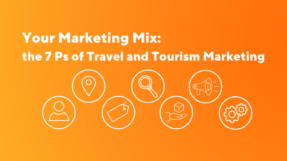
Articles , Increase Online Bookings , Marketing Strategies
Your marketing mix: the 7 ps of travel and tourism marketing.

Articles , Increase Online Bookings
How to create and promote amazing tour packages, search the blog.
- All Categories
- Tourism Trends
Most Popular Articles
- 17 Innovative Tourism Business Ideas and Trends for 2024 200 views
- Your Marketing Mix: the 7 Ps of Travel and Tourism Marketing 38 views
- How to Create a Business Plan for Your Tour or Travel Company 12 views
- How to Create and Promote Amazing Tour Packages 11 views
- A Guide to Branding in the Travel and Tourism Industry 7 views
I have read and agree to the Rezgo Privacy Policy
GET STARTED
Sign-up for a free demo.
Lorem ipsum dolor sit amet, consectetur adipiscing elit, sed do eiusmo tempor incididunt ut labore et dolore magna aliqua.
Schedule A Demo
Become a Member Enquire now
- Stay Ahead of The Industry With Pre-made Templates & Resources
- Business Planning
Business Plan (Template)
A good business plan can help your business secure finance, define the direction of your business, and create strategies to achieve your goals. A thorough and effective tourism business plan will include an executive summary, a business description, short and long term goals, business structure (legal and internal management structure), product or service description, a sales and marketing plan and financials to date. This Business Plan template steps you through the process of creating a solid, well-structured plan tailored to your business.
If you are preparing or updating your business plan for internal uses, the Business Plan template may be more than you require. The four critical documents to review and complete/update are:
Goals and Strategies
SWOT Analysis (Template)
Marketing Plan (Template)
Action Plan (Template)
Join or login for full access to member content
Subscribe to our free newsletter.
Keep up to date with all the latest news from Tourism Council WA.

To learn more about how becoming a Tourism Council WA member can elevate your business, get in touch with our friendly team.
Contact Info
+61 (08) 9416 0700
1 Resort Drive, Burswood, WA 6100
Upcoming events
- AGM & Network@Night
- Tourism Connect (Denham)
- Tourism Connect (Sunset Coast)
- 2024 Perth Airport WA Tourism Awards Gala Dinner
- Tourism Connect (Exmouth)
- Business Ideas
- Startup Plans
- Advertising
How To Start Travel & Tourism Agency Business
- by Olaoluwa
- October 26, 2022 August 28, 2024
TRAVEL AGENCY BUSINESS PLAN
Are you planning to start an online travel agency from home? Today, traveling has been much easier than it used to be a decade ago. There are many travel agencies these days taking care of everything that has to do with traveling.
Starting a travel agency at this present time won’t be a bad idea.
Travel agency provides a lot of services to clients starting from booking of flight, to find a good taxi, to booking hotels and resort reservation, to providing information about specific destinations.
If you have always had a love for traveling and providing traveling advice, you should start a travel agency so as to compliment your passion. Though relatively competitive, it is a very lucrative business and doesn’t require too much capital to start.
It is also an industry that is not affected by the economy because people must travel and some are too busy for the running around and so will need traveling agencies to do the running for them.
Here is a business plan for starting an online or home based travel business.
1. Conduct a Market Research and Find Your Niche
The travel agency is a vast industry with many niches. You have to conduct a market research to find out the kind of travel agency that is hot in the market and would suit you. Use the needs of the market to decide on the niche you should launch your travel agency in.
For example, corporate or academic travel may be what might be in high demand from a travel agency in your locality, but you won’t know until you conduct a market research. This will be helpful when choosing a travel business name to use .
During the research, also inquire about the startup cost for the niche that you might choose. Travel agency expenses are not more than office rent, office equipment like computer and phone lines, furniture and electricity.
So, don’t skip this step as if you do, you will find yourself to blame.
2. Check Local and State Laws
After you must have decided on the niche of travel agency you want to embark on, you need to make sure you are complying with the applicable laws concerning starting a travel agency.
Depending on your location, some paperwork will be needed to become established as a recognized business in your state. You will need to register your travel agency with the appropriate agents of government and apply for a Tax ID number.
Also, have it in mind that you will be needing a corporate account to operate this business.
3. Create a Travel Agency Business Plan
Not only does a business plan help you run your agency effectively, it also helps you secure funding from investors in the case you might need additional capital. If you will need financial backing from investors for your travel agency, your business plan must be professionally written to include a great deal of information.
Don’t rush into creating your business plan. Try to gather enough information before coming to conclusion.
Notwithstanding, if creating a business plan is something you are not sure of yourself that you can do, kindly outsource it to a professional business consultant.
Also, you may likely find samples of a travel agency business plan if you search online. There is also business plan software that can ease the process for you too.
4. Get a Location
I know you must have heard about home-based travel agency. Yes, they exist. But, check out the top travel agencies, are their offices located at home? if you want to join the top players in your market, you will need to get a location for your travel agency.
Contact real estate agent to find a good retail space for your business. Space should be large enough to accommodate clients while also housing furniture, marketing materials, and office equipment. There should also be enough car parking space too.
Location most suited for this kind of business is where the business is needed which include places like flight booking channels, hotels and airports. Your location should also reflect your brand image.
5. Market Your Travel Agency
You don’t just start a travel agency and sit down waiting for clients, you must market aggressively to your target clients. Making your business visible to the local people in your city is also a way to position your business for success.
You will need to have a promotional plan in place and be ready to spend money on the business card, logo design and also online marketing. Advertise your business in newspapers, billboard, hangout fliers etc.
Social media is still another channel you can use to market your business. you will have to create an account on social media platforms specifically Facebook, Instagram, LinkedIn, and Twitter. These are social sites your potential customers are always visiting. You should take your business to them.
Creating a website is also a must. This is where you will be directing your traffic from social media to so as to engage them with your content. A well- designed website conveys professionalism to potential clients and it is the best way to convert interested customers.
How to Start a Tourism Company
Do you have the mindset to start a tourism business but don’t have the confident to kick-start because you are not clear about some aspect of the business? Tourism business is a very profitable business if you are well-informed about the business and how you can make money with it.
Why Do People Travel
People travel from one town to another, one city to another, one country to another and one continent to another for different purposes. They include;
- Conferences: This can be academic, religious, economic and so on.
- Leisure: People travel for relaxation, to ward off stress, to initiate and complete a healing process.
- Health: People travel to get better medical assessment and assistance.
- Sports: People travel from place to place for sports.
Above are some of the reasons why people travel and hence promote tourism.
The tourism business is a broad business in the sense that there are many aspects of it. A person that want to start a tourism business will have to study the different aspects of the tourism business.
Tourism services are provided for tourists. A tourist can be said to be a stranger to the visiting environment and so will need assistance in performing almost all his/her activities in the said environment.
It is in providing these required assistance to a tourist that one can really start a tourism business and make money. A tourist will need assistance with:
- Accommodation
The hospitality aspect of the tourism business comes in handy here. A place to live for the time being is very fundamental to a tourist and so accommodation is a key need of tourists and this is why you need to start a tourism business.
Of course human beings need food to function maximally. Food business is a thriving sector of the tourism business.
The local cuisine of the environment can be well prepared and made available to tourists. Even the native cuisine of the tourists can be made available to make them feel at home.
- Transportation
Another reason why you should start a tourism business is because being a stranger in the environment, a tourist will need a reliable means of transportation to take him or her around to desired destinations. Flight tickets can also be booked for them.
- Language Translator
Sometimes, tourists go to countries with languages that he or she is not familiar with and therefore need a translator who understands both his or her language and the language of the environment. This is one way to make money from tourism business.
Most tourist, especially the ones traveling solely for leisure will need a person who is familiar with the terrain and sites of importance or places of tourist attraction as a guide to lead him/her around.
- Sales of Cultural Items/Goods
Most tourists want to take home some goods or items that are indigenous to the countries they visited. This is also a means of income to the tourism business. Local items and materials like clothing, footwear, jewelry, stationary and so on can be beautifully made and sold to the tourists at attractive prices.
- Local Entertainment
Every country is known to have their own cultural heritage and identity. This aspects of culture can be explored to be a source of income for the tourism business. The local dance of the people, local plays and so on can be performed to entertain the tourists.
Having mentioned the different ways of how to make money in the tourism business, it is now left for a person that wants to start a tourism business to decide on the aspect of the tourism business that he/she intends to focus on.
STARTING A TOURISM & TRAVEL AGENCY
Location is very important factor to consider in starting a tourism business. Most tourists want to see exciting sights and sounds. To start a tourism business , one has to be in a location that is easily accessible to tourists.
The environment where a tourism is located has to be such that visit regularly and one that geographically has a lot of tourist attractions. Environments with caves, rocks, stream, waterfalls, museums and so on are suitable environments to start up tourism business.
Tourism Business Plan
A business plan is a very important tool that will help a person intending to start a tourism business. A business plan is a document, more like a roadmap on how to start any business.
Aspects of the business that will be captured in the business plan include:
- The company profile
- The service/products to be offered
- The financial plan
- The marketing plan
- The unique selling point of the business
- The selling strategy and so on.
There are complete courses available for free on writing a business plan and an individual interested in starting a tourism business should study such courses as it will come in handy in providing a guideline for the success of the business.
There are authorities that control business startups and growth in the different sectors of the economy. These authorities issue licenses to business operators which enable them to run their businesses under the provisions of the law.
In starting a tourism business, the appropriate authorities should be contacted and the conditions that need to be met for a license to be issued to operated a tourism business should be taken into cognizance and met in order to obtain a license to start a tourism business.
The world tourism organization forecasts that international tourism will continue growing at the average annual rate of 4%. Did you hear that? 4%! What are you waiting for? Arise and take the steps above on how to start a tourism business and start rolling in the “bucks”!
How to Start an Online Travel Agency Working From Home for Free
Do you know how to become a home based travel agent? Here are the basic steps to becoming a successful travel agent from home.
The internet has increasingly changed the way work is done. This applies for a wide range of businesses including the travel industry.
If you seek to establish a travel agency business and also want to work from home, you can achieve both. This article will show to how to start an online travel agency working from home.
- What Products/Service will you be selling?
As a home based travel agency, you can still function effectively. But what type of services will you be providing? There are several of these travel products. These include car rentals, hotel and accommodation, and special packages such as cruises and incentive programs.
Guide: Ideas to Choose a Travel Agency Name
Other services and products include airline loyalty, travel insurance and emergency services and many more.
- A Business Partnership is Highly Essential
Operating a successful online travel agency requires partnership. This is the lifeblood of the business. But who are these partners? They consist of tour or activity providers. These are businesses which are on ground and will offer direct services to clients. Such include hotels or other types of accommodation arrangements, car hire services, flight companies, tour services and many others.
This partnership is bound by an Agency Agreement that allows you as the travel agency to resell their products.
Under such an agreement, the client or consumer pays for the service while you pay the net rates to the provider(s).
- Choosing a Host Agency
These agencies offer you the incentive of using its booking numbers, therefore presenting a unified front as a single agency. This is highly crucial for a new online travel agency business. The benefits of host agencies are enormous.
Any host agency you choose has its numerous benefits. Hosting agencies provide different business models. You get to choose which best fits your needs. Some host agencies require the payment of a one-time fee only. You get to retain every commission made.
Others charge a fee for each booking made without a commission split, while others will require a commission split.
- Advantages of Using a Host Agency
One of the major benefits of using a host agency is the low start-up requirement. It significantly lowers your cost of doing business. Others include ready support for your online travel agency, training, helpful tools, using its accreditation as well as access to its Seller of Travel (SOT) license.
In spite of its obvious benefits, there are those who would prefer not to use this option. If you are one of such persons, other options like joining a co-operation, operating independently or buying an online travel agency franchise are available.
- Patience is a Necessity
Starting an online travel agency as with other businesses requires a reasonable amount of time to stabilize. For a new business, it is usually challenging getting your first clients and maintaining steady patronage at the early stages. You will need to also understand that there are peak seasons. This means that apart from such periods, patronage is usually low even for established online travel agency businesses.
We recommend that you maintain your current job while gradually building your travel agency business. This is because if you depend on it for some income from the onset, you are likely to get disappointed. A lot of work is necessary to build a strong brand.
- Choice of a Niche
If you are surprised, you shouldn’t be. There are several online travel agency niches you can choose from. These can be effectively run from the comfort of your home. Some of these include wellness travel, specialty cruises, lifestyle or libertine travel, organized tours and special needs travel.
Others are women-only travel, travelers with pets, adventure travels, luxury travels and those for honeymooners. There are several more niches you can pick from.
It is necessary when picking a travel niche that you choose those with a higher demand. This should also align with your interest.
- Do you have a Source of Funding?
In other words, have you made adequate financial preparations for your proposed online travel agency business?
Luckily, running a successful online travel agency business from home will cut down significantly on funding. This is because you do not need a brick and mortar office. This takes up a substantial amount of your start-up costs.
With your computer and an internet connection, the funding requirement is significantly reduced. Having the right relationships are important to your success.
- Consider Sorting Out All Legal Issues
There are several laws that apply to different types of businesses. This includes travel agencies operating from home.
Such laws may vary from one state to the next. Whatever the case is, you should ensure that you abide by all stipulated guidelines. The legal structure of your business is also crucial to its smooth running or otherwise.
- Create Catchy and Effective Ads
Because your business is done entirely online, you should pay special attention to your marketing strategies. You need to create highly engaging ads with catchy infographic content. You may want to seek/hire the services of experienced graphic designers to get the job done. You also need marketing tips to sell your business to your target market.
- Is Your Business Deserving of Trust?
This is an important question that you will need to ask yourself. To build trust, you will need to establish a close relationship with your clients. A good thing with starting an online travel agency from home is that you set your pace. You should genuinely care for the needs of your clients.
In other words you should go the extra mile to satisfy your clients.
Once they know of your willingness to make them comfortable and happy, you would have won over some dedicated clientele.
We have discussed on how to start an online travel agency working from home . If you have followed to this point, you would see that there are definite steps that contribute to success.
Above all, your clients should not be taken for granted. Your whole aim should be to maintain the trust of these clients and to give them the picture of a reliable and well run business. The benefits are tremendous!
Related Posts
- How To Start Travel Agency Marketing [PLAN]
- How To Start Marketing Agency Business
- How To Start Digital Marketing Agency Business
- How To Start Talent Management Agency Business
- How To Start Transportation Business
Leave a Reply Cancel reply
Your email address will not be published. Required fields are marked *
- Starting a Business
- Growing a Business
- Small Business Guide
- Business News
- Science & Technology
- Money & Finance
- For Subscribers
- Write for Entrepreneur
- Tips White Papers
- Entrepreneur Store
- United States
- Asia Pacific
- Middle East
- United Kingdom
- South Africa
Copyright © 2024 Entrepreneur Media, LLC All rights reserved. Entrepreneur® and its related marks are registered trademarks of Entrepreneur Media LLC
Example of Tourism Business Ideas Do you love showing travellers the unique and interesting aspects of South Africa? Tourism could be the industry for you. Before you get started here are some lessons from current businesses you can incorporate into your start-up.
By Nicole Crampton Jul 24, 2019
You're reading Entrepreneur South Africa, an international franchise of Entrepreneur Media.
Since South Africa is known for its natural beauty, tourism will always hold numerous business opportunities, especially if you live in a popular tourist destination. Your business can offer everything from tours to accommodation and experiences.
Here are 10 examples of tourism businesses you can gain insights from before launching your own business:
1. Walking Tours
Do you love to explore your city on foot? Do you know all the hidden gems and interesting pieces of history? You could offer walking tours to tourists who want to genuinely experience this country.
Before you start mapping out your route, here is an example of this tourism business idea that can offer you insights into this industry:
Business Name: Walk & Talk Tours CC
Website: https://walktours.co.za/
Established Date: 1999
About the business:
Walk & Talk Tours CC aims to combine the pleasurable and therapeutic act of walking and talking. They want to introduce South Africa to not only tourists but also to South Africans, educating their clients about interesting areas of the country they wouldn't normally visit.
Innovative business offering
In addition to their walking tours, Walk & Talk Tours CC have a patented self-guiding system. This allows anyone to visit an area and gain information, tours, commentary, videos, pictures, apps and the history of the area.
2. Airbnb Rentals
Airbnb is a marketplace where you can rent out your spare room, or even your entire apartment or house. It caters to travellers looking for cheaper more interesting accommodation. Before you register your house on the platform, here is an example of an Airbnb host who you can learn from:
Business Name: Brigid Prinsloo
Website: https://www.airbnb.com/
Established Date: 2013
Brigid Prinsloo rented her spare room out on Airbnb. She started out with a very lean approach. At the end of that first month they had earned close to R10 000 renting the room out.
Related: 25 Of The Most Successful Business Ideas In South Africa
She purchased two more properties one with her fiancé and the other with her father and sister, which they also listed on Airbnb.
Innovative business offerin g
You'll need to create an experience for your guest. The better the experience the better the rating you'll get and the more customers you'll continue to attract.
3. Airbnb Experiences
Airbnb Experiences are unusual and engaging activities that you can offer through the Airbnb marketplace for travellers coming to your area. Experiences go above and beyond regular tours by immersing guests in a unique activity.
If you have something you can teach or guide visitors through, this could be the tourism business idea for you. Before you launch your start-up, here is an example of a tourist business you can learn from:
Business Name: Carving Cape's Single-track with a Pro
Website: https://www.airbnb.com/experiences/123771
Paris Basson has over 25 years in the sports industry. He has raced all disciplines from Road, MTB, CX, Enduro and Triathlon's. He offers a once in a life time experience biking through the Table Mountain National Park, offering an adrenaline packed adventure and views of the Cape like no other.
Paris Basson has such an in-depth knowledge of the area and which routes suit the various experience levels of his clients that he can custom make a route to ensure every customer has the best experience.
4. Local Cuisine Cooking Class
Do you love to cook local food? Do you enjoy teaching others how to make interesting and unique meals? This could be the tourism business idea for you. Before you start cooking, here is an example of a tourism business you can gain insights from:
Business Name: Sazón Cooking School
Website: https://www.belmond.com/hotels/north-america/mexico/san-miguel-de-allende/belmond-casa-de-sierra-nevada/
Sazón Cooking School is hosted in a magnificent 18 th - century mansion. Here their guests can study the bold flavours and rich history of regional culinary Mexican favourites. They also offer to teach their guests techniques to creating these flavourful dishes.
In addition to the cooking class Sazón is based in a heritage hotel offering its clients accommodation in the Mexican heartlands. They also offer market tours and classes to help their customers navigate the colourful and vibrant San Miguel Market.
5. Souvenir Shop
Do you love making something uniquely South African or African? Then this could be the tourism business idea for you. Here is an example:
Related: 11 Uniquely South African Business Ideas
Souvenir shops offer visitors locally inspired gifts they can take home to remember their experience. You can open one to ensure visitors always remember their incredible stay in South Africa.
Business Name: A Place To Shop
Website: https://www.aplacetoshop.co.za/
A Place To Shop offers fun and quirky South African and African souvenirs for both locals and travellers. They offer international delivery for those looking to purchase something African from across the ocean.
Some of their products are available for resell, this would increase their profits and ensure their products reached a larger audience.
6. An Airbnb Management Company
For people who have started listing multiple rentals, managing them can be quite a task, which is where Airbnb Management Companies came from. These tourism businesses assist with the day-to-day renting out of spaces on Airbnb.
Before you start advertising your services, here is an example of a business you can learn a few tricks from:
Business Name: Superhost South Africa
Website: http://superhostsouthafrica.com/
Established Date: 2015
Superhost South Africa is a full-service Airbnb property manager, they deal with the daily logistics and are on call 24/7 in case of emergencies. They offer everything from setting up their clients initial Airbnb profile to cleaning once the guest has left.
In addition, Superhost South Africa also offers ongoing optimisation to continually improve their client's listings, its profile and the service they deliver.
7. Fashion Mini-bar
In hotels across the world you typically get mini-bars that offer alcohol, cool drinks and snacks. But you could also offer a Mini Fashion bar; which visitors can pay for when checking out.
Related: The Ultimate 101 List Of SA Business Ideas To Get You Started
This ensures that those on a busy trip can still get some shopping done even if they never leave their hotel room. Before you start phoning hotels, here is an example of this business you can gain some insights from:
Business Name: Pimkie
Website: https://www.pimkie.it/
French clothing brand, Pimkie created a boutique bar filled with clothes and accessories to assist travellers in finding new clothing items and accessories to wear, particularly if they've forgotten to pack something.
Travellers can rent or buy the pieces they need and simple pay for them on check out. Guests can even call the Fashion concierge to source an item in their size.
8. Translators
Do you speak multiple languages? Then this could be the tourism business idea for you. You can help foreign tourists navigate South Africa by translating for them. Before you launch your start-up, here is an example of a tourism business you can learn strategies from:
Business Name: Language Connect
Website: https://www.languageconnect.net/sectors/travel-tourism/
Language Connect helps their clients to communicate seamlessly with their foreign guests and ensures the personal touch by offering services in multiple languages.
In addition, they also offer to translate their client's website, promotional videos, email campaigns, telephone message systems, advertising, brochures, menus, stationery and amenities into numerous languages.
9. Cultural/Heritage Tours
Do you have a vast knowledge of the culture and heritage in your area? Could you lead a cultural/heritage tour group? Then this could be the tourism business idea for you.
Related: Your Free Business Idea Evaluation SWOT Analysis Template
Here is an example of a tourism business that you can learn from before you start your business:
Business Name: Kruger National Park
Website: http://www.krugerpark.co.za/Krugerpark_Travel_Guide-travel/cultural-heritage-sites.html
Established Date: 1926
Kruger National Park is home to numerous historical locations and prehistoric rock art giving it a rich cultural heritage. They offer cultural tours for guests wanting to see restored villages and learn about the inhabitants' way of life.
In addition, the Kruger National Park is South Africa's most exciting African safari destination. They have a variety of safari tour options and can take their guests on a journey of exploration to find Africa's Big Five .
10. "Takeaway' Hotel Rooms
If you are good at building and designing rooms, you can create mini hotel rooms using shipping containers and plant them where ever your guests want to stay. Before you start purchasing containers, here is a tourism business that you can gain insights from:
Business Name: Scandic To Go
Website: https://www.scandichotels.com/landing-pages/scandic-to-go
Established Date: 2014
The Scandic To Go rooms are 18 sqm and offer all the amenities of a traditional hotel room, except that it can be moved to any pre-selected destinations. This allows a unique and one-of-a-kind experience for their guests.
In addition to offering the Scandic To Go rooms, they are a high-quality hotel brand that operates predominately in the Scandinavian countries, but also in Germany.
Related: A Free Business Plan Example to Launch Your South African Business
Entrepreneur Staff
Sales Enablement - Content Developer
Nicole Crampton is an SEO specialist who contributes to Entrepreneur.com/za. She has studied a BA Journalism at Monash South Africa and has continued her studies with a Creative Writing degree from UNISA. Nicole has completed several courses in writing and online marketing, and continues to hone her skills and expertise in digital media, digital marketing and content creation.
Most Popular Red Arrow
Most problems fall into 1 of 3 layers — here's how to effectively approach each one.
In entrepreneurship, not all problems are created equal. I've found that there are three layers of problems, and each one requires its own type of solution — here's what they are and how to approach each one.
Unleash Unshakable Confidence in 7 Days: The Neuroscience-Backed Blueprint
In the cut-throat business world, self-doubt can be the difference between success and failure, costing you everything.
How Business Leaders Can Take Control of Their Business With Data
Vertical integration allows leaders to see the full picture of their business — from customer to creative.
This Web3 Data Warehouse Wants to Bring Big Data Analytics to the Blockchain
The co-founder and CEO of Space and Time talks about his company and why blockchains matter.
3 Reasons Why You Need Data To Scale Your Company
Let's look at how data awareness helps you build a scalable enterprise, pull the data together and leverage it to drive strategic decisions that lead to growth.
From Mundane to Magic: The Incredible Benefits of Automation for Small Business Owners
Automation can give small business workers back hours for what they enjoy, all while improving the ability to scale.
Successfully copied link
EXPLORE ARTICLES
- Time Management
- Content Marketing
- Social Media Marketing
- Email Marketing
- Influencer Marketing
- Content Creation
- Content Writing
- Copywriting
- Business Ideas
- Affiliate Marketing
- Career Development

Chitra Samaroo
Business of Tourism: What You Need to Know
Table of Contents
The business of tourism is a powerful engine for economic growth , connecting industries and creating jobs worldwide. Whether you’re involved in hospitality, travel, or event management, this sector offers many opportunities.
Tourism’s impact is undeniable, from boosting local economies to shaping global trends . This article will explore the benefits, management strategies, and real-world examples of how tourism works. Grasping these elements is essential for anyone succeeding in this ever-evolving industry.
What is the Business of Tourism?
The business of tourism is a broad industry that involves travel, hospitality, and experiences designed to attract visitors to various destinations. It plays an important role in local and global economies by creating jobs, supporting businesses , and promoting cultural exchange. At its core, the business of tourism is about providing services that make travel enjoyable and convenient for people.
Connecting Different Sectors
One of the defining features of the business of tourism is how it connects various sectors. Tourism combines hospitality services like hotels, resorts, and restaurants with transportation, entertainment, and retail businesses. These industries work together to create seamless travel experiences for tourists.
Whether someone is visiting for leisure or business, they rely on different services , and each contributes to tourism’s success. For example, a tourist visiting a city might stay in a hotel, dine at local restaurants, and participate in guided tours or cultural activities. Behind the scenes, travel agencies, airlines, and other transport providers are involved. The business of tourism creates a network of industries working together to deliver value.
The Role of Hospitality
Hospitality is at the heart of the business of tourism. Hotels, resorts, and other accommodations are the backbone of the tourism experience, providing comfort and convenience . Many businesses in the hospitality sector focus on delivering exceptional customer service to attract repeat visitors. Restaurants, cafes, and bars also play an enormous role, offering local flavors and unique dining experiences that enhance a tourist’s stay.
The Impact of Travel
The business of tourism relies heavily on transportation. From airlines to taxis, transportation allows people to explore new destinations. As tourists travel, they spend money on accommodations, dining, entertainment, and more, benefiting local businesses. This flow of visitors supports economies and creates jobs in areas that may rely heavily on tourism income.
How Does the Business of Tourism Benefit the Economy?
The benefits of tourism to the economy are significant and wide-reaching. Tourism contributes to economic growth, from creating jobs to generating revenue for local businesses . Whether it’s a popular tourist destination or a small town, the benefits of tourism to the economy can help communities thrive and develop.
Job Creation
One of tourism’s main benefits to the economy is job creation . Tourism supports various hospitality, transportation, and entertainment employment opportunities. Hotels, restaurants, and tour companies often rely on a steady stream of tourists to maintain their workforce. Additionally, jobs are created in industries that support tourism, such as construction, retail, and event planning. These jobs provide income for residents and help reduce unemployment, especially in regions heavily reliant on tourism.
Revenue Generation
Another benefit of tourism to the economy is revenue generation. Tourists spend money on accommodations, food, transportation, and entertainment. This spending boosts local economies by increasing business sales and generating tax revenue for governments. Many countries and cities rely on tourism as a significant source of income, using the money to improve infrastructure, fund public services, and promote future growth.
For instance, popular tourist destinations often invest in improving roads, airports, and public transportation to accommodate increasing visitors . This creates a cycle in which tourism supports economic development, and enhanced infrastructure attracts more tourists.
Supporting Local Businesses
Tourism also helps local businesses grow by bringing in a steady stream of customers. Small shops, restaurants, and local tour operators often benefit the most from tourism. As visitors explore new places, they spend money on local products and services, boosting profits for small businesses. The benefits of tourism to the economy can be especially noticeable in rural or less-developed areas, where tourism may be one of the few significant industries supporting local livelihoods.

What is the Business of Tourism Management?
The business of tourism management involves overseeing the operations, customer experience, and planning within the tourism industry. Successful management ensures that all parts of a tourism business work together smoothly to create memorable travel experiences while maintaining profitability.
Managing Operations
One key aspect of the business of tourism management is handling day-to-day operations. This includes managing accommodations, tours, transportation, and other services tourists rely on. Efficient operations management ensures that everything runs on time, resources are used effectively, and customers receive the services they expect. From coordinating hotel staff to organizing group tours, operations management plays a central role in keeping tourism businesses running smoothly.
Customer Experience
Enhancing the customer experience is a critical part of the business of tourism management. Tourists expect quality service, comfort, and convenience throughout their trip. Managers in the tourism industry must ensure that their services meet or exceed customer expectations. This involves everything from training staff in customer service to ensuring facilities’ cleanliness and transportation reliability. A great customer experience encourages repeat business, positive reviews, and lasting loyalty. These factors are crucial for success in the tourism industry.
Strategic Planning
Strategic planning is another essential element of the business of tourism management. This involves setting long-term goals, analyzing market trends, and creating strategies to attract more tourists. Managers need to be aware of changing customer preferences, shifts in global travel patterns, and new competition in the market. Tourism managers can ensure their businesses remain competitive by making informed decisions about marketing, pricing, and product offerings. Planning for growth, improving services, and staying updated on industry trends are vital responsibilities for those in the business of tourism management.
What is the Business Model of Tourism?
The business model of tourism refers to the structure and strategies tourism businesses use to generate revenue, deliver services, and engage with customers. Different tourism businesses follow various models depending on their size, target market, and the types of services they offer. Understanding the business model of tourism helps businesses remain competitive and profitable.
Revenue Streams
Revenue generation is a core element of any business model of tourism. Tourism businesses earn money through a variety of channels. Hotels and resorts, for instance, rely on room bookings, while travel agencies may earn commissions from booking flights, accommodations, and tours.
Additional revenue can come from offering premium services like guided tours, spa treatments, or exclusive dining experiences. Some businesses also charge for experiences like adventure activities, cultural events, or transportation services. Diversifying revenue streams helps ensure a stable income, even during off-peak travel seasons.
Services Offered
Another essential part of the tourism business model is the range of services offered. Tourism businesses provide everything from basic accommodation and transport to more personalized services such as travel planning and tailored experiences. Successful tourism businesses tailor their services to match the needs and preferences of their target audience.
For example, luxury resorts offer premium amenities like private pools and exclusive dining, while budget hotels focus on providing affordable and comfortable stays. A well-designed service offering is critical to attracting different types of tourists and meeting their expectations.
Customer Engagement
Engaging customers is a vital aspect of the tourism business model. This involves building strong relationships with travelers through marketing, customer service, and personalized experiences.
Many tourism businesses use online platforms, social media, and travel apps to stay connected with their customers before, during, and after their trips. Positive customer engagement leads to repeat business and helps generate word-of-mouth recommendations and online reviews, which is essential in today’s travel industry.

How Do Hospitality and Tourism Connect in the Business of Tourism?
The hospitality and tourism business is closely intertwined, with every sector playing an important role in providing travelers with enjoyable and comfortable experiences. While tourism focuses on the movement of people from one destination to another, hospitality ensures that visitors have access to accommodations, food, and other essential services during their stay.
The Role of Hospitality in Tourism
Hospitality is a vital component of the hospitality and tourism business. Hotels, resorts, restaurants, and other hospitality services provide the foundation for any travel experience. When tourists visit a destination, they rely on these services for comfort, convenience, and relaxation.
Whether it’s a luxury hotel or a budget-friendly hostel, the quality of hospitality can significantly affect a tourist’s overall experience. By offering excellent service, comfortable accommodations, and great dining options, the hospitality industry helps enhance a destination’s appeal.
Enhancing the Travel Experience
The business of hospitality and tourism works together to enhance the travel experience. Tourists often visit new places to see the sights and enjoy the local culture, food, and activities. Hospitality businesses play an essential role in delivering these experiences.
Restaurants offer local cuisine, hotels provide comfortable stays, and tour operators often partner with local hospitality providers to ensure visitors have a well-rounded experience. This synergy between tourism and hospitality creates memorable experiences for travelers, which leads to positive reviews, repeat visits, and word-of-mouth recommendations.
Supporting Local Economies
Hospitality and tourism businesses also support local economies. When tourists spend money on hotels, restaurants, and entertainment, they generate revenue for local businesses. This income helps boost the local economy and create jobs in various sectors.
Many tourism destinations rely heavily on the hospitality industry to cater to visitors’ needs, making the connection between these industries essential for economic growth. Tourism draws people in, while hospitality ensures they stay and enjoy the destination, creating a mutually beneficial relationship that fuels the local economy.
What is an Example of Business of Tourism in Action?
What is an example of a business of tourism? The business of tourism refers to the management of services that cater to travelers, including accommodations, transportation, dining, and attractions. In business tourism, professionals travel for work-related events like conferences, meetings, or exhibitions. Let’s look at real-world examples of how the business of tourism plays out, focusing on events and corporate travel.
Conferences and Their Economic Impact
A classic example of the business of tourism is the influence of large conferences on local economies. For instance, the Mobile World Congress in Barcelona attracts thousands of tech professionals worldwide.
This event drives business tourism by boosting hotel bookings, restaurant reservations, and local transport use. It is a strong example of the business of tourism, where a major event brings financial benefits to the host city and facilitates global business networking.
Corporate Travel: A Constant Revenue Stream
Corporate travel is another important example of the business of tourism. For example, executives from an international company might travel for strategy meetings or to finalize business deals in a foreign country.
They utilize services like hotels, taxis, and restaurants during these trips. This type of travel supports the local tourism industry while fostering cross-border collaboration. Corporate travel provides consistent demand for hospitality services, benefiting tourism year-round.
The Cricket World Cup: A Global Tourism Magnet
Another example of the business of tourism in action is the Cricket World Cup. This event draws fans and teams from around the globe, filling hotels, restaurants, and local attractions in host cities.
The Cricket World Cup attracts spectators, media crews, sponsors, and corporate partners, all contributing to the local economy. This global event showcases how sports can drive business tourism, creating significant city revenue through increased demand for hospitality services and related industries.
The Impact and Importance of the Business of Tourism
The business of tourism plays a significant role in shaping local economies and creating opportunities across industries. From conferences and corporate travel to large-scale events like the Cricket World Cup, tourism connects various sectors such as hospitality, transportation, and entertainment.
The business of tourism helps boost job creation, generates revenue, and supports local businesses, while strategic management ensures smooth operations and memorable customer experiences. Whether through corporate travel or major global events, the business of tourism creates value for destinations and industries worldwide, highlighting its far-reaching impact on economies and business growth.
What is the business of tourism?
The business of tourism refers to the collection of industries and services that cater to travelers. This includes accommodations, transportation, entertainment, and hospitality, all working together to provide enjoyable travel experiences.
How does the business of tourism benefit the economy?
Tourism benefits the economy by creating jobs, generating revenue, and supporting local businesses. It drives economic growth by attracting visitors who spend money on accommodations, food, and entertainment.
What is the business of tourism management?
The business of tourism management involves overseeing operations, improving customer experiences, and planning for future growth in tourism businesses. Managers ensure that hotels, travel agencies, and related services run smoothly and deliver high-quality experiences to travelers.
What is the business model of tourism?
The tourism business model focuses on how tourism businesses generate revenue and provide services. Revenue streams can come from accommodation bookings, tour packages, transportation, and premium services like guided tours or exclusive dining experiences.
How do hospitality and tourism connect in the business of tourism?
The business of hospitality and tourism is closely linked. Hospitality services such as hotels and restaurants form the foundation of the tourism experience. Hospitality ensures that tourists have comfortable places to stay, eat, and relax.
Related Articles
No other posts in this category

Create a Memorable Social Media Experience
Get the content planner that makes social media 10x easier.

Avoid These Common Email Marketing Mistakes
Keep your email subscribers engaged and ready to buy.

Maximize Your Brand and Make Your Mark
Custom brand assets will take you to new heights.

- Entertainment
- Investigations
- Latest Headlines
- Robert Telles Trial
- Top 100 Restaurants
- Things To Do In Vegas
- What Are They Hiding?
- Election 2024
- Israel at War
- 2024 Election
- Clark County
- Nation and World
- Science and Technology
- Road Warrior
- Las Vegas Weather
- East Valley
- North Las Vegas
- Summerlin/Centennial Hills
- Remembering Oct. 1, 2017
- Deborah Wall
- Natalie Burt
- Remembering Jeff German
- Police Accountability
- Alpine Fire
- 100 Years of Growth
- Dangerous Driving
- Raiders News
- Golden Knights
- UNLV Football
- UNLV Basketball
- Nevada Preps
- Sports Betting 101
- Las Vegas Sportsbooks
- On TV/Radio
- MMA and UFC
- Casinos & Gaming
- Entrepreneurs
- Real Estate News
- Business Press
- Sheldon Adelson (1933-2021)
- Debra J. Saunders
- Michael Ramirez cartoons
- Victor Joecks
- Richard A. Epstein
- Victor Davis Hanson
- Drawing Board
- Homicide Tracker
- Faces of Death Row
- Kats’ Cool Hangs
- Arts & Culture
- Home and Garden
- Las Vegas Hiking Guide
- RJ Magazine
- Today’s Obituaries
- Submit an obit
- Dealer News
- Classifieds
- Place a Classified Ad
- Provided Content
- Real Estate Millions
- Internships
- Service Directory
- Transportation
- Merchandise
- Legal Information
- Real Estate Classifieds
- Garage Sales
- Contests and Promotions
- Best of Las Vegas
- Nevada State Bank
- Verizon Business
- Touro University
- P3 Health Partners
- Find My Forever
- Ignite Funding
- Travel Nevada
- Subscriptions
- Newsletters
- Advertise with Us
- >> Business
- >> Tourism
American Airlines to end nonstop flights from Vegas to this Texas city
The airline’s plan to add nonstop flights to 45 cities, including Las Vegas, from this city began as an experiment during the coronavirus pandemic

American Airlines will end its nine weekly nonstop flights between Harry Reid International Airport and Austin-Bergstrom International in Austin, Texas, next month.
American experimented with nonstop flights between the two cities during the coronavirus pandemic. But now that pandemic travel recovery has declined, the Charlotte, North Carolina-based carrier — the third busiest at Reid with an average of 38 arrivals and departures a day — will return to its hub-and-spoke strategy of mostly flying nonstop to its hub cities, including Phoenix, Los Angeles and Dallas-Fort Worth.
The airline was also getting labor union pushback to its Austin growth, which peaked at routes to 45 cities in 2023, because of its close proximity to its Dallas-Fort Worth hub.
American passengers can still fly to Austin with one-stop options and several airlines will continue to serve the market with nonstops.
The route is dominated by Southwest Airlines, which offers 41 flights a week between Reid and Austin. Other carriers that serve the market include Delta, Frontier, Spirit and Allegiant.
Contact Richard N. Velotta at [email protected] or 702-477-3893. Follow @RickVelotta on X.

Truist Securities analyst says his company’s room rate survey shows November race isn’t measuring up to 2023 inaugural race.

The Tropicana casino-hotel’s impending implosion is expected to attract plenty of curious onlookers.

Work crews will again remove the trees in front of the Fountains of Bellagio along Las Vegas Boulevard, as part of race preparations for the Las Vegas Grand Prix.

Tier-matching, or status-matching, is a popular promotional tool for casino operators to entice new customers and lure gamblers away from the competition.

Discount carrier Norse Atlantic Airways has a fleet of Boeing 787 jets to fly passengers to and from London’s Gatwick International Airport three times a week.

When three casinos opened on the Las Vegas Strip in 1999, it marked the first time in the corridor’s history that a trio of new mega-resorts debuted in a single year.

The Review-Journal recently sat down with the Rio’s new CEO while the property was nearly complete with its $350 million renovation.

Sponsorship will enable LVCVA to advertise Las Vegas to the U.K.’s NFL football fans and to include glimpses of Las Vegas to the British audience.

A television ad that debuted during Sunday’s Modelo Kickoff Classic football game between Louisiana State and USC includes mascots and face-painted fans going to an event.

In order to allow advertising and banners on Las Vegas Boulevard, the LVCVA needed to certify the race’s $250 million economic impact on Las Vegas.
- Share full article

Looking for a New Way to See Iceland? Bring Your Knitting Needles.
In a country with more sheep than people, a D.I.Y. wool journey — from sheep farms to yarn shops — makes perfect sense. Our writer brushes up on her knitting on a driving trip from Reykjavik.
Sheep graze near the Ring Road in west Iceland. With about 10 times more sheep than people, Iceland is drawing tourists interested in one of the country’s most popular crafts: knitting. Credit... Sigga Ella for The New York Times
Supported by
By Lisa Abend
- Sept. 16, 2024
I spent my second day in Iceland in a hotel on the outskirts of Reykjavik, trying resolutely to knit. Gathered around a coffee table with me were Ragga Sjöfn Jóhannsdóttir, my instructor, and my friend Lindis Sloan, both experienced knitters who fluidly worked the yarn with barely a glance at their hands.
And then there was me, gripping the needles as I struggled to maintain the proper tension that would allow me to transform two skeins of local wool into something resembling a headband. My progress was excruciatingly slow, but a couple of hours in, a red ring of textile with pink diamonds was beginning to emerge.

Then Ragga noticed a mistake I had made in a previous row. Taking the needles, she began ripping out my hard-earned stitches. “If you can’t unravel,” she said with a jolly laugh, “you can’t knit.”

It was a counterintuitive way of spending a vacation in Iceland. Most people travel to the island nation for steamy soaks in the milky waters of the Blue Lagoon or nighttime treks to see the northern lights. But in a country with a deeply ingrained craft tradition, a climate conducive to sweaters, and about 10 times more sheep than people, knitting tourism is on the rise.
Hélène Magnusson is largely responsible for the development. Half-French, half-Icelandic, Ms. Magnussen is a pattern designer known for work that blends traditional Icelandic and modern styles. She also organizes tours that take a deep dive into Icelandic wool culture, including visits to sheep farms, spinning factories and dyeing studios. And because she is both a former hiking guide and a designer inspired by nature, her tours include an outdoor element like hiking or horse riding.
“Why would you come to Iceland and not move?” she said.
But at the core of the tours is the time set aside to sit somewhere cozy and knit. “Three or four hours a day together, knitting, you make some good friends,” Ms. Magnusson said.
A knitting paradise
Ms. Magnusson wasn’t offering tours when I was in Iceland, but she talked me through her itineraries so I could put together a D.I.Y. version. I invited Lindis, who is from Norway, another country that takes wool seriously.
Just how seriously Icelanders take it quickly became clear in Reykjavik, where at least one 24-hour grocery store stocks shelves of yarn for 2 a.m. knitting emergencies. A knit-goods paradise, the capital has plentiful yarn stores and outlets selling finished garments — from contemporary designers to secondhand stores where legions of ungrateful Icelanders consign the Christmas gifts their grandmothers have painstakingly crafted for them.
But the mecca for classic Icelandic sweaters is the Handknitting Association’s shop . With its floor-to-ceiling shelves crammed with fuzzy cardigans and pullovers, it is the embodiment of options paralysis, so I was grateful when Marta Makuchowska, who works there, helped me navigate it.
Ms. Makuchowska, who is from Poland, moved to Iceland to go to university, and ended up not only writing her thesis on the knitters’ cooperatives, but learning to knit “lopepeysa” — the typical Icelandic sweater made from thick, unspun yarn called lopi and knit with an intricate circular pattern at the yoke. “It was a good way to fit into Icelandic culture,” she explained.
A true Icelandic sweater must be handmade, and cooperatives like the Handknitting Association act as a guarantor of quality. Founded in the 1970s to increase the bargaining power of women supplementing the family income, the association requires potential members to audition (with a sweater) and ensures that their work meets strict criteria: It must be made with wool from Icelandic sheep, conform to approved patterns, and be knit in Iceland.
Learning the craft
Based on Ms. Magnusson’s advice, Lindis and I devised a plan: Drive north along the coast to Blönduós, home to the country’s main wool-washing facility and its only textile museum, then cut inland and return south, where there are a handful of wool-related cottage industries.
First, however, I had to learn to knit.
Which is where Ms. Sjöfn Jóhannsdóttir came in. A retired schoolteacher, she holds four-day workshops for experienced knitters and shorter sessions for beginners. I was not a novice, but my technique is terrible, and I’m intimidated by anything more complicated than a purl stitch. I was counting on my Icelandic wool journey to help me overcome those obstacles.
Ms. Sjöfn Jóhannsdóttir had firm ideas about technique but a warm pedagogic style gleaned from decades of teaching math and crafts (Icelandic children learn to knit in school). Starting me on that headband, she showed me how to cast on stitches, and how to unite them on round needles so that, in the typical Icelandic style, the finished garment would have no seams.
I found the work painstaking, and it was difficult to imagine that I would ever achieve the grace with which both she and Lindis were rapidly assembling sweaters. But I managed to reknit a row or two before the end of the workshop, and after a restorative lunch of Icelandic smoothie bowls, I promised my teacher I would keep trying.
Going north
The following day, Lindis and I headed north. In Bogarnes, we stopped at Ljómalind , a cooperative where brightly colored sweaters shared shelf space with jars of rhubarb jam, earrings carved from ram horns and a freezer full of lamb parts.
Later, near the white clapboard church of Hvanneyri, we found the Ullarselid cooperative . Inside, Hugrún Jóhannsdóttir, an avid knitter and Viking re-enactor (with the Runic tattoos to prove it), explained that the cooperative had been founded in 1992 to teach wool-working at the agricultural school, and “to prize women’s work.”
Inside, sweaters are shelved depending on whether the yarn is dyed or “sheep-colored.” Lindis gravitated to the yarn section, where I found her petting a skein of handspun longingly. “I get it,” Ms. Jóhannsdóttir said. “There’s a kind of witchcraft to textiles.”
When we reached Blönduós a couple of hours later, I found myself wondering if the hands that would have fit into the antique mittens on display at the Textile Museum didn’t suffer from another kind of bewitchment: They each had two thumbs. But no, explained the docent, these were Nordic fishermen’s mittens. If the palm got wet, the wearer could simply turn the mitten around and wear it from the other side.
Because shearing season was over, the Istex wool-washing facility, which cleans much of the country’s raw fleece, was closed. With nothing to do until dinner, we retired to the hotel bar, where we ordered wine and watched the steel-colored sea outside the windows for passing whales. When Lindis pulled out her needles, I surprised myself by doing the same. Suddenly, the notion of traveling halfway around the world to sit in a room and knit made a lot more sense.
Coaxing dyes from plants
We returned to the south the next day, and headed toward Selfoss. Our first stop was Hespa , a one-woman dyeing studio in Gudrún Bjarnadóttir’s home. We walked into her kitchen, where a not entirely pleasant aroma wafted from pots overflowing with yarn being steeped in various hues.
Ms. Bjarnadóttir, who also offers workshops, obtains her dyes from nature. As a graduate student researching the historic applications of wild plants in Iceland, she learned they were used to produce colors. “At that point,” she said, “I completely lost control.”
Today, that loss of control manifests itself in the astonishing array of shades she coaxes from plants, many indigenous. The lupine that carpets the countryside in summer yields a strong yellow. Lichen, which Ms. Bjarnadóttir has a permit to forage from a location she keeps secret, produces a range of browns. Green requires extra intervention: The dyer must add copper — a penny or a bit of wire — to get moss’s colors to stay. The excess onion skins the local supermarket saves for her produces yellows and rust. “I dye with the same process as people did in the old days, but with better equipment,” Ms. Bjarnedottir said.
Better, and less stinky. To get the ammonia needed to fix colors, Icelanders traditionally used aged cow urine. “You would need 40 gallons at a time, so they used to tickle the cows to get them to pee,” she said. “Then you had to let it age for three weeks.”
A slow process
The theme of time kept popping up. Wool-working might be a cornerstone of Icelandic culture, and handcrafted textiles might remain an important export, but the vast amount of time required to produce a handmade knit means that the people — mostly women — who produce the work cannot earn enough to ever have it be more than a hobby.
At the Thingborg cooperative, an adult lopi sweater, handmade by one of its 65 knitters, sells for around $250, of which the knitter gets 60 percent. It will have taken her anywhere from 14 to 25 hours to create, and she must buy her own yarn.
“You could knit all day long and would earn wages that are not even close to being legal,” Magret Jonsdottir, who runs Thingborg, said. Some cooperatives have petitioned the Icelandic government to exempt handcrafted textiles from the value-added tax.
You start with the sheep
We had one more stop. At Uppspuni , Hulda Brynjólfsdóttir and her husband, Tyrfingur Sveinsson, process wool from their own sheep into yarn. It is the sheep, Ms. Brynjólfsdóttir explained, that make Icelandic wool so special. The short-legged breed has a double coat, with coarse outer strands that repel water, and a fluffy inner fleece that makes it especially warm. “We always say that the production of our yarn starts when we decide which ewe to breed with which ram,” she said.
From the knitters to the dyers to the millers to the sheep: At each stop it felt as if we were pulling out one layer of Icelandic tradition to reveal the next. By this point in our journey, Lindis had finished her own lopapeysa, knocked out a pair of baby booties and was a third of the way through a navy pullover. I still hadn’t quite finished my slightly lumpy headband.
But when Ms. Brynjólfsdóttir led us upstairs to the small shop where Uppspuni sells its yarns, I decided it was time to commit. I bought a pattern, needles and several skeins of sheep-colored yarn. I might not be a skilled knitter yet, I told myself, but I knew how to unravel.
Follow New York Times Travel on Instagram and sign up for our weekly Travel Dispatch newsletter to get expert tips on traveling smarter and inspiration for your next vacation. Dreaming up a future getaway or just armchair traveling? Check out our 52 Places to Go in 2024 .
Open Up Your World
Considering a trip, or just some armchair traveling here are some ideas..
52 Places: Why do we travel? For food, culture, adventure, natural beauty? Our 2024 list has all those elements, and more .
Lima, Peru : The city, with its decade-long dining boom , now holds three places on the World’s 50 Best Restaurants list, as many chefs embrace Indigenous Andean and Amazonian ingredients in the seafood.
Kyoto, Japan : The Japanese city is famous for its temples and gardens, but it is laced with waterways that can offer a different, and no less enchanting, view.
Marseille, France : Get the full flavor of France’s second-largest city through its favorite street food — pizza — whether it’s topped with raw garlic, sweet Corsican sausage, Emmental cheese or anchovies.
Rafting in Montana : On a family trip in Montana, a father shares a tradition with his two sons even as climate change threatens the certainty of the rivers he grew up running.
Advertisement
- KSAT Insider
- KSAT Connect
- Entertainment
Bill Gates calls for more aid to go to Africa and for debt relief for burdened countries
Thalia Beaty
Associated Press
NEW YORK – The billionaire Microsoft co-founder and philanthropist Bill Gates thinks the richest governments should increase their support for African countries that have been overshadowed by development funding increasingly going toward the humanitarian response to the war in Ukraine as well as support for refugees around the world in recent years.
“There’s less money going to Africa at a time when they need it,” whether it’s for debt relief, vaccinations or to reduce malnutrition, Gates told The Associated Press in an interview. As a portion of aid money, the funds going to Ukraine are “substantial,” he said.
Recommended Videos
Gates was speaking in the context of the Bill & Melinda Gates Foundation's annual Goalkeeper’s report published on Tuesday. The report holds a mirror to countries’ promises to achieve development goals they set in 2015 and calculates progress for a subset of the Sustainable Development Goals that reflect the priorities of the foundation, which is one of the largest global health funders in the world.
Its focus this year is on child malnutrition, which the foundation projects will be exacerbated by climate change in the coming years. The foundation is advocating for increased used of fortified foods, high quality prenatal vitamins and increased access to safer dairy products.
Progress towards reducing the number of children whose growth and potential are irrevocably harmed by malnutrition is not fast enough, nor is it happening equally around the world and within communities, said Habtamu Fekadu, managing director for nutrition for the nonprofit Save the Children. He said prevention efforts at scale are needed, and the most cost-effective intervention is to encourage mothers to exclusively breastfeed their children in the first six months of their lives.
Despite progress stalling on most of the development goals, Gates writes, “I’m an optimist. I think we can give global health a second act — even in a world where competing challenges require governments to stretch their budgets.”
In April, the Organisation for Economic Co-operation and Development pointed to preliminary data from 2023 that showed overall development assistance from the richest countries had increased each year since 2019 — even excluding funds for refugees, COVID-19 and Ukraine — but the portion that has gone to African countries fell in 2022 to a 20-year low of around 25% .
Many low- and middle-income countries around the world, including in Africa, are spending more money to pay back debts. In a report in June, the United Nations said the burden of debt payments was limiting what countries could spend on basic government services like health care, education and climate action. Interest on public debt has also jumped, as the cost of borrowing increased in many parts of the world last year, the report found.
When asked if he saw a role for his foundation to advocate for debt relief, Gates harkened back to a decision in 2005 when world leaders wiped out $40 billion in debts owed by 18 of the world’s poorest countries to the World Bank and the International Monetary Fund.
"In a just world, you would see a movement emerge on behalf of these poorest countries to have that happen again,” Gates said.
While the foundation has released its report around the global development goals each September since 2017, this year marks a change from previous years, when both Gates and his now ex-wife, Melinda French Gates, would author a section of the report. But French Gates does not appear this year.
She announced in May that she would step down from her role as the foundation's co-chair. Her departure leaves Gates as the sole principal of the foundation after its other long-time supporter, Warren Buffett, left the board in 2021. The foundation expanded its board of trustees after Buffet's departure.
Buffett has given some $43 billion to the Gates Foundation since 2006, but announced this summer that after his death, he would entrust his three adult children to give away the remainder of his fortune rather than leaving it to the foundation, as he had initially indicated.
Gates praised both Buffett and French Gates, saying he'd recently celebrated Warren's 94th birthday with him in Omaha, Nebraska.
“God bless Warren. He’s really unbelievable. Having Melinda leave is unfortunate. Now, that frees her up to go do a lot of great philanthropic work on her own,” he said.
Gates gave $12.5 billion to French Gates to use for charitable purposes when she left. In June, she pledged to give $1 billion in the next two years to organizations working on behalf of women and families around the world.
The Associated Press receives financial support for news coverage in Africa from the Bill & Melinda Gates Foundation and for news coverage of women in the workforce and in statehouses from Melinda French Gates’ organization, Pivotal Ventures.
The Gates Foundation has one of the largest endowments of any foundation at $75.2 billion and it planned to grant out $8.6 billion in 2024 .
“We’re very lucky that my remaining resources allow us to keep being ambitious,” Gates said.
Jessica Sklair, an anthropologist at Queen Mary University of London who has studied the philanthropic decisions of wealthy families, is critical of the broad influence the Gates Foundation has had on shaping international development without democratic accountability. But she said the Gates Foundation will remain in a league of its own in terms of the scale of its resources, even without receiving the remainder of Buffett’s fortune.
“They’ll still have enough money to do a lot of what they do,” she said.
Associated Press coverage of philanthropy and nonprofits receives support through the AP’s collaboration with The Conversation US, with funding from Lilly Endowment Inc. The AP is solely responsible for this content. For all of AP’s philanthropy coverage, visit https://apnews.com/hub/philanthropy .
Copyright 2024 The Associated Press. All rights reserved. This material may not be published, broadcast, rewritten or redistributed without permission.

COMMENTS
Here's a step-by-step guide on how to write a tourism business plan. Step 1: Executive Summary. Start with an executive summary, which provides a snapshot of your business. It should include your business name, location, and a brief description of the services you offer. This section should also highlight your unique selling proposition ...
Even if you're creating your business plan for internal use only, conducting market analysis and research is an excellent way to gauge your position within your industry, identify areas of concern, and create an effective marketing strategy using the 7 Ps of Travel and Tourism Marketing. Things to consider in your market analysis include your ...
Download a free template and learn how to write a tour operator business plan for your travel agency. Find out the key steps, sections, and tips to create a successful plan for your tour operator business.
Learn how to identify a unique opportunity, carve your niche, construct a business plan, arrange financing, jump through legal hoops, craft a brand, and launch and market your tourism venture. This comprehensive guide covers all the essential aspects of launching a successful tourism business in the digital age.
Learn how to start your own travel tour agency business plan with this sample document. Find out the market, competition, services, financials, and marketing strategy of Sephats Tours, a company that offers adventure travel in Botswana.
Learn how to write a tour operator business plan with a template and tips from Mize, a software for tour and activity operators. Find out what to include in each section, from executive summary to financial plan, and see an example of a Thai ecotourism company.
Learn how to create a detailed and effective tour operator business plan with this step-by-step guide. Download a free template and get tips on market analysis, tour offerings, marketing strategy, and more.
Learn the essential steps to launch a successful tourism business, from researching the industry and defining your niche to creating a business plan and securing financing. This guide covers every aspect of starting a tourism business, from market analysis to customer service.
Learn how to identify a unique opportunity, carve your niche, construct a business plan, arrange financing, jump through legal hoops, craft a brand, and launch and market your venture in the tourism industry. This guide covers everything from market research to online presence to customer satisfaction.
How To Start A Tourism Business: Step-By-Step Instructions. 1. Formulate A Plan For Your Business. First, you need to develop a clear business plan. Before setting the entity up, you'll need a concise vision and understanding of what the business will look like and the direction it is going in. Here are some important aspects to cover:
Download a pre-filled example of a travel tour agency business plan and edit it to your needs. Learn how to use this template to create a plan that fits your goals and get professional support in LivePlan.
Learn how to start a tourism business in eight steps, from choosing a sector and location to writing a plan and marketing your service. Find out the definition, types and tips of tourism business and read more articles on the topic.
Every business plan to start a travel company should begin with an executive summary. This briefly outlines your business, its place in the industry and what makes it unique. You should also list your goals over the next three to five years, e.g., sales targets, % sales from the internet and any partnerships you wish to make.
Learn how to create a successful travel agency with this guide that covers niche selection, business plan, financing, equipment and more. Find out the latest trends and tips for the travel industry and get inspired by examples of travel business websites.
At Business and Plans, we offer a wide range of Tourism business plan templates to cater to your specific needs. Whether you are starting a Hotel, Bed and Breakfast, or Travel Agency, we've got you covered. Our professionally designed templates will save you time and ensure your business is set up for success. Browse through our selection ...
A tourism business is a great way to share your passion with others looking to experience a new location or culture, be it in a business or leisure capacity. To develop a tourism business, you need to first decide on your focus and create a business plan. Afterwards, you can move on to marketing and growing your business.
Explore various opportunities to start a tourism or travel related business, from travel agency to nightclub, from Airbnb to translation. Learn how to plan, launch and grow your own tourism venture with expert tips and examples.
Learn how to capitalize on the latest tourism trends for 2024, such as sustainable tourism, train travel, food and drink experiences, and sports tourism. Find out why tourism is expected to rebound and grow in 2024 and how to start your own tour business with Rezgo.
A good business plan can help your business secure finance, define the direction of your business, and create strategies to achieve your goals. A thorough and effective tourism business plan will include an executive summary, a business description, short and long term goals, business structure (legal and internal management structure), product or service description, a sales and marketing ...
Devising a workable tourism business plan is essential to bringing visitors to your destination. To create an effective business plan, you'll need to identify your product and audience, formulate a budget, create a brand to advertise and promote your product, and then choose the most effective marketing vehicles for your community, attraction or venue for attracting tourism dollars.
Here is a business plan for starting an online or home based travel business. 1. Conduct a Market Research and Find Your Niche. The travel agency is a vast industry with many niches. You have to conduct a market research to find out the kind of travel agency that is hot in the market and would suit you.
Learn from 10 examples of tourism businesses in South Africa, from walking tours to Airbnb rentals. Find out how to offer unique and engaging experiences to travellers and locals.
The business of tourism is a powerful engine for economic growth, connecting industries and creating jobs worldwide. Whether you're involved in hospitality, travel, or event management, this sector offers many opportunities. Tourism's impact is undeniable, from boosting local economies to shaping global trends. ...
6th Floor, Commerce Place 10155 - 102 Street Edmonton, Alberta T5J 4L6 Telephone: (780) 422-4991 or 310-0000 (toll free anywhere in Alberta) r.alberta.caTourism Business Planning GuideThe Business Plan is a tool used by entrepreneurs to logically and syst.
The airline's plan to add nonstop flights to 45 cities, including Las Vegas, from this city began as an experiment during the coronavirus pandemic RJ ESPAÑOL VIEW E-EDITION 99¢ for 6 mos
In a country with more sheep than people, a D.I.Y. wool journey — from sheep farms to yarn shops — makes perfect sense. Our writer brushes up on her knitting on a driving trip from Reykjavik.
Tourism Minister Sorawong Thienthong reignited plans for a 300-baht tourism tax, which was put on ice by former Prime Minister Srettha Thavisin. The move is set to help rake in a whopping 3 trillion baht in tourism revenue this year.. Sorawong, who stepped into his role yesterday, September 16, believes the tax will be a game-changer for the industry.
Tags: Bill Gates, Climate, Business, environment, U.S. news, Warren Buffett FILE - Bill Gates reacts during a visit with Britain's Prime Minister Rishi Sunak at the Imperial College University, in ...
The Selma plant will create 200 jobs over five years from 2026 to 2030, opening with one production line and eventually expanding to five, said Jamie Martin, Job Development Investment Grant ...